TEACHING AND LEARNING REPORT 2020













1.1 Foreword from the Deputy Vice-Chancellor: Teaching and Learning
1.2 Message from the Director of Fundani
1.3 A new dawn ONE SMART CPUT V2030
1.4 Throughput rates at the Cape Peninsula University of Technology
1.5 Report on the Development, Approval and Accreditation of new HEQSF Qualifications



As we draw to the close of yet another academic year, the 2020 Teaching and Learning Report is not just a reflection of departmental and faculty activities and projects, but more so a testament to the strength of our teaching and learning community. The start of the Covid-19 global pandemic saw higher education institutions having to transition rapidly to remote teaching. Being one of the largest Universities of Technology (UoT) in South Africa, we could easily find ourselves overlooking the personal sacrifices made an impassioned innovation displayed by so many during this time and a moment must be taken to congratulate staff on this work.
The resonant challenge of 2020 seems to have been our collective necessities far surpassing our collective capacities. This, a challenge that showed no favour across communities and cultures both inside and outside of our campuses, threatened to topple even the strongest of our societal tangible and intangible infrastructures and succeeded in many instances. A global crisis of this magnitude is not one we could have predicted, and its impact will be felt for many years to come. While our ability to fully grasp the severity of the past year may be limited to our own experiences and those experiences that we have witnessed through our communities and media, I am awed by the kind of innovation, generosity, and resilience showed by our staff, students, and active CPUT community members in a time of such loss and devastation. Indeed, despite unprecedented circumstances and demanding times, we have seen our teaching and support staff endeavour to provide an accessible and reliable working model through hybrid online and on campus teaching methods such as our carousel model with contingencies for each lockdown level. Tireless work by the student counselling unit provided accessible resources to the student body and continues innovation towards fostering a learning environment for our students that is conducive to their growth and mental health in a time of immense uncertainty.
Challenging as it has been, the past year has provided us with new opportunities to explore with blended teaching and learning, and an opportunity to reimagine the university space. Here the work of the Working Committee of Academic Planning (WoCAP) needs to be commended. The committee worked tirelessly to develop principles and plans for teaching, learning and assessment to guide the 2020 academic year in preparation for the various lockdown levels. The University’s innovation of a Multi Zone Carousel model presented an approach to incorporate various modalities of teaching, learning and assessment in a structured way to ensure that students engage with content in different ways. This novel approach greatly assisted faculties, departments and lecturers as appropriate to the circumstances and level regulations at any given period.

Against this background, we showcase and celebrate the many new teaching and learning initiatives and achievements.
We are excited at the continued progression of qualifications aligned to the Higher Education Qualifications Sub-Framework (HEQSF). The new qualifications moves us towards a transition from our vision 2020 which sought to stay ‘at the heart of technology and innovation in Africa’ and commence our journey toward vision 2030 with ‘oneness and smartness at its heart’. Faculties have done well in this regards with several programmes receiving accreditation and approval for implementation.
Despite unprecedented circumstances and demanding times, we have seen our teaching and support staff endeavour to provide an accessible and reliable working model through hybrid online and on campus teaching methods such as our carousel model with contingencies for each lockdown level.
Year 2020, marked the end of the 2018–2020 UCDG cycle, however the grant received an extension due to Covid-19. Various critical academic and student academic support initiatives were made possible through the University Capacity Development Grant (UCDG). In addition, funding opportunities such as the Michael and Susan Dell Foundation (MSDF) enabled a multi-disciplinary Covid-19 initiative which culminated in the integration of academic and support service offerings to students in 2020. Despite the challenges faced in 2020, through the commitment and dedication of staff members, we take this opportunity to recognise the contributions of academic and support centres such as Fundani CHED, Centre for Innovative Technology(CIET), Work Integrated Learning (WiL) and the Centre for Continued Personal and Professional Development(CPPD), who have made a positive contributions towards the continuation of the academic project. In conjunction, these great efforts would not have been realised without the support of the Office of the Registrar, the COVID Command Health Cluster and support structures as well as Divisions such as CTS and Student Affairs. The collective efforts of all the role players ensured lives were saved and that ‘no student was left behind.’
We celebrate staff who gained national and international recognition for their scholarship and continue to be leading thinkers in their respective fields. Undoubtedly, Oneness and Smartness will be critical dimensions in imagining other futures within our faculties and the work has already begun as faculty members push the boundaries. Our vision 2030 invites us on a special journey. With the SMART campus model (or intelligent campus i-campus as it is otherwise called), the focus on holistic e-learning, social networking and communications, and sustainability with protective and preventive health care, is an exciting and indeed comforting objective to be working towards together.
In closing, I would like to extend my heartfelt gratitude to the staff and student body who have relented despite immense hardship. The loss of human life and the resultant grief has resonated through our campuses and the country at large in a manner that is difficult to comprehend. I ask that we continue to hold each other with kindness and compassion. We have many achievements across our faculties to celebrate, however our greatest collective achievement has been standing together at a time when things seemed to be falling apart. Our deepest condolences to all who have lost loved ones during this time. Strength and healing to all.
Aan die einde van nog ‘n akademiese jaar bied die 2020 Onderrig-en-Leer Verslag nie net ’n terugblik op departementele en fakulteitsaktiwiteite nie. Dit dien ook as ’n teken van die kwaliteit en kapasiteit van ons onderrig-en-leer omgewing. Die begin van die Covid-19 pandemie het instellings van hoër onderwys forseer om vinnig na afstandsleer oor te skakel. As een van die grootste Universiteite van Tegnologie (UvT) in Suid-Afrika, sou dit maklik wees om die persoonlike opofferings wat nodig was vir hierdie innovasie mis te kyk. Hierdie voorwoord is dus ‘n geleentheid om die personeel geluk te wens met hulle werk.
Die voortdurende uitdaging van 2020 was dat ons gesamentlik behoefte gehad het vir meer as dit wat ons gesamentlik toe in staat was. Hierdie uitdaging het niemand ontsien nie – elke gemeenskap, hetsy binne of buite ons kampusse, se sigbare en onsigbare sosiale infrastrukture was bedreig. En in baie gevalle het daardie bedreiging geslaag en infrastrukture het geval. ‘n Wêreldwye krisis van hierdie grootte sou niemand kon voorspel nie en die impak daarvan sal nog vir jare hierna gevoel kan word. Alhoewel ons vermoë om ten volle die enormiteit van die afgelope jaar te begryp beperk word deur ons eie ervarings en dié van ander wat ons kon waarneem in ons gemeenskappe en in die media, staan ek nietemin verbaas oor die innovering, vrygewigheid en veerkrag van personeellede, studente en aktiewe CPUT-gemeenskapslede te midde van al hierdie ontberinge. Sowaar, ten spyte van ongeëwenaarde omstandighede en veeleisende tye, het ons gesien hoe ons onderrig-en-ondersteuningspersoneel daarna streef om toeganklike en betroubare onderrigmodelle in plek te stel, byvoorbeeld die saamgestelde aanlyn-en-op-kampus leermetodes soos die rondomtalie model met ‘n gebeurlikheidsplan vir elke grendelvlak. Die onvermoeide werk van die studenteberadingseenheid het toeganklike bronne vir studente daargestel. Hulle hou ook aan om ’n gesonde leeromgewing vir studente te skep wat groei en geesteswelstand bevorder in ’n tyd van geweldige onsekerheid.
Ten spyte van al die uitdagings het die afgelope jaar ons menigte geleenthede besorg om gemengde onderrig-en-leer moontlikhede te verken asook ’n geleentheid om die universiteitsomgewing te herverbeel. Hier moet die prysenswaardige werksaamhede van die Werkende Kommittee van Akademiese Beplanning genoem word. Die kommittee het beginsels en planne vir onderrig, leer en assessering ontwikkel as ‘n gids vir die 2020 akademiese jaar soos die verskeie grendelvlakke dit sou affekteer. Die Universiteit se Multi-SoneRondomtalie model het ’n benadering voorgestel om verskeie modaliteite van onderrig, leer en assessering te integreer sodat studente op verskeie maniere met die studie-inhoud kon omgaan. Hierdie vindingryke benadering was ’n groot hulp vir fakulteite, departemente en dosente en kon aangepas word soos die regulasies van die onderskeie grendelvlakke verander het.

Prof Rishidaw Balkaran
DVC: Onderrig-en-Leer Verslag
Dit is teen hierdie agtergrond wat ons die vele nuwe leer-en-onderrig inisiatiewe en prestasies vier. Ons is opgewonde oor die kwalifikasies wat in lyn gebring word met die Hoër Onderwys Kwalifikasies Sub-raamwerk. Die nuwe kwalifikasies stel ons in staat om te beweeg vanaf ons Visie 2020 wat daarop gemik was om die middelpunt van tegnologie en innovering in Afrika te bly na Visie 2030 wat eenheid en slimheid as middelpunt het. Fakulteite het goeie werk gedoen ten opsigte hiervan met baie programme wat alreeds akkreditasie en goedkeuring vir implementasie ontvang het.
Ten spyte van ongeëwenaarde omstandighede en veeleisende tye, het ons gesien hoe ons onderrig-enondersteuningspersoneel daarna streef om toeganklike en betroubare onderrigmodelle in plek te stel, byvoorbeeld die saamgestelde aanlyn-en-op-kampus leermetodes soos die rondomtalie model met ‘n gebeurlikheidsplan vir elke grendelvlak.
2020 het die einde van die 2018-2020 siklus van die Universiteits Kapasiteitsontwikkelingstoekenning aangedui, maar as gevolg van Covid-19 was ‘n verlenging moontlik gemaak. Verskeie kritiese akademiese en ondersteuningsinisiatiewe is moontlik gemaak deur hierdie toekenning. Daarmee saam het befondsingsgeleenthede soos die Michael en Susan Dell Stigting menige multi-dissiplinêre Covid-19 inisiatiewe moontlik gemaak. Hierdie inisiatiewe het die integrasie van akademiese- en ondersteuningsdiensaanbiedinge aan studente in moontlik gemaak.
Ons wil ook erkenning gee aan die bydrae deur akademiese en ondersteuningssentrums soos Fundani CHED, die Fundani Sentrum vir Hoëronderwysontwikkeling; CIET, die Sentrum vir Innoverende Tegnologie; WiL, die Sentrum vir Werksgeïntegreerde Leer; en CPPD, die Sentrum vir Voortdurende Persoonlike en Professionele Ontwikkeling. Hulle almal het ’n positiewe bydra gemaak tot die voortsetting van die akademiese projek. Bygesê, nie een van hierdie inisiatiewe sou moontlik wees sonder die ondersteuning van die Registrateurskantoor, die Covid-Bevelgesondheidskluster en die ondersteuningstrukture soos CTS en Studentesake nie. Die bydrae van al hierdie rolspelers het verseker dat lewens gered word en dat geen student agtergelaat word nie.
Ons vier personeel wie nasionale en internasionale erkenning vir hulle vakkundigheid ontvang het en wie aanhou om denkleiers in hulle onderskeidelike studievelde te wees. Eenheid en Slimheid sal ongetwyfeld kritiese dimensies bly soos ons ander toekomse in ons fakulteite verbeel. En soos fakulteitslede die grense skuif, is dit duidelik dat hierdie werk reeds begin het. Ons Visie 2030 nooi ons om saam op reis te gaan op soek na die SMART kampus (oftewel die intelligente kampus of i-kampus), waar die fokus holistiese e-leer, sosiale netwerke en kommunikasie, volhoubaarheid, en beskermende asook voorkomende gesondheidsorg is. Dit is inderdaad ’n opwindende en troostende mikpunt om na te werk.
Ten slotte wil ek my innige dankbaarheid aan die personeel en studenteliggaam oordra; ten spyte van enorme ontberinge het julle nie toegegee nie. Die geweldige lewensverlies en gepaardgaande droefheid het dwarsdeur ons kampusse en regoor ons land weergalm. Dit alles is moeilik om te begryp. Daarom vra ek dat ons aanhou om mekaar te ‘hou’ in goedhartigheid en deernis. Daar is baie prestasies om te vier, maar ons grootste gesamentlike prestasie is dat ons saamgestaan het toe dinge klaarblyklik uitmekaar geval het. Ons diepe medelye aan almal wie geliefdes in hierdie tyd verloor het. Sterkte en genesing aan almal.
Kunyaka u-2020, iFundani CHED ibiphantsi kolawulo lukaDVC wokuFundisa nokuFunda uNjing. Balkaran okwethutyana, njengoko bekusalungiselelwa ukuqasha uMlawuli omtsha. Le nkqubo yokukhangela umlawuli iqukunjelwe ngempumelelo ngoDisemba 2020 ngokuthi konyulwe uGqir Xena Cupido kwesi sikhundla.
Njengoko sivala kwakhona omnye unyaka wokufunda, iNgxelo yokuFunda nokuFundisa ka-2020 ayibonisi kuphela iimisebenzi neeprojekthi zamasebe neefakhalthi, kodwa ingqina amandla okufundisa nokufunda koluntu lwaseCPUT. Ekuqaleni kobhubhane iCovid-19 ochaphazele ihlabathi lonke, amaziko emfundo ephakamileyo afudule iinkqubo zokufundisa zabakwi-intanethi. Njengoko siyenye yeeyunivesithi zeteknoloji ezinkulu eMzantsi Afrika, singazibhaqa singakuthatheli ngqalelo ukuzenza amadini kwabantu ngelixesha noko kufanele sithathe umzuzu sibhiyozele abasebenzi ngomsebenzi wabo.
Umceli-mgeni oqatseleyo ka-2020 ngowokuba izidingo zethu zisonke zigqithele ngaphaya kunoko sinako. Lo mceli-mngeni ungakhange usisizele siluluntu nenkcubeko ngaphakathi nangaphandle kweekhampasi zethu, ugrugrise ukutshabalalisa izinto ezomeleleyo eziphathekayo nezingaphathekiyo, waze waphumelela kumanye amatyeli. Intlekelekazi echaphazela ihlabathi jikelele akukho mntu benokuyicingela, kwaye ifuthe layo liyakuviwa nakwiminyaka eminininzi ezayo. Nangona ukuqonda ubuzaza bentlekele yonyaka ophelileyo sibubona ebomini bethu nakwezonto zisondele kuthi, eluntwini nakwimidiya ndimangaliswe kukuyila, ukwalula izandla zethu kwabanye nokomolela okubonakaliswe ngabasebenzi bethu, abafundi namalungu aseluntwini eCPUT ngexesha lelahleko nentshabalalo. Kuko konke oku sidlule kuko nexesha elinzima sibone abasebenzi bethu abafundisayo nabo baxhasayo bezama ukusebenzisa iimodeli ezenze kuqhutyekekwe nomsebenzi ngokusebenzisa iindlela ezixubeneyo zokufundisa kwi-intanethi nasekhampasini ezifana neCarousel model, belungiselela inqanaba ngalinye lokumiswa ngxi. Abasebenzi abaphuma kwiyunithi ecebisa abafundi bebesebenza ngokungadinwa bexhasa ngeenkonzo bengadinwa kwiqumrhu labafundi, kwaye basaqhubekeka besakha indawo yokufunda evumela abafundi bethu bakhule ebuntwini nangokwasengqondweni ngexesha elinzima.
Nangona lo nyaka udlulileyo bunemiceli-mngeni, usinike amathuba amaninzi amatsha okuphonononga uhlobo lokufunda nokufundisa oluxubileyo, waphinda wasipha nethuba lokuba sijongisise ubume beyunivesithi. Umsebenzi owenziwe yi-Working Committee of Academic Planning (WoCAP) fanela unconywe. Le komiti isebenze ngokungadinwa ukuze iphucule imigaqo nezicwangciso zokufundisa, ukufunda novavanyo ukuze ikhokele unyaka wokufunda ka-2020 kulungiselelwa amanqanaba ahlukileyo okumiswa ngxi.

Isekela likaSekela-Tshansela wokuFundisa nokuFunda
Imodeli eyi-Multi Zone Carousel eqanjiweyo yiyunivesithi isiphe indlela yokuquka inkqubo ezininzi zokufundisa, zokufunda nezovavanyo ngendlela elungiselelwe ukuqinisekisa ukuba abafundi bazibandakanya nokuqulethwe ezifundweni ngeendlela ezahlukeneyo. Le ndlela yokwenza izinto incede kakhulu iifakhalthi, amasebe, nabahlohli ngopkufanele okwenzeka ngexesha elithile kunye nenqanaba elimiselweyo ngalo naliphi na ixesha.
Kuko konke oku sidlule kuko nexesha elinzima sibone abasebenzi bethu abafundisayo nabo baxhasayo bezama ukusebenzisa iimodeli ezenze kuqhutyekekwe nomsebenzi ngokusebenzisa iindlela ezixubeneyo zokufundisa kwiintanethi nasekhampasini ezifana neCarousel model, belungiselela inqanaba ngalinye lokumiswa ngxi.
Kuko konke oku, sibonisa siphinde sibhiyozele amaphulo nenzuzo zokufundisa nokufunda. Siyazingca ngophuhliso lwezifundo ezilamaniswe ne-Higher Education Qualifications Sub-Framework (HEQSF). Ezi zifundo zintsha ziphumelelisa umbono wethu ka-2020 owawugxile ‘embindini weteknoloji noyilo eAfrika’, zisiwezela ekuqaleni kombono ka-2030 ‘wobunye nobukrelekrele’.
Iifakhalthi ziqhube kakuhle kweli cala kuba iinkqubo ezininzi kuye kwavunywa ukuba kuqhutyekekwe nazo.
Unyaka u-2020 uphawula ukuphela komjikelo weUCDG oqale ngo-2018-2020, nangona kunjalo kongezwa ixesha lokusebenzisa legranti ngenxa yeCovid-19. Amaphulo amaninzi abalulekileyo emfundo nalawo axhasa imfundo yabafundi aphumelela ngenxa yeUniversity Capacity Development Grant (UCDG). Ukongeza, amathuba okubonelela ngezemali njengeMichael and Susan Dell Foundation (MSDF) zikhokelele ekuphuculweni kwephulo leCovid-19 elibandakanya ukusebenzisana kweenkalo ezahlukeneyo zemfundo nezenkxaso ukuba zizise iinkonzo kubafundi ngo-2020.
Nangona bekukho le miceli-mngeni ku-2020, ngenxa yokuzinikela kwabasebenzi sithatha elithuba ukuba sibulele igalelo lamaziko emfundo nenkxaso afana neFundani (CHED), Iziko lobuGcisa beTeknoloji yezeMfundo (i-CIET), iMfundo eHlanganisa uMsebenzi (i-WiL) neZiko lokuPhucula eMsebenzini (i-CPPD), abenegalelo ekuqhubekekeni kweprojekthi yokufunda. Kananjalo eligalelo belinganakho ukuphumelela ngaphandle kwenkxaso yeOfisi kaRegistrar, iqumrhu lolawulo lweCovid kunye namanye amaziko enkxaso kunye namacendelo
i-CTS neziko lentlalokahle yabafundi. Intsebenziswano yabo bonke abadlala indima iqinisekise ukuba ubomi babantu buhlangulwe yaye ‘akukho mfundi uye washiyekela ngasemva’. o zonke
Sibhiyozela abasebenzi abafumane amawonga esizwe nalawo elizwe jikelele ngenxa yobufundi nokuqhubeka bekhokela phambili kumacandelo wabo. Ngokungathandabuzisekiyo, imbono yobunye nobukrelekrele, Oneness and Smartness, izakubaluleka kakhulu ekucingisiseni ingomso elilelinye kwiifakhalthi zethu kwaye umsebenzi sele uqalile njengokuba amalungu eefakhalthi esenza ngapha kokulindelekileyo. Umbono wethu ka-2030 usimemela kuhambo olukhethekileyo. Imodeli yekhampasi eSMART (okanye ekrelekrele) igxile ngokupheleleyo kwie-learning, iinethiwekhi zonxibelelwano noqhagamshelwano, nokuqhubeka neenkqubo zempilo ezikhuselayo nezithintelayo. Inene lo ngumbono ochulumancisayo noxolisayo ukuba siwusebenzele.
Ndivala ngokwenza umbulelo ongazenzisiyo kubasebenzi nabafundi abasenze bengayeki kubo bonke obu bunzima. Ukuphulukana nobomi nosizi olulandelayo kuvakele kwiikhampazi zethu zonke nesizwe ngokubanzi ngendlela ekunzima ukuyiqonda. Ndinesicelo sokuba siqhubeke ngobubele novelwano. Sizuze lukhulu kwiifakhalthi zethu zonke ekufanele sizibhiyozele, nangona kunjalo sizuze lukhulu ngokubambisana ngexesha apho izinto bezisonakala. Sivelana nabo bonke abo baphulukene nabantu ababathandayo ngeli xesha. Nanga ningomelela nibesempilweni.
As the year 2020 draws to a close, the Teaching and Learning Report, once again reflects on the many exciting learning and teaching initiatives, underpinned by the CPUT Vision 2030 and the dimensions of “Oneness and Smartness”. At the start of the academic year 2020, we could not have anticipated the impact that COVID-19 would have on the delivery of the curriculum. This became a reality with the announcement by President Cyril Ramaphosa, which marked the closure of all universities and schools by the 18th March 2020, to stem the spread of COVID-19. The abrupt closure of universities severely disrupted all areas of Teaching and Learning, Research, Work Integrated Learning and Community Engagement posing the greatest test of our resilience, agility, innovation and technological astuteness.
Moreover, the pandemic catapulted our enactment of ONENESS, bringing into focus human-centricity and the values of unity (ubunye) in diversity (ukungafani). Adopting an approach underpinned by the values and principles of trust, co-thinking, co-learning, co-creating and co-designing, dialogue in a unified manner. During this time, the SMARTNESS dimension of the vision became an inspirational point of focus. As a CPUT community, we took a measured approach to technological developments and innovations for the academic project to continue, given due consideration to the material conditions of staff and students to ensure that ‘no one is left behind.’ The SMART campus model is a paradigm of thinking that prioritises a holistic intelligent campus environment. Capacity building and sustainability will be at the centre of this paradigm, and the introduction of a sustainable Carousel Model, a method for enacting multimodal teaching and learning, is a shining example of this. This model was approved by the Senate and also presented to the Department of Higher Education as an emergency contingency in the face of lockdown uncertainties. Notwithstanding technical difficulties and connectivity issues that compromised many students’ ability to attend and participate in online classes freely, each faculty displayed tremendous resilience, innovation, and grace which bore impressive results.
For example, the Faculty of Business and Management Sciences (FBMS) pass rates across all qualifications from Year 1 to Year 4 ranged between 60% and 100% with the overall pass rates for all subjects in all qualifications in the FBMS exceeding the 50% threshold. After the challenges of AY2020, FBMS received several grants at the start of 2021. The faculty proudly acknowledges, FASSET: Academic Support (PIVOTAL) 300 students @ R56 000.00 per student: Total R16 800 000.00, FASSET Bursary Scheme with Academic Support 67 students @ R90 000.00 per student: Total R6 030 000.00 and PSETA Award for Work Integrated Learning R5 031 000.00 for 135 students. Within the faculty, an amazing initiative saw The Cape Town Hotel School (CTHS) join South African Rugby Captain, Siya Kolisi’s Foundation
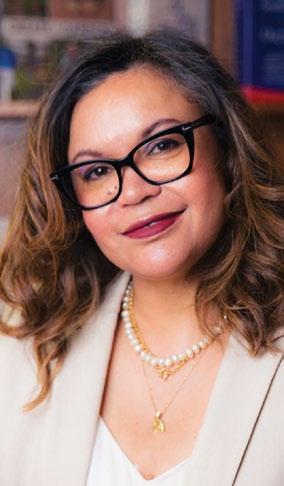
Dr Xena Cupido Director: Fundani CHED
to assist in alleviating hunger and support the disadvantaged communities nationally, a project that was especially important in providing food hampers to vulnerable people during the lockdown.
While in the Faculty of Education between 30% and 65% of subjects showed an increase in the pass rate of students registered for the subjects compared to the pass rate in 2019, no small feat. The faculty is also excited by the introduction of new programmes: Diploma in Early Childhood Care and Education, PGCE in Education in SP and FET Teaching, and Advanced Diploma in Adult and Community Education and Training.
The pandemic catapulted our enactment of ONENESS, bringing into focus human-centricity and the values of unity (ubunye) in diversity (ukungafani). Adopting an approach underpinned by the values and principles of trust, co-thinking, co-learning, co-creating and co-designing, dialogue in a unified manner.
The Faculty of Applied Sciences saw the average subject pass rate for 2020 at 87% for semester 1 subjects completed with a cancellation rate of 5%. At the end of Semester 1 of 2020, there was no subject with a pass rate of less than 50%. The faculty’s staff body went to great lengths to maintain their student’s interest with lecturers such as Professor Sjirk Geerts co-ordinating virtual field trips and Emeritus Lecturer Dr Taj-Ud-Din Sheikh innovating at home teaching contraptions to make access as easy as possible for students, (and this is just to name a few gracious interventions facilitated by our staff).
In the Faculty of Health and Wellness Sciences, the Semester 1 Subject Pass Rates indicated that none of the subjects are found to be at-risk which is a tremendous achievement for the Faculty, where 2 subjects in semester 1 (Block 1) were at-risk in 2019, there is evidence of improvement in academic performance.
The Faculty of Engineering and the Built Environment had much to celebrate with both Drs Faahad Chowdhury and Moses Basitere nominated for the 2020 NRF Research Excellence Award for Early Career/Emerging Researchers, and Prof. Oluwaseun Oyekola awarded the Carnegie Scholarship to support his PGDip in Educational Technology (which he completed in 2020). Prof Oyekola and Dr Lizel Hudson were selected for the Teaching Advancement at University (TAU) fellowship taking place in 2021.
For the Faculty of Informatics and Design who have relatively few semesterised subjects and are mostly in non-HEQSF programmes that are in the process of being phased out, registration was deeply impacted by the pandemic. The Media department saw Film Production’s throughput expected at 75%, while Public Relations had 80% of the overall registered students active and 90% of the students who were actively participating in the subjects and maintaining a successful pass throughout the year. The Information Technology Department which has the BTECH as the only semesterised Programme saw 152 pipeline students of which 104 registered in 2020 and 5 cancelled. 80% of the students who sat for their assessments passed. Visual Communication Design saw an average participation across all levels at 72% with an average pass rate at 70%. Participation in the History and Theory of Design 1 subject varies greatly while Fashion Design Theory, Visual Communication Design Theory, and Visual Communication Design were similarly challenged by the transition to online learning and continue to pay careful attention to supporting students. Town planning participation rate for the first semester across the four years varied from 86% to 100% with the pass rate varying from 66% to 100%.
Recognition is given to the sterling work of support Centres such as the Centre for Innovative Technology, Fundani Centre for Higher Education Development, Work Integrated Learning and the Centre for Personal and Professional Development. The pivot to remote teaching and learning was strengthened by the many initiatives. In response to the exigencies of Covid 19 lockdown, the Student Learning Unit (SLU) implemented a number of interventions to support students transition to remote teaching and learning. The unit developed guidelines to assist students and staff to access our services. This started with a Frequently Asked Questions (FAQs). Information with regards to Academic Literacy and Mathematics consultation access was shared with the broader university community. A SMART Guidelines booklet provided tips for planning, preparation for flexible learning, active participation, engaging lecturers online as well as how to access the Student Learning Unit. Peer support programmes such as tutor, mentor, teaching assistants and retention officers continued during remote learning. The Recognition of Prior Learning (RPL) process, which is an alternative route for access to CPUT and the granting of exemptions, become paperless in 2020. Besides the fact that the RPL is detailed and complex process, until 2019, it was also paper based. Due to COVID-19 and the subsequent lockdown, the paper based process had to be changed to an electronic process. The Extended Curriculum Programme (ECP) unit in partnership with the Department of Nursing developed a hybrid Bachelor of Nursing extended programme. The said programme is the first of its kind at the institution and features a two pronged approach to supporting students through the use of two models, namely: extended and augmenting models. The roll out of the said qualification will be closely monitored for research purposes to establish its effectiveness. The First Year Experience and CPUT 101 successfully pivoted to an online offering, ensuring that first year students continued to be supported throughout remote teaching and learning.
As the COVID-19 Pandemic runs its course, several academic staff development initiatives were established and implemented. These initiatives enabled a multi-modal approach for students and academic staff to continue with remote teaching and learning. This multi-modal approach was guided by the Carousel Model accommodating the various gazetted lockdown levels. The Centre for Innovative Educational Technology (CIET) and the Curriculum development Unit collaborated and have been hugely instrumental
in rethinking course design. CIET offered capacity development workshops included redesigning courses for blended learning, developing e-portfolios, the use of the Respondus lockdown browser and monitor, the use of the grade centre, and developing teaching and learning materials for teaching and learning using low-tech technologies and bandwidth. As at 10 October 2020, institutionally, 96.55% of students were active on Blackboard. Looking at active students per faculty, Applied Sciences had 95.45%; Informatics and Design 96.12%; Education 95.71%; Business and Management Sciences 98.68%, Health and Wellness Sciences 91.97%; and Faculty of Engineering and the Built Environment 96.42%. The Curriculum Development Unit activities were extended to the Curriculum Officer’s forum continued through online platforms and focused on pedagogies and justice (Ubuntu philo-praxis of liberation); Enacting Graduate Attributes (GAs) in curriculum practices with support to academic departments who were in the process of submitting new HEQSF qualifications for accreditation.
In conclusion, it is difficult not to be awed by the staff and student body who held together and strived for excellence not just in their disciplines but in the act of being human and showing support for each other and the communities from which we come. I commend the contributions of staff and students who have achieved so much in these trying times, many of whom are not mentioned by name. You are all seen and celebrated. To those amongst us who have suffered loss during this time, I send heartfelt condolences and applaud your resilience.

Dr Xena Cupido
Director: Fundani CHED
Soos die jaar 2020 tot ’n einde kom, reflekteer die Onderrig-en-Leer Verslag weereens die menige opwindende leer-en-onderrrig inisiatiewe waarvan die grondslag die CPUT Visie 2030 met sy dimensies van Eenheid en Slimheid is. Aan die begin van die akademiese jaar 2020 kon ons nie die impak wat Covid-19 op die lewering van die kurrikulum sou hê voorspel nie. Dit het ’n realiteit geword met die aankondiging deur President Cyril Ramphosa van die sluiting van alle universiteite en skole teen die 18de Maart 2020 om die verspreiding van Covid-19 te beperk. Die skielike sluiting van universiteite het alle areas van Leer en Onderrig, Navorsing, Werkgeïntegreerde Leer en Gemeenskapsdeelname geweldig ontwrig. Dit was ’n reuse toets van ons veerkragtigheid, lenigheid, innoveringsvermoë en tegnologiese skerpsinnigheid.
Daarbenewens het die pandemie ons skielik gebring tot die uitleef van EENHEID, waar mensgesentreerdheid en die waardes van eenheid (ubunye) in diversiteit (ukungafani) in skerp fokus gekom het. Die grondslag van hierdie benadering was die waardes en beginsels van vertroue, saamdink, saamleer, saamvorm en saamontwerp; dialoog op ’n eenvormige wyse. Gedurende hierdie tyd het die SLIMHEIDsdimensie van die visie ook ’n inspirerende fokuspunt geword. As ’n CPUT gemeenskap het ons ’n gemete benadering tot tengnologiese ontwikkelinge en innoverings gevolg sodat die akademiese projek kon voortgaan. Dit wil sê, ons het die materiële toestande van personeel en studente in ag geneem sodat niemand agtergelaat sou word nie. Die SLIM kampusmodel is ’n manier van dink wat ’n holistiese, intelligente kampusomgewing prioritiseer. Kapasiteitsbou en volhoubaarheid sal die middelpunt van hierdie manier van dink vorm; die volhoubare Rondomtaliemodel – ’n metode vir multimodale leer en onderrig – is die perfekte voorbeeld daarvan. Hierdie model is deur die Senaat goedgekekeur en is ook aan die Departement van Hoër Onderwys voorgestel as ’n gebeurlikheidsplan in die lig van grendelvlaksonsekerhede. Ten spyte van tegniese moeilikhede en probleme met internetverbinding wat baie studente se vermoë om vryelik deel te neem aan aanlyn klasse belemmer het, het elke fakulteit uitstaande veerkragtigheid, innovering en deernis ten toon gestel. Dit het gelei tot indrukwekkende resultate.
Die Fakulteit Besigheids- en Bestuurswetenskappe se slaagsyfer regoor Jaar 1 tot Jaar 4 kwalifikasies was tussen 60% en 100%. Die algehele slaagsyfer vir alle vakke in alle kwalifikasies in hierdie fakulteit het die 50% drumpel oortref. Na die uitdagings van die Akademiese Jaar 2020, het die fakulteit ook verskeie befondsingstoekenings aan die begin van 2021 ontvang. Die fakulteit erken trots die volgende toekenings: FASSET: Akademiese Ondersteuning (PIVOTAL) vir 300 studente @ R56 000.00 per student: Totaal R16 800 000.00; FASSET Beurskema met Akademiese Ondersteuning vir 67 studente @ R90 000.00 per student: Totaal R6 030 000.00; en PSETA Toekening vir Werkgeïntegreerde Leer van R5 031 000.00 vir
135 studente. ’n Fantastiese inisiatief in die fakulteit was die saamspanning van die Kaapstad Hotelskool met die SuidAfrikaanse rugbykaptein, Siya Kolisi, se stigting om hongersnood te verlig en om minderbevoorregte gemeenskappe regoor die land te ondersteun. Danksy hierdie projek kon kospakkies aan kwesbare mense gegee word tydens die grendeltydperk.
Daarbenewens het die pandemie ons skielik gebring tot die uitleef van EENHEID, waar mensgesentreerdheid en die waardes van eenheid (ubunye) in diversiteit (ukungafani) in skerp fokus gekom het. Die grondslag van hierdie benadering was die waardes en beginsels van vertroue, saamdink, saamleer, saamvorm en saamontwerp; dialoog op ’n eenvormige wyse.
In die Fakulteit Opvoedkunde het die slaagsyfer van 30% tot 60% van die vakke ’n toename getoon in vergelyking met dié van 2019 – alles behalwe ’n geringe prestasie. Die fakulteit is ook opgewonde deur die bekendstelling van nuwe programme: Diploma in Vroeë Kinderontwikkeling en -onderrig, PGCE in Opvoedkunde in SP en FET Onderrig, en ’n Gevorderde Diploma in Volwasseneen Gemeenskapsonderrig en opleiding.
Die Fakulteit Toegepaste Wetenskappe se gemiddelde slaagsyfer aan die einde van Semester 1 van 2020 was 87% met ’n 5% kansellasiesyfer. Aan die einde van daardie semester was daar ook geen vak met ’n slaagsyfer van minder as 50% nie. Die fakulteit se personeel het groot moeite gedoen om hulle studente se belangstelling te behou met dosente soos Professsor Sjirk Geerts wie virtuele uitstappies gereël het en Emeritusdosent dr. Taj-Ud-Din Sheikh wie se by-die-huis-leertoestelle kennis so toeganklink moontlik gemaak het vir studente. (En hierdie is net ’n paar van die wonderlike ingrypings wat ons personeel gefasiliteer het.)
Die pandemie het ’n massiewe impak gehad op registrasies in die Fakulteit Informatika en Ontwerp, wie relatief min semestervakke en meestal nie-HEQSF programme het (laasgenoemde is besig om uitgefaseer te word. Die Media departement se Filmproduksie se deursetkoers sou 75% te haal terwyl Openbare Betrekkinge 80% gehaal het van geregistreerde studente en 90% van die studente wie aktief deelgeneem het in vakke en ’n slaagpunt sou behou tot die einde van
die jaar. Die Inligtingstegnologie departement se enigste semesterprogram – die BTECH – het 152 pyplynstudente gehad waarvan 104 geregistreer het in 2020 en 5 gekanselleer het. 80% van die studente wie geassesseer is het geslaag. Visuele Kommunikasie Ontwerp se gemiddelde deelname oor alle vlakke was 72% met ’n gemiddelde slaagsyfer van 70%. Deelname in die vak Geskiedenis en Teorie van Ontwerp 1 wissel baie. Die vakke Modeontwerp, Visuele Kommunikasie Ontwerp Teorie en Visuele Kommunikasie Ontwerp is soortgelyk uitgedaag deur die skuif na aanlyn leer; hulle hou dus aan om nou te let op die ondersteuning van studente. Die deelname in die eerste semester van Stadsbeplanning was 86% tot 100% terwyl die slaagsyfer tussen 66% en 100% was.
In die Fakulteit Gesondheidswetenskappe het die Semester 1 slaagsyfer vir vakke aangedui dat nie een van die vakke hoë-risiko vakke was nie. Dis ’n fenomenale prestasie en bewys van vordering vir hierdie fakulteit aangesien twee vakke in 2019 hoë-risiko vakke was.
Die Fakulteit Ingenieurswese en die Bou-omgewing het baie gehad om te vier met beide drs. Faahad Chowdhury en Moses Basitere wie vir die 2020 NRF Navorsingsuitmuntendheidstoekenning vir Vroeë Loopbaan/Ontlykende Navorsers benoem is. Professor Oluwaseun Oyekola en dr. Lizel Hudson is gekies vir die Leerbevordering aan Universiteit genootskap van 2021. Professor
Oyekla is ook die Carnegie Beurs toegeken as ondersteuning vir die PGDip in Opvoedingstegnologie wat hy in 2020 voltooi het.
Herkenning word hiermee gegee aan die uitstaande werk van ondersteuningssentrums soos die Sentrum vir Innoverende Onderrigtegnologie, die Fundani Sentrum vir Hoëronderwysontwikkeling, die sentrum vir Werkgeïntegreerde Leer en die Sentrum vir Persoonlike en Professionele Ontwikkeling. Die skuif na afstandsleer is versterk deur hulle vele inisiatiewe. Na aanleiding van die Covid-19 grendeltydperkvereistes het die Studenteleereenheid ’n aantal intervensies geïmplementeer om studente te help om die skuif te maak. Die eenheid het riglyne ontwikkel om die studente en personeellede te help om beskikbare dienste te gebruik. Dit het begin met ’n Algemene Vrae afdeling. Inligting met betrekking tot Akademiese Geletterdheid en Wiskunde konsultasies is gedeel met die wyer universiteitsgemeenskap. ’n SLIM gids het wenke bevat vir beplanning, voorbereiding vir buigbare leer, aktiewe deelname, skakeling met dosente in ’n aanlynomgewing sowel as aanlyntoegang tot die Studenteleereenheid. Portuurondersteuningsprogramme soos tutors, mentors en onderrigassisstente, en retensiebeamptes het voortgegaan gedurende afstandsleer. Die Herkenning-van-Vorige-Leerproses, wat ’n alternatiewe roete vir toegang tot CPUT bied, en die toekenning van vrystellings het ten volle aanlyn oftewel ’n papierlose proses geword. Behalwe die feit dat die Herkenningvan-Vorige-Leerproses ’n noukeurige en komplekse proses is, was dit tot en met 2019 gebaseer op harde kopieë van dokumente. Weens Covid-19 en die gevolglike grendeltydperk moes hierdie proses elektronies gemaak word. Die Verlengde Kurrikulumprogrameenheid in vennootskap met die Departement van Verpleegkunde het ’n hibriede verlengde program vir die Baccalaureus Verpleegkunde ontwikkel. Dis die eerste program van sy soort aan CPUT en neem ’n tweeledige benadering tot die ondersteuning van studente, naamlik die verlengings- en versterkingsmodelle. Die implementering van hierdie kwalifikasie sal noukeurig waargeneem word vir navorsingsdoeleindes en om die effektiwiteit daarvan vas te stel. Die Eerstejaarservaring en CPUT 101 het beide ’n suksesvolle skuif gemaak na ’n aanlynaanbieding wat seker maak dat eerstejaarstudente gedurigdeur ondersteun word.
Soos die Covid-19 pandemie sy gang gegaan het, is menigte akademiese personeelinisiatiewe daargestel en geïmplementeer. Hierdie inisiatiewe
het ’n multimodale benadering tot afstandsleer vir studente en personeel moontlik gemaak. Hierdie benadering was met behulp van die Rondomtaliemodel aangepak omdat dit ’n gebeurlikheidsplan vir al die grendelvlakke bevat het. Die Sentrum vir Innoverende Onderrigtegnologie (CIET) en die Kurrikulumontwikkelingseenheid het saamgewerk en was hoogs instrumenteel in die heroorweging van kursusontwerp. CIET het kapasiteitsontwikkelingswerkswinkels aangebied wat die volgende ingesluit het: die herontwerp van kursusse vir gemengde leer, die ontwikkeling van portefeuljes, die gebruik van die Respondus grendel webblaaier en monitor, die gebruik van die ‘grade centre’, en die ontwikkeling van onderrig-en-leer materiale wat eenvoudige tegnologie en minimum netwerk bandwydte gebruik. Op 10 Oktober 2020, was 96.55% van CPUT se studente aktief op Blackboard. In terme van aktiewe studente per fakulteit was die Fakulteit Toegepaste Wetenskappe se persentasie aktiewe studente 95.45%, die Fakulteit Informatika en Ontwerp s’n was 96.12%, die Fakulteit Opvoedkunde s’n was 95.71%, die Fakulteit Besigheids- en Bestuurswetenskappe s’n was 98.68%, die Fakulteit Gesondheidswetenskappe s’n was 91.97%, en die Fakulteit Ingenieurswese en die Bou-omgewing was 96.42%. Die Kurrikulumontwikkelingseenheid se aktiwiteite het die Kurrikulumbeamptesforum ingesluit wat aanlyn plaasgevind het en gefokus het op pedagogieë van geregtigheid (Ubuntu philo-praxis of liberation) en die uitleef van graduandi-eienskappe in kurrikulumsgebruike met ondersteuning aan departemente wie in die proses is om kwalifikasies in lyn te bring met die Hoër Onderwys Kwalifikasie Sub-raamwerk.
Ten slotte, dit is moeilik om nie verbaas te staan oor die personeel en studenteliggaam wie saamgestaan het en gestreef het na uitmuntendheid, nie net in hulle afsonderlike vakgebiede nie, maar ook in hulle menswees – hulle ondersteuning van mekaar en die gemeenskappe vanwaar hulle kom. Ek prys die bydrae van elke personeellid en student wie so baie bereik het in sulke moeilike tye. Baie van julle word nie op die naam genoem nie, maar almal van julle word gesien en gevier. Aan die van ons wie verlies gely het in hierdie tyd, bied ek my innige medelye en lof vir julle veerkragtigheid.
Njengoko simvala unyaka u-2020, INgxelo yokuFundisa nokuFunda, ibonisa kwakhona amaphulo amaninzi okufunda nokufundisa, axhaswa nguMbono weCPUT ka-2030 neenkalo ezigxile kubunye nobukrelekrele ezaziwa “njenge-Oneness and Smartness”. Ekuqaleni konyaka wokufunda u-2020, besingalilindelanga ifuthe eliziswa yi-Covid-19 ekufundisweni kwekharityhulam. Oku kwaye kwacaca kwisibhengezo siMongameli Cyril Ramaphosa, esalandelwa kukuvalwa kwazo zonke iiyunivesithi nezikolo phambi komhla we-18 Matshi 2020 ukuze kuthintwelwe ukunwenwa kweCovid-19. Ukuvalwa ngokungalindelekanga kweeyunivesithi kwaphazamisa lukhulu zonke iinkalo zokuFundisa nokuFunda, uPhandolwazi, ukuFunda okuHlanganisa uMsebenzi, nokuziBandakanya noLuntu ngokugrogrisa kakhulu ukomelela, ukukhawuleza, ukuqiqa, nobuchule bobuchwepheshe bethu.
Ngokongezelekileyo, lo bhubhane usikhuthaze ukuba sithathele phezulu size simisele UBUNYE, ngokugxila ngakumbi eluntwini nokuxabisa ubunye kwiyantlukwano. Sisebenzise inkqubo emiselwe kwimimiselo nemigaqo yokuthembana, ukucingisana, ukufunda, ukwenza nokuyila sisonke. Kweli xesha, inkalo yobuchwepheshe yombono iye yagqama. Njengoluntu lwaseCPUT siye sacaphula ngocoselelo kuphuhliso lwetoknoloji nobuchwepheshe ukuze siqinisekise ukuba inkqubo yokufunda iyaqhubeka, sithathela ingqalelo imathiriyeli abafikelela kuyo abasebenzi nabafundi ukuze siqinisekise ukuba ‘akukho namnye oyakusalela ngaphandle’. Imodeli yekhampasi ekrelekrele ‘SMART’ yinkqubo exabise ngokugqibeleleyo ikhampasi ekrelekrele. Ukuxhotyiswa ngezakhono nokugcina uzinzo kuzakubasembindini wale nkqubo, kwaye ukusetyenziswa kweCarousel Model, imethodi yokumisela ukufundisa nokufunda ngeendlela ezininzi ngowona mzekelo uophuma phambili woku. Le modeli yamkelwa yiSenethi yaze yadluliselwa kwiSebe leMfundo ePhakamileyo njengesisombululo sexeshana xa kwakuthingathingazwa kumiswe ngxi yonke into. Nangona kunjalo asiwalibali amagingxiginxi oqhagamshelwano awayephazamisa uninzi lwabafundi lungabinako ukuthatha inxaxheba ngokukhululekileyo kwiiklasi ezifumaneka kwi-intanethi, ifakhalthi zizonke zabonakalisa ukomelela, zaze zaqalisa ukwenza izinto ngobutsha nokunyamezela. Kuko konke oku kwaphuma iziphumo ezincomekayo.
Umzekelo, iziphumo zeFakhalthi yoShishino neNzululwazi yokuPhatha kwizifundo zonke ukuqala kunyaka woku-1 ukuya kowe-4 zaziphakathi kuka-60% no-100%, inqanaba lokupasa kwizifundo zonke ligithile kumyinge we-50%. Emva kwemiceli-mngeni yonyaka wokufunda u-2020, le fakhalthi yafumana amawonga ezimali aliqela ekuqaleni kuka-2021. Le fakhalthi ibulela i-FASSET: Inkqubo exhasa izifundo (PIVOTAL) abafundi abangama-300 bafumana eli wonga, umfundi ngamnye efumana

Director: Fundani CHED
i-R56 000.00. Iyonke le mali yiR16 800 000.00. I-FASSET Bursary Scheme exhasa abafundi abangama-67, umfundi ngamnye efumana i-R90 000.00. Iyonke le mali iphuma ku-R6 030 000.00. Okokugqibela iwonga le U-PSETA leMfundo eHlanganisa uMsebenzi leR5 031 000.00, lona lixhase abafundi aba-135. Kwakulefakhalthi, isikolo sehotele i-Cape Town Hotel School sazibandakanya nokapteni weSouth African Rugby uSiya Kolisi kwilinge lokuphelisa indlala nokuxhasa uluntu oluhlelelekileyo kuzwelonke, le nkqubo yayibaluleke kakhulu ekuboneleleni uluntu oluhlelelekileyo ngepasilana zokutya ngexesha lokumiswa ngxi.
Ngokongezelekileyo, lo bhubhane usikhuthaze ukuba sithathele phezulu size simisele UBUNYE, ngokugxila ngakumbi eluntwini nokuxabisa ubunye kwiyantlukwano. Sisebenzise inkqubo emiselwe kwimimiselo nemigaqo yokuthembana, ukucingisana, ukufunda, ukwenza nokuyila sisonke. Kweli xesha, inkalo yobuchwepheshe yombono iye yagqama.
Ngelixa, kwiFakhalthi yezeMfundo ziphakathi ko-30% no-65% izifundo ezibonakalisa ukuphucuka kwizinga lokupasa lwabafundi xa kuthelekiswa nonyaka u-2019. Ifakhalthi iphinda ibiyozela iinkqubo zezifundo ezintsha: idiploma yokhathalelo lwabantwana abasaqalayo (Diploma in Early Childhood Care and Education), i-PGCE kwezemfundo kwinqanaba eliphezulu (SP) nenqananaba lemfundo eyongezelelweyo (FET), nediploma ephambili kwizifundo zabadala (Advanced Diploma in Adult and Community Education and Training).
KwiFakhalthi yeNzululwazi yokuSetyenziswa izinga lokuphumelela limalunga mo87% kwisimesta yokuqala ka-2020, ekugqityweni kwezifundo kuqikelelwa ku-5% abo bathe bashiya izifundo phakathi. Ekupheleni kwesimesta yoku-1 ku-2020 kwizifundo zonke inqanaba labaphumelelayo belingekho elingaphantsi ko-50%.
Iqumrhu labasebenzi befakhalthi lisebenze ngokugqithisileyo ukwenza abafundi bahlale benomdla, umzekelo abahlohli abanjengo Njingalwazi Sjirk Geerts besenza uhambo olubonwa kwikhompyutha, uGqirha Taj-Ud-Din Sheikh bequlunqa izixhobo zokufundisa endlwini, esenzela ukuba abafundi bakhe bafunde lula, (la ngamaphulo ambalwa kulawo maninzi equlunqwe ngabasebenzi beli ziko).
IFakhalthi yobuChwepheshe noYilo inezifundo ezimbalwa ezilungiselelwe
isimesta, eziphantsi kweenkqubo zenon-HEQSF ekulungiselelwa ukuba ziyekwe ukufundiswa. Ubhaliso lwezi zifundo luchatshazelwe kakhulu njengokuba iPublic Relations bina-80% yabafundi bebesebenza kubo bonke abo bebebhalisele lo unyaka ze babeyi-90% abafundi bebesebenza kwizifundo kwaye behleli bephumelela unyaka wonke. ISebe le-Information Technology ibililo lodwa icandelo elinabafundi beB-Tech eyenziwa ngokwesimesta belinabafundi aba152 elibalindeleyo kodwa ibe yi-104 ebhalisele unyaka u-2020, ze abahlanu bashiya phakathi. Abafundi abayi-80% kwabo bebehlalele iimviwo baphumelele.
I-Visual Communication Design binabafundi abathatha inxaxheba kuwo onke amanqanaba ne-72%, nezinga lokuphumelela elingu-70%. Ukuthathwa kwenxaxheba kwi-History and Theory of Design 1 yahluke kakhulu ngelixa i-Fashion Design Theory, Visual Communication Design Theory, kunye neVisual Communication Design nazo bezinemiceli-mngeni ngenxa yokufunda kwi-intanethi kuze kuphinde kufuneke baqwalasele ekuxhaseni abafundi. Umsebenzi kwizifundo ze-Town planning kwisimesta yokuqala, kumanqanaba omane wohluke ku-86% ukuya ku-100%, ze inqanaba lokuphumelela libe phakathi ko-66% no-100%.
IFakhalthi yezeMpilo neMpilontle kwisimesta yokuqala ifumanise ukuba kwizifundo zonke zayo akukho nesinye esisemngciphekweni. Nto leyo iyimpumelelo egqithisileyo kule fakhalthi kuba izifundo ezimbini kwisimesta yokuqala (Block 1) bezisemngciphekweni ngo-2019.
kwiFakhalthi yobuNjineli nokuNgqongileyo okwakhiwayo bekubhiyozelwa ooGqirha uFaahad Chowdhury noMoses Basitere abagqatswa bewonga leNRF Research Excellence Award for Early Career/Emerging Researchers. UNjing. Oluwaseun Oyekola yena uqongwe ngeCarnegie Scholarship yokumxhasa kwizifundo PGDip in Educational Technology (ayigqibe ngo-2020). UNjing. Oyekola noGqir. Lizel Hudson bachongwe kwiNkqubo yokuPhuculwa kokuFundisa kwiiYunivesithi (TAU) fellowship kunyaka u-2021.
Umbulelo omkhulu kumaziko enkxaso njenge-Centre for Innovative Technology, i-Fundani Centre for Higher Education Development, i-Work Integrated Learning ne-Centre for Personal and Professional Development. Utshintsho kukufundisa kwi-intanethi komelezwe yimizamo emininzi. Ukukhawulelana neemfuno zokumiswa ngxi ngenxa yeCovid-19, iYunithi yokuFunda kwaBafundi (SLU) izibandakanye kumaphulo amaninzi ukuze ixhase abafundi ekutshintsheleni kwimfundo eyenziwa kwi-intanethi. Le yunithi yayila izikhokelo zokunceda abafundi nabasebenzi bafumane iinkonzo zaseyunivesithi. Eli linge laqala ngokusebenzisa imibuzo ebuzwa rhoqo (FAQs). Iinkcukacha malunga nothethathethwano lwe-Academic Literacy neziBalo lwapapashwa kwiyunivesithi jikelele. Incwadana yesikhokelo ibibonelela ngeengcebiso malunga nokucwangcisa, ukulungiselela ukufunda okungekho ngqongqo, ukuthatha inxaxheba, ukufumana abahlohli kunye nokunxibelelana ne-Student Learning Unit. Iinkqubo ezixhasa abalingani njengetutor, imento, abancedisi bokufunda namagosa enkxaso ziqhubeke ngokusetyenziswa kwei-intanethi. Inkqubo ye-Recognition of Prior Learning (RPL) engenye indlela yokungena eCPUT ngokushenxela imithetho ethile kwabo bafanelekileyo iye itshintsehle iinkqubo zayo ukuba zenziwe ngekhompyutha. I-RPL ineenkcukacha ezibhidayo, kuze kube ngu-2019 ibisebenzisa iinkqubo zephepha kuphela. Ngenxa yeCovid-19 nokumiswa ngxi, kuye kwanyanzeleka ukuba le nkqubo itshintshwe yenziwe ngokusebenzisa ikhompyutha. Iyunithi yeNkqubo eYongezelelekileyo yeKharityhulam (Extended Curriculum Programme) isebenzisana neSebe loBongikazi iqulunqe uhlobo oluxubileyo lokufundisa. Le nkqubo ayifani nezinye kweli ziko, kwaye iquka iindidi ezimbini zokuxhasa abafundi ngokusebenzisa iimodeli ezimbini zenkqubo eyongezelelweyo. Inkqubo yolu hlobo lokufunda izakuqwalaselwa ze iphinde ibeyinxenye yophandolwazi ukuze kufundwe ukusebenza kwayo. INkqubo yaBafundi boNyaka wokuqala neCPUT 101 itshintshiwe nayo ukuze ifumaneke kwinkqubo zekhompyutha. Oku kuqinisekisa ukuba abafundi bonyaka wokuqala bahlala befumana inkxaso.
Njengokuba sijongene nobhubhane iCovid-19, maninzi amaphulo ayilwe ukuze aphuhlise imfundo yabasebenzi. La maphulo enze lula inkqubo yokufunda ngeendlela ezininzi ukuze abafundi nabasebenzi bezemfundo baqhubeke nokufunda nokufundisa ngokusetyenziswa kwe-intanethi. Le nkqubo yokufunda ngendlela ngeendlela ikhokelwe yi-Carousel Model elungiselela amanqanaba ohlukileyo okumiswa ngxi njengokumiselweyo.
Iziko lobuGcisa beTeknoloji yezeMfundo i-CIET, neYunithi yokuPhucula iKharityhulam zisebenzisene kwaye zibenegalelo elikhulu kakhulu ekucingeni ngokutsha uyilo lweekhosi. I-CIET isingathe iinkqubo zokuphucula izakhono, ezi beziquka ukuyila ngokutsha izifundo ezimalunga nokudityaniswa kweentlobo zokufunda, ukwenza ie-prtfolio, ukusetyenziswa kweRespondus isixhobo sokukhangela, ukusetyenziswa kweziko lwamabakala, nokuphucula iimathiriyeli zokufunda nokufundisa kusetyenziswa izixhobo zeknoloji ezilula kunye nebandwidth. Ukusukela nge-10 Okthobha 2020, babesele beyi-96.55% abafundi kwiziko lonke abasebenzisa uBlackboard. Abafundi ngefakhalthi nganye: iFakhalthi yeNzululwazi yokuSetyenziswa 95.45%; eyobuChwepheshe noYilo 96.12%; yezeMfundo 95.71%; eyezoShishino neNzululwazi yokuLawula 98.68%, eyezeMpilo nezeMpilontle 91.97%; iFakhalthi yobuNjineli nokuNgqongileyo okwakhiwayo 96.42%. Iyunithi yokuPhuhliswa kweKharityhulam bisebenzisana ngokudibeneyo neforam yamaGosa eKharityhulam apho baqhubeke bedikida iindlela zokufundisa nobulungisa (Ubuntu philo-praxis of liberation); Ukumiselwa kweeMpawu zeziThwalandwe (GAs) kwikharityhulam nenkxaso kumasebe emfundo ebelungiselela ukufaka izifundo ezintsha zeHEQSF ukuba ziqinisekiswe.
Ukuqukumbela, kunzima ukungamangaliswa ngabasebenzi kunye nabafundi abaxhathisileyo bezama ukuphumelela, bengaphumeleli kwizifundo kuphela bephumelela nasekuphileni, bexhasana bebonke kunye naseluntwini apho siphuma khona. Ndiyabulela ngegalelo labasebenzi nabafundi abazuze lukhulu kweli xesha linzima, nangona bengabalulwa ngamagama. Nonke niyabonwa kwaye siyabinibhiyozela. Kubo bonke abo kuthi balahlekelweyo ngeli xesha, ndidlulisa umyalezo wovelwano kwaye ndincoma ukomelela kwenu.
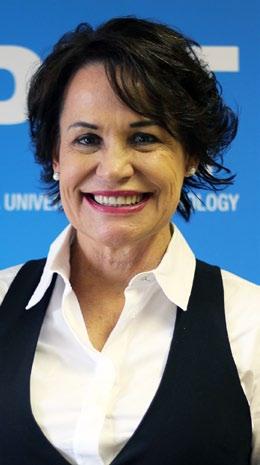
Prof Driekie Hay-Swemmer
Executive Director: Office of the Vice-Chancellor
Focus Area 2 of CPUT’s V2030 focuses on “Smart teaching and learning and smart learning environments”. This is indeed a mouthful, and some would be tempted to say that it is an ambitious dream. However, we have unquestionably come a long way. Most certainly the outbreak of COVID 19 forced CPUT’s academics to take a quantum leap – not only in faith but indeed in terms of mind shifts and their appetite to learn new skills and to unlearn what was no longer appropriate. New skills? Yes, our academics had to acquaint themselves to function efficiently in an online teaching world, follow a multimodal approach, open themselves to virtual pedagogies and embrace a new higher education landscape.
V2030 makes it clear that CPUT wants to be the leading university of technology in Africa and globally, also when it comes to teaching and learning. We want indeed to be on the forefront of smart learning environments that will provide excellent and relevant content and learning experiences for all our students.
We realise that what we teach at CPUT will have to be shaped and reshaped to keep up to date with the growing demands of the 21st century. Being able to study wherever and whenever a student prefers, CPUT promises to be an exciting and attractive university for our students. We also envisage that more incoming students will be comfortable using high-tech software and technology.
As outlined in V2030, a smart university uses adaptive learning programmes and learning portfolios for students, optimises collaborative technologies and digital learning resources to teach on, and makes use of highly computerised administration with reliable learner analytics. Smart universities furthermore provide online learning resources for academics and students to ensure that students study at their own pace, place and space and also cater for the needs of different students and the aspirations of lifelong learners. It is furthermore our inspiration to ensure that no student or staff member will feel lost in this ever evolving technological environment, and that we will bridge the digital divide through our research, teaching and community engagement.
Will teaching and learning at CPUT look different by 2030? Most certainly – immersive learning experiences will no longer be a marginal practice, but will undeniably become imperative. CPUT is acutely aware that the intensity that comes with a physical or virtual learning environment rouses and accelerates learning
in a way that traditional learning methods are increasingly unable to meet. We are not saying that face to face education will disappear, but rather that more exciting hybrid models and opportunities will follow.
It could well be that as V2030 is implemented, CPUT students will be able to pick and choose how many online courses and how many on-campus courses they will take a semester, combining both modalities. It could also be possible that CPUT students may spend their first year studying on campus, then transfer abroad for one or more semesters at a partner university (either face to face or online) and then finish their degrees online. This brings me to the issue of internationalisation.
Internationalisation will always be an important feature of quality higher education, now and certainly by 2030. However, universities will have to adjust their definition(s) of internationalisation. Quality higher education and learning are dependent on broad and rich intellectual exposure. In this regard, internationalisation can be brought into CPUT’s lecture venues via technology, the streaming of guest lectures, the lectures of visiting or extraordinary professors, postgraduate supervision can happen from abroad, and students will have access to excellent webinars. The higher education classroom of the future will be almost everywhere: on campus, off campus and at home. Gone will be the days when students will need to fit within strict time schedules and inflexible academic boundaries. In the context of CPUT, it could mean that our students will spend far less time traveling to campuses, implying more time to study.
Subsequently, the idea of a lecturer standing in front of a lecture venue filled with students who listen and respond to direction, will soon be a thing of the past. CPUT’s future lecture venues will coexist as physical and online spaces, flipping the current learning model upside down so that students can learn at home and spend class time collaborating and applying their knowledge to reallife issues. While some argue that technology in lecture venues creates lazy, disconnected students, technology is indeed endlessly extending boundaries of where learning can occur, with whom and why. Future CPUT classrooms will thus focus on a combination of student engagement in learning, enquirybased approaches, curiosity, imagination and design thinking. The formal classroom will be replaced by learning areas that will allow
individuals, small groups or larger groups to collaborate face-to-face or virtually on learning projects.

Figure 1 illustrates the paradigm shift from traditional education to SMART Education (Self-directed, Motivated, Adaptive, Resource-enriched, Technologyembedded). Fortunately, CPUT had already integrated many of these features in its multimodal approach since the start of COVID-19 and even before that.
During the next ten years, we will go beyond minimal online presence and will also address sounds and images together with all other types of multimedia as they emerge in the educational space. What is foreseen is that lecturers and students will be equally important in learning spaces and that students will
play an important role in co-creating the curriculum. A resource-enriched (virtual) learning environment will be in place in the form of content cloud where lecturers and students will freely and safely upload and download open educational resources and content together. In a nutshell, by 2030 CPUT will have made a complete paradigm shift from traditional education to SMART Education.
Apart from not only embracing but also contributing towards creating a digital pedagogy, by 2030 CPUT will also have smart(er) learning modalities that at best will be technology-supported learning environments that make adaptations and provide appropriate support to learners (e.g., guidance, feedback, hints or tools) in the right places and at the right time. These will be based on individual learners’ needs, which might be determined by analysing their learning behaviours and performance, and the online and real-world contexts in which they will be functioning.
By 2030, CPUT will appreciate and understand the value of gamification and learning simulation. Through technological innovations, it will be possible to create smart virtual work integrated learning for all our students. We will be able to offer instant and adaptive support by immediate analysis of the needs of individual learners from different perspectives. Our learning environment will be able to adapt user interfaces (i.e., the ways of presenting information) and subject content to meet personal factors (e.g. learning styles and preferences) and learning status (e.g. learning performance) of individual CPUT students. If we achieve all of that at CPUT, we will indeed be the MIT of Africa!
However, smart teaching, learning and learning environments cannot and should not be separated from the notion of being a “smart campus.” Some authors refer to smart campuses as “intelligent campuses” (i-campuses). They argue that a new paradigm of thinking pertaining to a holistic intelligent campus environment is required. This will encompass at least, but not limited to, several themes of campus intelligence, such as holistic e-learning, social networking and communication for work collaboration, green and ICT sustainability with intelligent sensor management systems, protective and preventative health care, smart building management with automated security control and surveillance, and visible campus governance and reporting. That is why Focus Area 1 of V2030 focuses on an enabling CTS environment and a highly able
CTS workforce. Those two elements go together and will form the basis for the successful achievement of V2030.
It is greatly important to reflect briefly on the smart lecturers that CPUT will have employed by 2030. By then we will have executed our strategy to involve people, facilities, and ongoing academic staff development support in the effective use of technology. We will also have deployed smart lecturers and given them all the necessary smart tools and support while assessing their online pedagogical effectiveness by the use of smart e-evaluation forms. The elements of smart lecture venues will include, but will not be restricted to, hardware, smart devices or equipment, software systems, applications, smart technologies, various activities related to smart learning and teaching or Smart Pedagogy, and systems for learning, teaching, and performing academic analytics.
What will our lecture venues look like by then? Certainly we will integrate voicerecognition, computer vision, and other technologies, collectively referred to as intelligent agents, to provide a tele-education experience similar to a traditional classroom experience. V2030 will indeed be based on the idea that our smart lecture venues will implement and demonstrate maturity at various smartness levels such as adaptation, sensing, inferring (logical reasoning), self-learning, anticipation, and self-organization/re-structuring.

Layout of lecture venues will change significantly
In conclusion, there is no doubt that by the year 2030 teaching and learning at CPUT will look different: content will be future looking, lecturers will be confident to navigate through the latest education technological advancements, students will be assessed differently and our campuses will look different. This is our future, this is what we are excited about: to change lives and create features through our innovative, trendsetting and transformative teaching and learning approaches!
Throughput rates reflect the efficiency of teaching and learning at an educational institution. Efficiency is measured per cohort of students admitted to the University in a specific year. The statistics below reflect the throughput rate in 2016 and 2017 at CPUT. The numbers reflect the students who managed to complete their qualifications in minimum time, indicated as “Graduates in Min time”. However, not all students manage to complete within the prescribed time period and some take an extra year “Graduates in Min + 1” or an additional two years “Graduates in min + 2”. In this Teaching and Learning report, covering 2020, the throughput rate of 2016 and 2017 is included.
CPUT is started a few years ago to phasing in the Higher Education Qualification sub-Framework (HEQsF) as stipulated on the 10 level National Qualifications Framework (NQF). As is indicated below, 2017 saw an increase in student numbers in the newly introduced qualifications.
A) All qualifications: The overall throughput rate for all students in the 2016 and 2017 cohorts is as follows:
B) National Diploma: The National Diploma is a three-year qualification if completed fulltime in minimum time. In the table below 1245 students took an extra year to complete the ND and an additional 270 needed an extra two years to complete:
E) Baccaluareus technologiae degree: The BTech is a one year programme if done full time.
F) Bachelor degree (480 – NQF 8) is a full-time programme over four years.
The purpose of this report is to outline the 2020 development and approval of new qualifications in relation to the Higher Education Qualifications Sub-Framework (HEQSF). The Qualifications Evaluation Committee (QEC) has played a critical role in the development of new NQF Level 8 qualifications, i.e Postgraduate Diplomas and Bachelor Honours degree as well as some Master’s degree and Doctoral degree for articulation purposes. The QEC is a sub-committee of the Senate Academic Planning Committee an internal structure for evaluating new programme applications before they are submitted to the Academic Planning Committee and Senate for final approval.
H) Diploma (360 credits) is a three-year full time programme. The student numbers are increasing, because these Diplomas are Higher Education Qualification Sub-framework (HEQSF) aligned qualifications replacing the National Diploma.
In total, the university approved 62 new HEQSF-aligned qualifications and were sent externally for Programme Qualification Mix (PQM) approval by DHET, accreditation by the CHE and registration by SAQA. All the listed qualifications have been granted a PQM clearance by DHET. In order to recruit and enroll new students, the new HEQSF-aligned qualifications would have to be fully accredited by the CHE and registered by SAQA. The tables below outline the status of the qualifications as developed thus far per Faculty. all the programmes which are to be phased out per faculty as follows:
• qualifications that are fully accredited and registered, Table A; • qualifications that are accredited, but pending SAQA registration, Table B.
29 out of 62 qualifications are pending SAQA registration (Table B) whereas 13 qualifications are fully accredited and registered (Table A). The other 20 qualifications are still at different stages of accreditation processes at the CHE.
Table A: CHE accredited and SAQA registered qualifications
FACULTY QUALIFICATION NAME
Applied Sciences Bachelor of Food Science and Technology
Postgraduate Diploma in Marine Science
Postgraduate Diploma in Consumer Science in Food and Nutrition
Master of Marine Sciences
FACULTY QUALIFICATION NAME
Business & Management Sciences
Advanced Diploma in Accountancy
Advanced Diploma in Internal Auditing
Advanced Diploma in Sport and Leisure Management
Postgraduate Diploma in Human Resource Management
Postgraduate Diploma in Marketing
Postgraduate Diploma in Business Process Management
Postgraduate Diploma in Entrepreneurship Management
Postgraduate Diploma in Retail Business Management
Engineering & the Built Environment
Master of Engineering in Engineering Management
Table B: CHE accredited qualifications but pending SAQA registration
FACULTY QUALIFICATION NAME
Applied Sciences
Advanced Diploma in Landscape Architecture
Master of Environmental Management
Postgraduate Diploma in Environmental Management
Postgraduate Diploma in Horticulture
Postgraduate Diploma in Agriculture
Doctor of Conservation Science
Business & Management Sciences
Postgraduate Diploma in Business Administration
Postgraduate Diploma in Applied Taxation
Postgraduate Diploma in Business and Information Administration
Postgraduate Diploma in Internal Auditing
Postgraduate Diploma in Management Accounting
Postgraduate Diploma in Public Administration
FACULTY QUALIFICATION NAME
Business & Management Sciences
Postgraduate Diploma in Supply Chain Management Diploma in Banking
Postgraduate Diploma in Project Management
Postgraduate Diploma in Sport and Leisure Management
Engineering & the Built Environment
Bachelor of Engineering Technology Honours in Electrical Engineering
Postgraduate Diploma in Clothing and Textile Technology
Postgraduate Diploma in Engineering Management
Bachelor of Engineering Technology Honours in Civil Engineering
Education Advanced Diploma in Adult and Community Education and Training Teaching
Health & Wellness Sciences
Postgraduate Diploma in Health Services Management
Postgraduate Diploma in Occupational Health Nursing
Postgraduate Diploma in Primary Care Nursing
Diploma in Dental Technology
Informatics & Design
Postgraduate Diploma in Information and Communication Technology
Postgraduate Diploma in Media Leadership and Innovation
Postgraduate Diploma in Design
2.1 Faculty of Applied Sciences
2.2 Faculty of Business and Management Sciences (FMBS)
2.3 Faculty of Education
2.4 Faculty of Engineering and Built Environment (F EBE)
2.5 Faculty of Health and Wellness Sciences (FHWS)
2.6 Faculty of Informatics and Design (FID)



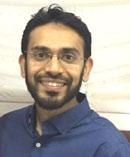
Curriculum and Academic Coordinator (Acting)
What started off as any ordinary academic year turned out to be one in which the Faculty of Applied Science’s strength, resilience and capacity for adaptability was put to the test. The academic year 2020 proved to be the measure of the faculty’s, and institution’s realisation of CPUT’s outgoing Vision 2020, rooted in the spirit of Ubuntu and Innovation, and presented an appropriate segue to realising the new Vision 2030, with Oneness and Smartness at its heart.
The highlights in the Teaching and Learning landscape of the Faculty of Applied Sciences over the 2020 academic year perfectly meld Innovation, Ubuntu, Oneness and Smartness, and, when approached from a student-centric perspective, is firmly rooted in an ethics of care and empathy. This is what the faculty is most proud of.
Here, among many others, are some of the highlights in this report, covering a range of practices undertaken during the 2020 academic year:
Before lockdown
- The year kicks off with the scheduled field trips.
- The Student Agricultural Society at CPUT recognises the efforts and dedication of their lecturer.
- Biotechnology students attend the Biosafety Symposium in March 2020.
The pandemic reaches our shores
- Preparing for remote teaching and learning.
- Remote practicals.
- Learning goes on: Mathematics lecturer builds a recording setup at home.
- Virtual field trip for Nature Conservation students .
- Journals and reflection blogs.
- Responding to needs of remote learning: Anti-Plagiarism Workshop.
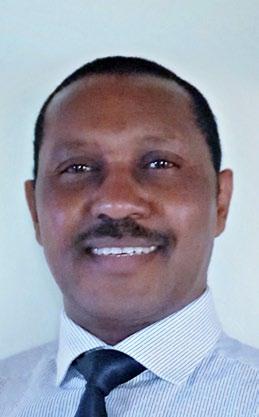
Prof Joseph Kioko Dean of the Faculty
A cautious return to campus
- Agriculture students make their own wine
- Back to campus for practicals…and a new normal.
- Consumer Science students benefit from a Service Learning Project.
The year kicks off with the scheduled field trips
Before any lockdown, departments were hard at work organising field trips for students. These serve a central function in the curriculum, as they expose students to the industry in which they are preparing to work.
Students of Environmental Management, for example, undertook a site visit to the Eskom Pump Storage Facility just outside Cape Town. This was part of the subject Environmental Geohydrology 3, and the study of hydroelectric plants. Students were expected to observe the application of the theoretical knowledge

The Student Agricultural Society at CPUT recognises the efforts and dedication of their lecturer
Ms Nonkululeko Mfeka, lecturer and First Year Experience Coordinator in the Department of Agriculture was voted Best Lecturer for 2020 by the Agricultural Society of CPUT, a student society by and for students of agriculture. She has since persevered through the many challenges presented during the pandemic, constantly adapting her practice to make sure that no student is left behind. Such recognition boosted her confidence in her work, knowing that students acknowledged her dedication to their academic and social well-being.
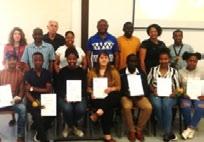
Biotechnology students attend Biosafety Symposium in March 2020
Just prior to the National Lockdown, the Advanced Diploma Biotechnology students and lecturers attended the Sustainable Biotech Innovation Symposium 2020 in Somerset West on 2 and 3 March 2020.
The symposium was organised by Biosafety SA, formed under the National Department of Science and Innovation. Biosafety SA developed an integrated ‘sustainability by design’ approach to Biotechnology Innovation, which considers all the relevant aspects that may impact the sustainability of biotech

products (graphically represented below). These aspects then also served as the session themes for the symposium and were presented by various speakers from diverse backgrounds, such as Department of Agriculture, Dept. of Science and Innovation, Medical Research Council (MRC), Agricultural Research Council (ARC), the clinical research institute TASK, Technology Innovation Agency (TIA), and the Universities of Cape Town and Stellenbosch. The symposium gave the students a well-rounded orientation to the biotech platform, and introduced them to the range of opportunities and thrusts that constitute the bioeconomy, which is a key theme in the curriculum.
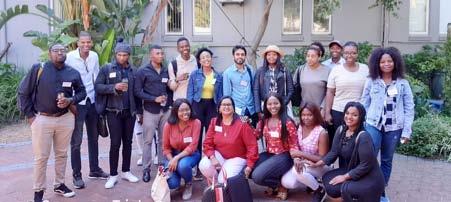
Preparing for remote teaching and learning
The arrival of Covid-19 brought with it a need to alter the teaching and learning strategies radically and swiftly in the faculty. In realising this, a number of items and concerns needed to be addressed first. We had to be cognisant of the range of challenges that students and staff were faced with in the midst of the pandemic and national lockdown. We were acutely aware of the personal
and societal trauma being felt around the world. As a result, the principles of empathy and ethics were used as a guide in all interventions.
The Faculty and Institution undertook to build capacity for remote teaching and learning among staff and students, through training, data provisions, conversations, and workshops. Several resources were developed alongside for students. Teaching strategies were redesigned to cater for all learning needs, including printing and distributing lecture material and assessments to those students who did not have access to reliable technologies and data. A wide range of modalities was implemented to engage with students, such as Blackboard, Facebook, WhatsApp, and any other tool that students felt would best meet their learning needs. In so doing, a constructive environment of collaborative learning was developed in the virtual classrooms. Lecturers and students together were engaged in reciprocal learning, and through constructive feedback, new pedagogies were developed, and existing ones were sharpened to be more relevant to the context.
Such is the spirit of CPUT’s Vision 2030, where ‘Oneness’ encourages the creation of safe, constructive learning spaces for all stakeholders. Using a range of modalities, selecting the most appropriate or even implementing a blend of pedagogies, and being responsive to ever-changing needs or shifting lockdown levels was a nod to the ‘Smartness’ tenet of Vision 2030.
Learning goes on: Lecturer builds a recording setup at home
Now retired, Dr Taj-Ud-Din Sheikh in the Department of Mathematics and Physics taught the Advanced Diploma in Mathematical Sciences subjects Matrix Theory & Linear Algebra and Non-linear & Partial Differential Equations. Dr Shiekh soon realised that many of his students did not have laptops and therefore found it extremely difficult to access the online
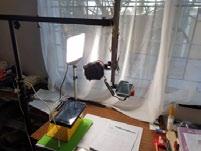
Video recording setup constructed during lockdown by Dr Taj-Ud-Din Sheikh, to engage remotely with students. The tablet is ready to swing under the cell phone when required.
learning management system, Blackboard. Wisdom, experience and a determination to meet the needs of students were in stark display, as during lockdown Dr Sheikh designed and built a home recording studio that used a mobile device attached to a selfie stick, mounted on a DIY-constructed stand.
Advanced concepts were then explained using short, focused videos, each covering a single concept, and sent to students via WhatsApp. The demand for more videos, covering a broader range of concepts was a testament to their effectiveness.
In another example from the Mathematics and Physics Department, Mr Thomas Farrar developed 3-D modelling to assist students with visualising 3-dimensional probability density functions. Mr Farrar made use of the equation editor on Blackboard, aligned to an automatic model answer once students completed the task.

When students required further assistance, Mr Farrar implemented animation to help visualise the answers in 3-D.
GIF file: 3-D visualisation of the mathematical model
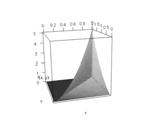
Lecturers have had to resort to very creative ways in attempting to salvage practical classes during the national lockdown. Since students could not be present to collect data for analysis and interpretation, some lecturers, like Dr Koebraa Peters of the Marine Science Programme, redesigned and implemented remote working laboratory practicals. Here, using a variety of online tools and means such as Blackboard and WhatsApp, lecturers were able to continuously engage with studentsand complete the fundamentals of the practical curriculum. Once lockdown ended and students were allowed back into the laboratories, wet lab practicals were re-introduced, to make up for the hands-on work that was missed during the lockdown period.
In other cases, data that would have been collected by groups of students out in the field had to be collected by the lecturer and then presented to the students for analysis, such as in this example.


Students were presented with the images they are expected to see, either as a whole specimen or using the microscope. Various interpretive and analytical exercises were developed around these virtual practical sessions, which were held online. Above are images of a tapeworm (left) and a microscope slide of a flatworm (right).
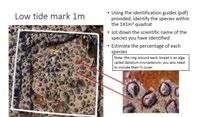
Students in the Department of Nature Conservation and Marine Sciences are often out in the field, learning through experience and through interaction with
municipal, governmental and industry partners. As a result, the lockdown presented particular challenges for these students, where field training is a critical part of the curriculum. Nevertheless, technology and partnerships were brought together to provide students with the best alternative for remote engagement: virtual field trips!
Professor Sjirk Geerts (left) coordinated the lessons, taking students on a virtual field trip during a national lockdown. During the trip, the beauty and diversity of the Western Cape was on full display, as students were led through the diverse landscapes, meeting expert guides along the way.
VIDEO Virtual Field Trip in Nature Conservation (https://www.youtube. com/watch?v=x87pM3fWrBs)
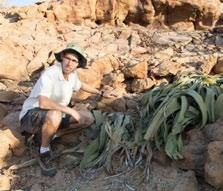
Journals and reflection blogs
In the Department of Horticulture, Facebook blogs helped students keep abreast of their learning, documenting their learning journey through the curriculum.

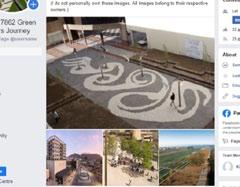
Lecturer for the subject Integrated Design Studio 2, Dirk Smith, observed that these served as excellent reflective exercises to enhance learning by getting students to journal in an online space. The journals were assessed, giving a measure of learning and involvement that is seldom evident from standard assessments alone.
Where access to technology was limited, lecturers resorted to creative ways to keep the learning momentum going. A prime example comes from the Horticulture Department, where students would ordinarily develop collages using Adobe Photoshop. With limited access to such software among students, the lesson was repackaged as a physical collage, where students had to search and stick images together, and physically draw plans in order to create the collage.
Opportunities to engage in first principles of the discipline were reported to deepen engagement among students, who really involved themselves in the learning process. As a very practical discipline, this pedagogy complemented learning outcomes in the horticultural sciences.


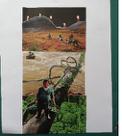
VIDEO Demonstration of collage by thrid year Landscape Architecture student, Rowland Jeane (https://www.youtube.com/watch?v=QTUHen3X0M4)
Faculty International Mother Tongue Day Celebration/ Kumbhiyozo Wosuku Lolwimi Lweenkobe Lwezizwe Ngezizwe/ Fakulteit Se Internasionale Moedertaal Dag Viering
On 20 February 2020, an event was organised in the Applied Sciences Communication and Language Centre to celebrate International Mother Tongue Day. The event programme included a presentation on the topic ‘Marrying multilingualism and inquiry to grow Southern African sciences’ by Dr Robyn Tyler of the Centre for Multilingualism and Diversities Research, UWC.
Praise-singing renditions were performed by praise-singer Sinesipho Yekiwe, a second year student in the faculty.
The event honoured multilingualism, with the programme in all three regional languages. The programme was coordinated by Ms Nomxolisi Jantjies in isiXhosa, and student panellists were given the option of conducting discussions using any language that they were comfortable with.
In keeping with the support for language development in the faculty, various other initiatives were in operation, from support for postgraduate writing, to the expansion of multilingual glossaries – which are also available online (https:// mlg.cput.ac.za/), and conversational language courses for staff in isiXhosa and in Afrikaans. The move to online engagement did not deter staff from pursuing the conversational courses, to allow for deeper engagement with, and build support and empathy for their students.

course.
Responding to needs of remote learning: Anti-Plagiarism Workshop
With the move to online teaching and learning, several concerns were raised around issues of plagiarism and how best to monitor and manage this in the online space. In response to this, a workshop on plagiarism was held on 12 November 2020. The workshop was conducted online, and was very well attended by members of the Faculty. Some of the topics covered included ‘Understanding plagiarism and academic integrity in the context of the CPUT’s Plagiarism Policy,’, ‘How students can be better equipped to access and manage information properly in order to avoid plagiarism’, ‘Using SafeAssign to detect and prevent plagiarism’, and ‘Intentional and unintentional plagiarism in uncertain times: Some observations from Covid-19’. Discussions were also held around assessments, and how they can be designed to discourage plagiarism and promote deep learning. Recordings of the workshop are available upon request from the Faculty’s Communication and Language Coordinator, Dr. Ignatius Ticha (tichai@cput.ac.za).
Winemaking in the Department of Agriculture
Second year Oenology students were each expected to use their knowledge of oenology to produce their own wines. They were expected to decide on the parameters for their wine, such as the yeast strain used, wood contact, skin maceration, etc., monitor the alcohol fermentation process and complete the steps of racking, filtering, bottling and labelling according to legislation.
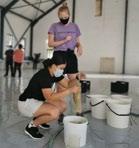
A formal wine tasting session was then held, where students presented their wines and explained the process used to reach their final product. The pedagogy was experiential, and a wonderful overall learning experience in the Department of Agriculture, for both staff and students.
Under a new normal, students returned to campus to complete the essential practical components of their curriculum. Laboratory skills are critical to the learning outcomes of most qualifications in the faculty. Biotechnology students, for example, were welcomed back to campus soon after the national lockdown. Practicals were conducted in a safe space, observing all the necessary Covid-19
training in the form of a basic culinary course.
Ms Rache Hanekom, a lecturer in the programme was delighted at the prospect, reflecting that this was an opportunity for peer teaching, and to add value to
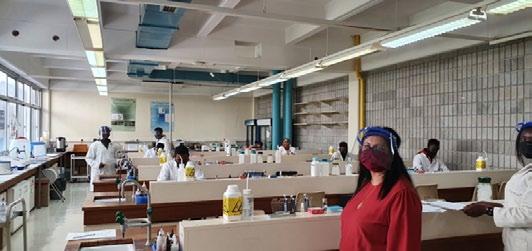
Students in the Consumer Sciences Programme developed classroom posters on various topics pertinent to the food industry, and partnered with the Cape Town-based NPO Vheneka, which focuses on empowering survivors of prostitution and trafficking, and providing psychosocial support and skills
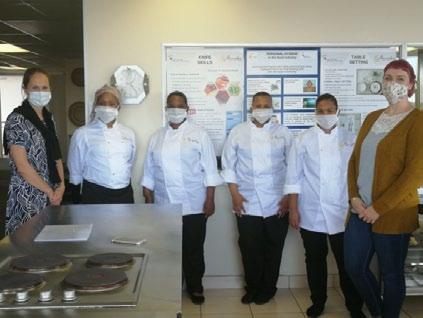
great learning experience. She believes that knowledge increases when it is shared.
The Faculty of Applied Sciences at CPUT continues to strive towards its vision to be the Faculty of choice for Science and Technology education in Africa. The practices highlighted here, under the most difficult of learning conditions, reflects this. The faculty aims to achieve excellence in its teaching and learning, its research and its technology transfer applications to produce graduates who are knowledgeable, employable and responsive to ever-changing societal needs.
The faculty has shown that it is committed to responding as quickly and efficiently as possible to student and societal needs. Student-centredness remains at the forefront of all teaching and learning practices. Despite the global

pandemic, and the dire lack of resources faced by students, lecturers were able to build capacity to continue the learning process, using whatever tools were at their disposal. The most vulnerable students were continuously sought out, and pedagogies were developed around supporting these students as much as possible, even via printed notes and assessments delivered to their homes around the country.
The faculty reimagined the crippling global pandemic challenge as an opportunity to build capacity for new modes of teaching and learning among staff and students, thus exploring new learning trajectories and developing novel pedagogies. This attitude to teaching and learning is the real sustainability model, allowing staff and students to shift, adapt and respond to any challenge it may face in future.
Through collaborative and reciprocal learning, in a two-way interaction between staff and students, new practices were explored. In most cases, students taught their lecturers about new social media platforms, about their specific learning needs, about their socio-economic conditions, and the resources available to them. In response, lecturers developed new modes of teaching and learning, catering to a wide range of needs, and ensuring that no student would be left behind. These are baked into the principles of Ubuntu and Oneness. With the capacity for remote teaching and learning, and the lessons of empathy and ethics of care that emanated from the pandemic, the faculty is well on its way to further entrenching the principle of Smartness, thus internalising the key tenets of CPUT’s Vision 2030.

Dr Desireé Scholtz
Assistant Dean Teaching and Learning (Acting)
Academic Year 2020 will always be characterised as a year requiring swift transitions, new ways of thinking, and implementing plans to align with current national and institutional requirements due to the Covid-19 pandemic. The year commenced with customary face to face teaching and learning for Term 1 until Level 5 Lockdown was implemented as of 27 March 2020. This necessitated planning differently for the rest of the year, given that Lockdown Level (LL) 5 was extended with very limited movement allowed outside of the home environment. The institutional response to resuming classes was to develop an Implementation Action Plan consisting of the quadruple multimodal model of teaching, learning and assessment. This included a mode for: (1) face to face teaching (when appropriate); (2) online/remote learning; (3) hard copy resources such as study packs and memory sticks; and (4) assessment. The faculty implemented weekly designated activities to be actioned by lecturers. These activities included aspects of reviewing subject content for 2020, revising subject guides for remote learning, developing interactive teaching and learning activities for remote learning and developing assessments appropriate to remote learning, amongst many others. This was co-ordinated by the HODs and faculty management, and a weekly checklist ensured that the trajectory of intended activities would be maintained and achieved. Several academic development initiatives on remote teaching were presented, which included capacity building on instructional design for online learning, podcasting and screencasting and how to use the Blackboard Learner Management System optimally to support remote teaching, learning and assessment.
Despite the swift transitions from the norms and practices of face to face learning to emergency remote learning due to lockdown measures, teaching, learning and assessment continued with students using mainly laptops and other mobile learning devices. Student support in the form of teaching assistants, retention officers, mentors and tutors proved to be invaluable in the kinds of academic and social support they so readily provided to their peers. While Academic Year 2020 (AY2020) was indeed challenging,

Dean of the Faculty
it brought about concerted efforts to rethink and repurpose practices which challenged the norms of teaching, learning and assessment. Examples of different practices included transformation seminars, collaborations with international university partners, adapting culinary practice to multimodal learning, listening to student voices, and planning workshops to educate communities about HIV and AIDS.
After the challenges of AY2020, the FBMS received several grants at the start of 2021, signalling a harbinger of positivity for AY2021. The faculty proudly acknowledges the grants received as follows:
• FASSET - Grant 1: Academic Support (PIVOTAL) 300 students @ R56 000.00 per student: Total R16 800 000.00
• Grant 2: FASSET Bursary Scheme with Academic Support 67 students @ R90 000.00 per student: Total R6 030 000.00
• PSETA Award for Work Integrated Learning R5 031 000.00 for 135 Students
Funding of this nature will no doubt be used judiciously to further the education of deserving students. To this end, the disbursement of funds and the concomitant activities outlined in the respective proposals will be administered by a committee consisting of institutional, faculty and SRC representatives.
Examples of teaching and learning innovation that prevailed in the Faculty of Business and Management Sciences (FBMS) during AY2020 are provided below.
Collaborative online international learning (COIL) project provides international engagement opportunity
Prof Brendon Knott
Department
of Sport Management
The Covid-19 pandemic may have prohibited international travel, yet in some cases it also provided a catalyst to design an online means of international engagement. Academics from the Department of Sport Management and the School of Marketing and Management at Coventry University, UK, realised that with all their students and class engagement being online, it was easier to arrange combined classes and virtual engagement, especially given the similar time zone. The result was the design of a collaborative project that saw students designing a marketing launch for an event which is similar to Cape Town’s ‘Fit-night out’ (an annual outdoor fitness event linked to the Women’s Health Magazine) but adapted for the UK audience.
A group of final year undergraduate students from Coventry were paired with Advanced Diploma CPUT students to collaborate on this sport event marketing project in a collaborative online international learning (COIL) project. COIL refers to virtual mobility experiences that are incorporated into the formal curriculum and provide opportunities to collaborate with students from an international university. At the end of the project the students were required to submit a 15-minute launch video highlighting various aspects of the event and their proposed ideas. In addition, each student was required to submit a reflective essay documenting the digital and intercultural skills they had learnt from the collaboration.
Students were actively engaged in sport event design and marketing principles on an international level of teaching and learning. The students from the two universities engaged virtually on this exciting interactive event design project. The UK version of Women’s Health Magazine aimed to bring the outdoor fitness event concept to England, to encourage sport participation by women, more so considering the forthcoming 2022 Commonwealth Games.
Selected feedback from CPUT students highlighted the success of the project:
The sessions were very informative and the two groups of students helped each other a lot. We got more understanding of event design and event experience. Now our group knows how to apply the theory. It was great to learn about their culture and how they do things.
We were able to work with students who are completely different to us. We were able to learn about how other countries do things when it comes to cultural activities and we were able to see how diverse we are as people, yet we were able to communicate and work together on this project.
The Coventry University project co-ordinator noted that her students learnt to compare their opinions and knowledge on outdoor fitness events with those of their university peers and the South African students. Students were able to gain insights into a different cultural perspective which they might not have even considered if the COIL project had not taken place.
these tasks and skills from being taught in a face to face environment, lecturers were required to review how subject content would be presented, while still incorporating knowledge and skills that students would have learnt in the physical classroom environment. This overview will focus on the redevelopment of how culinary practical was presented during the lockdown periods of 2020 and beyond.
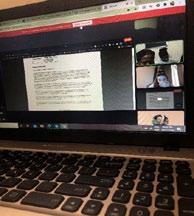
Adapting culinary practical to a multimodal approach
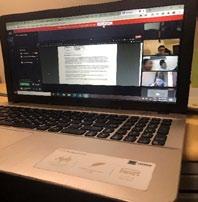
A major part of the culinary curriculum at the Cape Town Hotel School (CTHS) is based on skills. These skills are developed within a practical environment which simulates authentic situations either in the form of preparing and cooking foods or cooking for and serving guests. When the Covid-19 pandemic prevented
Before Covid-19, the format for culinary practical classes included the students arriving to receive recipes for the day’s production, followed by a practical skill demonstration by the lecturer. Students usually worked in pairs to prepare an end product, and on average the duration of a practical class ranged between 31/2 to 4 hours. However, once the health protocols for Covid-19 were in place, the format of the classes had to be adapted. Given the strict lockdown levels, student engagement with practical skills and content took place via remote learning. This was done through a selection of videos incorporating the skills and recipes students would have learnt in a practical culinary setting. Students worked through YouTube video links, and then using that knowledge, completed practical-based worksheets based on recipes they would have prepared in class. Previously the product was always the focus of the practical skill classes, especially for summative assessments. Students would usually prepare a culinary practical for a summative assessment over a time frame of up to five hours, but due to the pandemic this could no longer take place. To ensure student engagement with the content, a practical intervention project was developed. This project aimed to assess the process rather than a final cooked product. Students were required to prepare menus, develop recipes, calculate costing of recipes, develop skill and preparation lists and ensure optimal safety and hygiene processes for the kitchen. These projects were developed at various levels for the different years and content. As part of the projects it was encouraging for the students to engage with all teaching methods including videos, developing and making their own short videos, as well as researching aspects of culinary content.
When face to face practical classes recommenced, this was adapted to the various Covid-19 health protocols as required by the university. All culinary laboratories were only able to accommodate half the usual number of students as per physical distancing requirements. As such, the practical classes were designed to be more streamlined and well organized. Sharing of ingredients and
equipment had to be kept to a minimum and students had to prepare and cook on their own. Lecturers were not able to complete practical demonstrations due to physical distancing. YouTube video links of the recipes being prepared as well as the recipes were therefore sent to students prior to the culinary practical. This meant that students had to attend class well-prepared.
Moving forward, as we adapt to working within the confines of the Covid-19 pandemic, making use of a multimodal approach to teaching the content has been successful to date. Focusing on making use of videos for students to review, as well as testing the process of what happens before preparation and cooking and then the final product has encouraged both the lecturer and student to develop their thinking in a more holistic manner, which must be viewed as positive in terms of teaching and learning for the future.
Advanced Human Resources Development 4: How teaching, learning, and assessment were repurposed in response to Covid-19 restrictions
Dr Jerome Kiley Department of Human Resources Management
A critical assessment for Advanced Human Resources Development 4 comprises designing and developing a community-based training intervention. Previously, a group assignment was used where the learners were required to visit a school or community organisation and deliver a training programme on HIV/Aids. However, given the Covid-19 pandemic and accompanying lockdown, this was no longer safe or viable.
The assessment was adapted to individual assessments where the students had to conduct Covid-19 mini-workshops with their family/fellow students.
The implication was that the student’s ability to design and develop a Human Resource Development intervention could still be assessed while educating members of the community regarding:
• The nature of Covid-19.
• National statistics.
• Stages and symptoms of Covid-19 Infection
• Main types of Covid-19 transmission in South Africa.
• Ways of preventing Covid-19 transmission.
• Dynamics of Covid-19 testing.
• What to do if you are infected.
• Covid-19 treatment.
Over 150 interventions were delivered in the community that helped broaden understanding amongst the general public and student populations, and accompanying behaviours related to Covid-19.
in a pandemic:
Ms Mandie Richards Department of Business and Information Administration
The world as we know it has changed fundamentally since Covid-19 took it by storm in March 2020. We had no idea at first of the impact and devastation, and as we rode the wave as academics and students, we had to continue the academic programme. The mantra of ‘no student shall be left behind’ also resonated as the challenges were immense, and at times I doubted myself and the system.
The online environment, although challenging for many, also afforded opportunities for students who would initially not participate in discussions in a face to face session to add their voice to the conversation. Among the key rules in the subject were respect, and that we could agree to disagree; however, we needed to be open to new ideas and be prepared to unlearn old ones.
Diversity Management, a second-year subject in the Diploma: Business and Information Administration, includes a digital storytelling project. This project allows students to integrate writing, critical thinking and creative skills in developing a script and creating a video to tell

Voices in a Pandemic: Through the Lens of Ortem Callaghan ‘Changes in a Minor’
their story. The pedagogy in the subject includes reflection and often difficult conversations pertaining to social injustices.
The pandemic was a time for reflection and the online environment highlighted the inequalities of an unequal society and demonstrated the various challenges experienced by students.
Students were tasked with reflecting on their experiences in the pandemic and criteria were established for the requirements for the script and for a digital video. Creativity and poetic licence were encouraged. Initially it was a daunting task for many students who were often familiar with assessments which required textbook responses.

Videos created in previous years relating to a particular theme were shared with students on Blackboard. The topic in 2020 required deeper reflection by students one the impact on their lives during the pandemic. The online environment also brought a camaraderie and a deeper connection between students and definitely between this cohort of students and myself.
I consulted with students online about their drafts, and had the privilege of watching 161 digital storytelling videos unfold in the final product, and the sharing at times of very personal information and experiences. I laughed with them, cried with them and rejoiced with them as they told their stories, and was inspired by their resilience.
So many stories impacted me profoundly. Two stories, ‘Stepping into your strength’ by Ismaeel Jacobs and ‘Changes in a minor’ by Ortem Callaghan articulated the experiences of the ‘Voices in a Pandemic’ and were shared both with students online with their peers and at the online orientation for the first year cohort in March 2021.
I am deeply appreciative of the opportunity afforded me to have been part of the students’ journeys in 2020, and for sharing their stories and videos.
Ms Mandie Richards Department of Business and Information Administration
The online environment presented many challenges, but with many opportunities for collaboration and reaching a wider audience. Whilst on campus in February 2020, a Diversity Management student requested guest speakers from industry to be invited to provide guidelines on building their careers. Although the students were registered for a qualification, the majority were still unclear about the career paths they could pursue after graduation.
During the Blackboard online sessions, the student reiterated the request. In a face to face session, one guest speaker would be invited to present to a limited number of students on campus. The online environment provided opportunities for collaboration, and my request to alumni far surpassed my expectations.
As time only allowed a limited number of alumni online, I was also cognisant of data and bandwidth. I further invited the student who requested the session to co-facilitate the Shaping Futures Webinar with me, as part of shaping the futures of students is to provide opportunities for students to lead. The webinar allowed for a cross-campus integration for students at District Six and Wellington, which in itself provided a platform for students to connect. The webinar brought together alumni who graduated between 2009 and 2019, employed in various career fields, ranging from education, emergency services, web design, administration, and accounting.
The insights provided by the alumni allowed students to understand the dynamics involved in building their careers. They expanded on their journey as students and in their careers. Three of the alumni had also been recipients of an international exchange programme in Belgium in 2012, 2014 and 2018.
The alumni advised students to market themselves, improve their curriculum vitae, look for opportunities, use initiative, involve themselves in activities at the university and in community projects and volunteer their services in organisations to gain industry experience.
The active interaction and questions posed by students resulted in a second webinar titled Creating Your Brand, co-facilitated with an Advanced Diploma student who had been a recipient of the Abe Bailey Scholarship in 2019. Students received guidelines on writing their CVs, equipping themselves with skills required in industry, and information pertaining to protecting their digital footprint on social media.
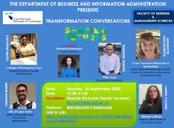

Both webinars were a resounding success and provided students with relevant information and networking opportunities, and alumni volunteered their services as mentors to all the second-year students. Graduate attributes at CPUT include advocating for responsible citizenship, and all of the alumni demonstrated that they wanted to be part of the positive change by their continuous involvement with the department and the institution, and by being brand ambassadors for CPUT.
The online environment has provided endless opportunities for collaborations and will definitely be included in the pedagogical approach in future sessions of teaching and learning.
Touching lives through hospitality education: expressing Ubuntu with Siya Kolisi
Dr Tshinakaho Nyathela
Cape Town Hotel School
The Cape Town Hotel School (CTHS) joined a venture with the (Siya) Kolisi Foundation to assist in alleviating hunger and supporting disadvantaged communities nationally by giving food hampers to vulnerable communities during the Covid-19 lockdown period. The purpose of the joint venture was to show care
by giving food parcels and education through menus in one ‘love bag’ grocery pack. The Kolisi Foundation provided groceries and the CTHS team provided custom-made recipes.
Recipe development based on the ingredients in the hampers was found to be an appropriate idea to share basic culinary knowledge and skills with communities to prepare nutritious meals using ingredients that are familiar, accessible, have a long shelf life and are affordable. These recipes were packaged together with the food hampers.
Nine recipes to serve 6 people were developed from the list of ingredients provided. The serving portions were determined by the estimated number of dwellers in households in these communities, and also to make it easy to reduce by dividing or increase by multiplying. To enhance the easy transfer of the knowledge and skills, recipes were proofread by Xhosaspeaking colleagues to ensure that they would be easily understood.
Conclusion

The partnership between the Kolisi Foundation and the Hotel School provided a unique opportunity for the Hotel School staff and students to make a difference in communities. This also opened a partnership opportunity between the Hotel School and the Kolisi Foundation to continue working together on future projects. This has left the Hotel School a new community engagement approach to be expanded to other communities in Cape Town, as this fits into the 2030 Sustainable Development Goals of reducing hunger, promoting good health and improving education.
Breaking the boundary: Igniting the education light through hospitality
Dr Tshinakaho Nyathela and Ms Celiwe Menze Cape Town Hotel School
Third-year students conduct annual hospitality-related training sessions at nonprofit organisations based in underprivileged communities. The purpose of these training sessions is to equip people with basic skills in hospitality that may be applied at a household level and also to improve their prospects for entrylevel employment. These training sessions are conducted face to face and practical skills are shared. Due to the Covid-19 pandemic, a different approach was explored whereby the Events Management and Hospitality Management modules, taught by Dr Nyathela and Ms Menze respectively, collaborated on a service learning project.
The collaborative project required students to develop a training manual and a training poster on hospitality-related topics. The main purpose of this project was to support communities during the Covid-19 pandemic. Students were divided into groups and meetings were held with the groups and the lecturers using Microsoft Teams and WhatsApp to discuss the projects. The posters developed were structured to showcase simple step-by-step procedures regarding Covid-19 hygiene and safety measures as well as other measures to combat illness, as shown below.
1. Sunshine smoothie
Simple and easy to follow recipes made from affordable and accessible ingredients. The smoothie assists in boosting the immune system.
2. Preventing the spread of Covid-19 in small takeaway outlets
Aims to encourage both customers and outlet employees to practice hygiene and safety while purchasing and selling food, respectively:
3. Food safety in the kitchen
Simple procedures to follow while working with food in the kitchen.
The collaboration went well and was continued the following year. Due to the challenges and the constraints caused by the pandemic as well as the restrictions
implemented, we could not share the posters with the relevant audience as we could not reach them via other online platforms. Moving forward, the practical training will be conducted with the communities as restrictions are eased. The posters will be shared for use in various communities.
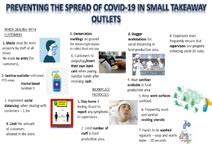
The vignettes presented here illustrate innovative practices in thinking differently about how subject outcomes were achieved while ensuring student engagement with knowledge and skills. Although learning spaces and places had changed, lecturers took the initiative to repurpose tasks that benefitted student learning and the communities of which they form a part. Pedagogy and access to knowledge are not necessarily limited to what happens in classrooms and oft times learning outside of classroom spaces has a lasting impact beyond the designated period of study. AY2020 was no doubt a steep learning curve for academic staff and will be remembered as the start of enforced change in our thinking about practices.
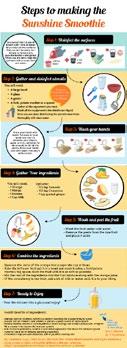

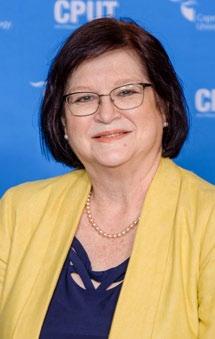
Dr Christa Thornhill Acting Dean/TL Coordinator
The Faculty of Education is spread over two campuses. One campus is an inner-city campus situated in Mowbray, which attracts many students from the greater Cape Town area as well as other provinces, especially the Eastern Cape, Limpopo and KwaZulu-Natal. The language of instruction on the Mowbray campus is English. The other campus is a rural campus situated in Wellington, about 70 km away from Cape Town and the language of instruction on this campus is Afrikaans.


2020 has been characterised by challenges emanating from the Covid-19 pandemic which impacted the modus operandi of universities, including Cape Peninsula University of Technology (CPUT). This report will demonstrate how this pandemic has redefined teaching and learning and how the faculty has responded to what has now been called a ‘new normal’. Further, there have been challenges, successes and pain that came with the loss of lives of the faculty staff members and students. Innovative teaching and learning strategies emerged in the midst of the challenging year as teaching and learning did not be stop, but were adapted through the use of multimodal strategies. The use of technology in teaching and learning activities and assessment became the order of the day. Successful face to face teaching and learning took place in term 1, then the term ended with student protests. Following that, transitioning to virtual modes of teaching and learning demonstrated a resilience that made the faculty exemplary in knowledge production and curriculum dissemination. As such, adaptations in the curriculum that continued to maintain the integrity of our programmes are explained below. Conferences through webinar sessions allowed the scholarship of teaching and learning to continue to take centre stage in the Faculty of Education. Student development and involvement in outreach and community engagement programmes, as well as the continuation of internalisation
programme and international partnerships in education programmes, are also highlighted. The report concludes with a brief indication of the way forward with an emphasis on redefining technological innovations for teaching and learning.
Use of technology to increase teaching and learning spaces in the heart of the pandemic
There has been an increase in the use of Blackboard to enhance and support learning. Several lecturers have made use of tools such as discussion forums and wiki pages and groups to encourage collaborative learning. There has been an increase in the use of online tests and assignments. More lecturers also booked computer laboratories for tests to be completed under typical exam conditions. Several lessons were learned during the year which informed practice for 2021. Microsoft Teams was also used as a platform to create teaching and learning spaces. Our practice was informed by the ideal that no student would be left behind. WhatsApp groups became a popular teaching and learning communication space between academic staff and students, and amongst the students themselves.
1. The application for the Diploma in Early Childhood Care and Education was approved by Senate and submitted to the Teachers Educational and Professional Change (TEPEC) research group. The amendments requested by TEPEC were implemented and resubmitted. The action plan was for training of staff members to capacitate departments to be able to complete this process more effectively and within a shorter time frame.
2. The PGCE in Education in SP and FET Teaching received CHE accreditation in June 2019 and we hoped to offer the programme in 2021. However, the faculty is still waiting for SAQA registration of this programme. Several enquiries were made to Curriculum Development
with no success, and the matter was reported at the QEC task team meeting.
3. The application for the Advanced Diploma in Adult and Community Education and Training was approved. Further, the TPD department retracted three other new programme applications due to the lack of staff capacity.
teaching and learning
Lockdown forced lecturers to explore alternative pedagogies needed to save the academic year. The following is a report on multimodal teaching and learning, highlighting challenges associated with our response to the pandemic.
It took some time for both lecturers and students to adapt to the new way of teaching and learning. Therefore, staff continued to put in more hours than usual to deliver their modules to the best of their abilities, but in 2020, it became clear that multimodal teaching is extremely demanding. Staff went an extra mile to assist students through using a variety of available modes.
Some students did not receive data, which was a stumbling block to their participation in online teaching platforms, despite having followed contingency plans made by the university. Even where data had been received, some students struggled with connectivity because of poor signal. They reported that they had to travel to towns or hilltops. They could not always do this because of travel restrictions, social distancing requirements, or bad weather. They then missed scheduled classes. It was noted that many lecturers and students were willing to be part of the process and applied themselves creatively to participate successfully in teaching and learning. They went beyond expectation and must be commended for this. Much use was of WhatsApp, Blackboard Collaborate, MS Teams, and even phone calls to deliver the academic project. Some students just disappeared or were absent because they were unable to participate or felt overwhelmed. Others asked to be deregistered. Transforming content for digital delivery put a lot of pressure on academics. Many students indicated that they were not keen to return to campus while there were a few students who
indicated that they wanted to come back to residences so that they could have access to WI-FI.
Challenges (data, tablets, laptops, etc.)
Assessments continued to be of great concern as 2020 progressed as it was found out that not all students were being reached. Students were sometimes under pressure because there was a lack of recognition of their difficult contexts. Some students could not be reached at all, despite every effort being made. Delivery of printed materials had its own problems. Some students were not able to get to the drop-off points; the question arose why they gave residential addresses but then had to travel long distances to collect parcels. Even students who were close to the drop-off points did not always collect, and these parcels ended up being returned to the university.
Challenges with printed materials continued. Printed material submitted early in April were not processed by the time assessments had to be done, whereas some printed materials were lost in the printing process. Some lecturers used only MS Teams, Zoom, or Blackboard Collaborate for classes, and this was problematic for some students.
Power outages impacted students over and above load shedding, e.g. cable theft. Some lecturers were completely unavailable to students. HODs managed such challenges internally as they became aware of the situation. WhatsApp was identified as by far the most accessible platform for students. There was a strong sense that academic staff were not reaching our most vulnerable students. Furthermore, there was deep concern over the responsibility placed on lecturers to reach students who were not participating, even though lecturers were trying their best to make contact with students if they seemed inactive.
Concerning PPD, it was reported that there was no clear project plan. Some functions would have been managed better internally by CPUT departments (and decentralised) rather than outsourcing them. When digital delivery of content did not work, it placed extra stress on lecturers and students. It was reported that there was a tremendous increase in the work expected of HODs who were at the time held unduly accountable.
It was decided to continue with provision of data, which students found very helpful. Assessment principles and practices needed to be revised. There needs to be more consideration regarding test availability times and resubmissions to assist students who struggle with connectivity, while still preserving the integrity of the assessment.
The discussion on providing first year students with laptops on registration still needs to be reopened. There is a need to address principles such as assessment for learning vs assessment of learning, considering that less is more. Further, the principles for identifying returning students so that we can reach the most vulnerable, including students allowed to return to residences, need to be revisited. More proactive attention needs to be given to the mental health of students and lecturers, more than just the provision of contact numbers for support. Delivering content through WhatsApp as pdf files, rather than delivering printed materials, needs to be considered. Academic staff and students struggled initially with multimodal teaching plans. The clear lesson is that we over-planned for assessments. These need to be reviewed again. Less is more…
Although there were challenges in the teaching and learning of courses offered by the faculty for adequate teacher education, there were surprisingly no highrisk modules identified, as was also the case in 2019. In fact some subjects which had previously showed signs of being at risk improved their pass rates in 2020. The same trend was noticed in 2019, in which the pass rates remained high while subject means were lower. For example, a class might achieve a 100% pass rate, while the class mean would be just 50%. However, despite the assumption that pass rates would drop significantly, they remained similar to previous years.
The continued lack of a Teaching and Learning Coordinator remained problematic, with the retirement of the Dean at the end of the third term putting
further strain on the Assistant Dean responsible for teaching and learning, as Dr Thornhill had to take up the responsibility of Acting Dean over and above her existing role. The 2020 academic year ended with the post of Teaching & Learning Coordinator still to be advertised.
FYE Coordinators, Dr Hanlie Dippenaar on Wellington and Dr Sibongile Shinga on Mowbray, and their teams comprising four lecturers and two ROs, were all results-orientated and dedicated to the programme. Mentors and retention officers were greatly empowered and inspired to make the FYE a more positive experience to all first year students.
In the face of the Covid-19 pandemic from term 2 2020, the FYE had to shift its focus to supporting students during the lockdown, which resulted in new ways of tackling issues and students’ challenges. However, the team tirelessly dealt with challenges, head on.
The following issues were successfully dealt with:
• SOS queries
• NSFAS queries
• Fundza queries
• Academic support students were referred to the contact details of staff working remotely to deal with queries regarding financial aid.
Due to lockdown and lack of internet access for students, ROs and mentors embarked on passing communiques to the students arising from Newsflash, HODs and lecturers, and the Teaching Practice Coordinator regarding the cancellation of the first teaching practical session, as well as with regard to Covid, protests, registrations and lockdown. Mentors and class representatives worked well together to get the information required by the FYE year coordinators on both campuses and this assisted in locating all the groups the first year students belonged to.
ROs on both campuses assisted the first year coordinators to get quite a few
students to complete a survey that was sent out for students to complete as there was only about a 50% response. ROs and mentors got students to send their details via WhatsApp if they could not complete the survey online and sent it to the coordinator. A survey e-mail that was forwarded by the Dean was sent to first years via WhatsApp regarding the collection of information from students due on 24 April 2020. ROs managed to get contact details for most of the students who were not able to access the survey online and all the information was sent via WhatsApp.
One problem was the utilisation of too much data to communicate with students and send them the necessary communiques. However, there were ways of dealing with the prevailing situation such as planning and releasing RO and mentor videos with the aim to motivate and remind mentees that we as mentors are there to support them. Daily motivational and inspirational quotes were provided. One mentor would post a quote to our mentor group, from where each mentor would repost it to their individual mentor groups, and ROs would also post it to the Instagram page to include the Foundation and Intermediate Phase students, with the aim of keeping first years positive and inspired during this difficult time.
Emotional support for mentors was mediated through ROs doing daily or weekly check-ins with mentors, as well as personal messages to those mentors with difficult circumstances or dealing with trauma. Ms Van SittersMentoor advised us to use the central counselling system provided by CPUT. Weekly meetings took place online with the aim of brainstorming ways to address challenges and queries as well as to plan activities for the next week. When they discussed challenges, they also identified possible solutions to overcome these challenges.
Art students showcase their work in virtual exhibition - Wellington Education Campus2020
Jacoba Meiring
The fourth year Education Art students were a group of talented student-teachers showcasing their work in a virtual exhibition. The exhibition was a culmination of a years’ hard work for students following the Art in Education module, which equips them to teach art in school. The focus of the year’s work was on the development of creativity and self-expression, an aspect which needs to be fostered in our schools to equip learners for the demands of the 21st century.
Remote teaching in 2020 brought many challenges for all students. The virtual exhibition showcased the art students’ brave and beautiful attempt at navigating these challenges.
Students experimented with a wide variety of mixed-media techniques on cardboard boxes and employed a process-approach in their work. The exhibition was proof of their ability, as future teachers, to turn challenges such as the shortage of art materials into opportunities to find creative solutions.
The exhibition can be viewed by accessing the following link: https:// www.artsteps.com/view/5fa1157cbf418b3f42af65a7?currentUser

The viewer navigates the exhibition by using the icon arrows and start and pause icon at the bottom of the screen. The viewer can also ‘walk’ through the exhibition by using keyboard arrows. By clicking on an artwork in the exhibition, more information is provided on the concept, the medium, techniques and how the artwork relates to classroom-practice. By clicking on ‘start the show’, the viewer will automatically be taken through the exhibition without self-navigation. Alternatively, a video is available of the exhibition in Mp4 format. The video includes a soundtrack of a rap performance written and performed by one of the students, Ashwill Meyer.

The Service Learning Civic Engagement Unit of CPUT, under leadership of Ms Jacqui Scheepers, supports staff and students from all faculties and departments, and advises on ways to collaborate with government agencies and community-based organisations in implementing relevant projects in urban and rural locations. Such projects are important experiential learning opportunities for students and enable the university to contribute to society in its aim to be an engaged and relevant university. In the Faculty of Education, Wellington campus, third year students who enrol for English did their service learning projects in a correctional facility in Wellington, as well as in a local children’s home where they assisted learners with English proficiency and reading. During the time of Covid-19, however, many service learning projects were cancelled due to the requirements of social distancing, including the projects of the Department of English.
Every year, students from the Faculty of Education do their practice teaching not only Wellington, but also in Mossel Bay and surrounding areas. Pastor Thys Wagenaar of the Filippeinse Christian Church, Community of Africa, his wife, Ms Angelina Wagenaar and others from the community started a soup kitchen during lockdown in Asla Park, Mossel Bay, and fed around 50 children twice a week. The children used to be beneficiaries of feeding schemes at their schools but were now going hungry. Pastor Wagenaar and his team purchased food and supplies from their own pockets and rose at 4 am to cook the meal, before they went to work to earn a living.
Department of English lecturers, Ms Valencia Theys and Dr Hanlie Dippenaar, heard about the project and arranged for CPUT students to be involved in the project. As part of their service learning project, the students created posters with motivational messages of hope for the children. Ms Jacqui Scheepers assisted in securing donations from local businesses who supplied vegetables and fresh fish to feed the learners. The Community Engagement (CE) Unit at CPUT contributed learning materials and other items which they transported from Cape Town to Mossel Bay. The learners were invited for an afternoon of fun and games on Wednesday 7 October, during which they received their posters and goodie bags. Camissa Solutions, which is engaged in a broad range of community projects in Mossel Bay, partnered with CPUT gave an inspirational message to the learners, telling them that they mattered very much. Ms Theys played educational games with the learners, whereafter the lecturers, joined by two postgraduate students from the Faculty of Education, conveyed messages of hope and support to the students and handed out the posters. The programme was supported by CPUT’s HoD of Emergency Medical Sciences (EMS), Mr Lloyd Christopher, and an EMS Masters student from CPUT, Daniel Tilley, facilitated a session on health and safety. He reminded the learners of the importance of safety during Covid-19 and taught them about paramedic services. After the event Ms Wagenaar and Ms Michaels provided a warm meal to all the learners.
International Symposium hosted by the Faculty of Education at CPUT and Universities of Ghent, Howest and Odisee (Belgium)
Dr Candice Livingston
The Faculty of Education, in collaboration with the Universities of Ghent, Howest and Odisee (Belgium) hosted a symposium on 5 and 6 March 2020, entitled ‘Language across the curriculum: A disciplinary literacy approach to meeting the language and literacy needs of a diverse student population’ at Klein Joostenberg Farm near Stellenbosch. This symposium was part of a bigger international collaboration between the Faculty of Education at CPUT and the Flemish Inter-University Council entitled ‘Training the teachers of the future: Language policy and literacy at CPUT (Cape Peninsula University of Technology)’. Dr Candice Livingston, project leader for the South African team, together with the organising committee, put together a programme with a variety of themes that included Disciplinary literacy, Translanguaging, Teaching language across the curriculum with the use of technology, and Language integration in the curriculum. This symposium was organised in order to highlight the work that was done in the project and the aspects of disciplinary literacy that had already been incorporated in the teaching and learning programme in the Faculty of Education. Due to the work that was done in this project between 2018-2020, the Education Association of Southern Africa (EASA) agreed to allow the faculty to host the 2022 EASA International Conference with a specific track for disciplinary literacy.
Prof Piet van Avermaet, the Flemish project leader, presented the opening talk and the Dean of the Faculty of Education, Prof Thobeka Mda, opened the proceedings. There were many highlights during this symposium, and this included our keynote speakers, Prof Mbulungeni Madiba and Prof Cecilia Jacobs. Prof Mbulungeni Madiba is the Dean of the Faculty of Education at Stellenbosch University and served as the director of the Multilingual Education Project (MEP) in the Centre for Higher Education Development (CHED) at UCT. Professor Cecilia Jacobs has worked in higher education for the past 28 years.
She is currently an Associate Professor in Higher Education at the Centre for Health Professions Education at the University of Stellenbosch. The plenary speakers were Ms An De Moor and Prof Muhammad Nakhooda. Ms De Moor is a Belgian language expert in higher education and Prof Nakhooda has a PhD in Biological Sciences, with an emphasis on plant biotechnology and is an associate professor of biotechnology at CPUT.

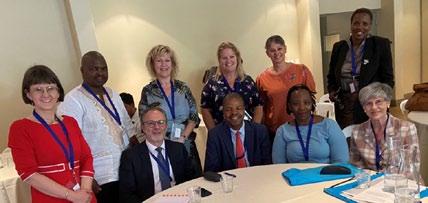
Prof Annelies Verdoolaege (Coordinator Africa Platform, Ghent University Association), Dr Zakhile Somlata, Ms An de Moor (Odisee), Dr Candice Livingston (Team Leader), Prof Cecilia Jacobs (keynote speaker), Dr Nomakhaya Mashiyi (Fundani), Prof Piet van Avermaet (Team Leader: Ghent University), Prof Mbulungeni Madiba (keynote speaker), Prof Thobeka Mda (Dean of the Faculty of Education) and Prof Petrusa du Toit (HOD: Research and Postgraduate Studies)
The project was impacted by Covid-19 in various ways:
• They had to apply for extension from the external funder, the Flemish InterUniversity Council and they were granted an extra 6 months, and hence the participants will now complete this project in June 2022.
• Neither the master’s nor the PhD student were able to do their data collection effectively.
• The practical case studies that we were conducting regarding the project were also compromised, hence the extension noted above.
• We were also not able to conduct our focus group interviews due to data constraints that the students experienced.
Partnership between the faculty and HAN University of Applied Sciences
The 2020 international programme kicked off with four students (who in the second semester of 2019 had undergone a rigorous selection process at different levels – academic merit (languages), financial means, intercultural competence, leadership skills and communication skills) attended a winter camp hosted by HAN University of Applied Sciences in Nijmegen, Netherlands, from 10–24 January 2020. Three were fourth year students, and the fourth one was an SRC member. During their two week stay these students were exposed to the schooling system and curricula used in the Dutch schools and they also had to do some teaching. HAN sponsored the travelling costs, accommodation and some of their daily expenses. Students had to raise their own funds to buy food for some meals and to pay for other miscellaneous expenses.
On 14 and 15 February 2020, ten third year CPUT students attended the HAN Orientation camp in Grabouw. This is an informal annual event, organized by Dr Karin Benjamin (HAN coordinator in South Africa), where students from the HAN, who are on an exchange programme based in the Overberg region to do community upliftment in general, get to meet and socialize with students from the Senior and Further Education & Training Phase department. Selection of students is based on their interest shown in participating in international programmes.
Two student teachers from UCLL (Belgium) who had to complete a two-month tenure at Kalkfontein Primary School had to cut short their programme and return to Belgium, initially because of student protest action and eventually because of the onslaught of the Covid-19 pandemic.
MoUs with UCLL and HAN were signed and are now in place.
Due to the ensuing Covid-19 pandemic, the various internationalization events had to be cancelled such as the attendance of the ETEN conference in March/April 2020 in Ebsjerg, Denmark by Dr Waghid and Ms van Staden, the selection of the 4 students to attend the HAN summer camp and the COIL project between Life Sciences (CPUT)and Geography (HAN) students – to be revived in 2021.

Dr Candice Livingston
1. On 5–6 March 2020, the ‘Training the Teachers of the Future’ project hosted a symposium in order to share teaching and learning experiences regarding Language Across the Curriculum practices. A link to the programme of the symposium and to the story that was published on the CPUT website is shown below. All members of our team presented at the symposium and their names are on the programme. https://www.cput.ac.za/newsroom/news/article/4042/literacy-needsof-diverse-students-unpacked.
2. Dr Livingston also provided training for the Centre for Innovative Educational Technology in the module: ‘Course design benchmarking Webinar series’, and the Module I presented on 23 September 2020 was ‘Engagement, community and communications’. The recordings of these webinars are available on the best practices page on Blackboard.
Ms Vanessa Van Staden attended the following workshops: ‘Blackboard Advanced Training’ offered by Fundani; ‘Environmental education in a time of crisis (Covid 19)’ and a workshop on ‘Environmental justice in our work and everyday lives’ offered by WESSA Schools; Staff support, and ‘Interpretive Phenomenological Analysis’ offered by the Faculty of Education Curriculum Officers.
Conclusion
With the assistance of Fundani, CIET, and the IT and T&L Coordinators, all staff actively used Blackboard in their daily teaching and assessment. The FYE programme gained momentum in assisting first year students to successfully transition from high school to university and again technology was used to support new students digitally.
Internationalization projects forged through partnerships created between the faculty and universities abroad took another turn in 2020, even though the pandemic could have impacted them negatively. This was demonstrated by the successful symposium organised by a team under the leadership of Dr Candice Livingston. However, the HAN-CPUT partnership could not work as successful as previously. Due to travel bans, the students exchange programme could not happen.
Curriculum Officers did their best to work together through online programs they offered in 2020 to support both lecturers and students. Sessions were held online and if staff could not participate in the sessions held, there were options still left for them like sharing recorded sessions to all staff in the faculty. This was seen as a step forward towards harmonization between campuses. The faculty is still awaiting the revised Minimum Requirements for Teacher Education Qualifications (MRTEQ). 2021 seems to be a year where adaptation of curriculum (MRTEQ) changes will be done. The faculty demonstrated resilience and was quick to adapt curriculum delivery to save teaching and learning of the balanced curriculum with the consequence of successful assessment, and hence 2021 started with an almost normal momentum.
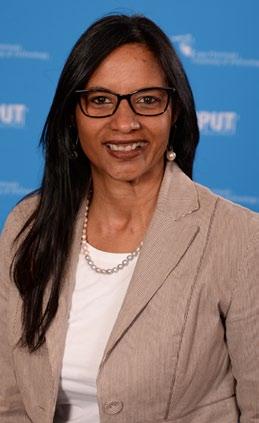
Prof Marshall Sheldon Dean of the Faculty
The Faculty of Engineering & the Built Environment (FEBE) has the following Vision and Mission statements in line with the Faculty Strategic plan 2020:
To be at the heart of engineering education, technology and innovation in Africa.
To be a faculty that is efficient, sustainable and environmentally conscious, known for its high quality teaching, research and innovation.
The Faculty of Engineering and the Built Environment (FEBE) is one of six faculties and the second largest within CPUT, with approximately 6,700 students registered in 2020. The Faculty currently consists of eight departments operating over three campuses: Bellville, District Six and Granger Bay. It covers a broad range of engineering, built environment and related disciplines, i.e. Chemical Engineering; Civil Engineering and Surveying; Clothing and Textile Technology; Construction Management and Quantity Surveying; Electrical, Electronic and Computer Engineering; Industrial and Systems Engineering; Mechanical Engineering and Mechatronics; Maritime Studies and Marine Engineering.
Prof Sheldon holds a doctoral degree in chemical engineering. With more than 20 years’ experience in higher education she has held the positions of lecturer, senior lecturer, associate professor, head of programme; Acting HoD of Chemical Engineering; Assistant Dean of Engineering: Teaching and Learning; Dean of Engineering and the Built Environment; and Acting Deputy Vice-Chancellor: Research, Technology Innovation and Partnership. She has spent more than 10 years in management positions, which includes 3 years of senior management and 2½ years of executive management.
Prof Sheldon is registered as a Professional Engineering Technologist with the Engineering Council of South Africa (ECSA); is a member of the Water Institute of South Africa; South African Institute of Chemical Engineers (SAIChE); South African Society for Engineering Educators (SASEE), having served on the board 2017-2019; UK Institute of Chemical Engineers (IChemE) and African Engineering Education Association.
Prof Sheldon is a C2 NRF rated researcher. To date she has successfully graduated 14 masters (4 cum laude) and 4 doctoral students. She has published and co-authored 30 articles in international peer reviewed journals; 9 international conference papers; 1 book chapter and 1 WRC technical report. She has an h-index of Google Scholar 13; Scopus 10 and Web of Science 9. Her research work has been presented at more than 60 conferences internationally, nationally, and locally.

Toni Stringer was the Acting Assistant Dean: Academic in the Faculty of Engineering and the Built Environment at CPUT up to March 2020. Her background is in Civil Engineering and more recently, in curriculum development for new HEQSF-aligned qualifications. She holds a Master’s Degree in Civil Engineering and a Postgraduate Diploma in HE Studies from the University of Cape Town. Ms Stringer is enthusiastic about work integrated learning, community engagement, and service learning. She has been a lecturer in the Department of Construction Management and Quantity Surveying for more than 10 years; her substantive post is HoD of the same department. Together with the T&L Coordinator and the T&L Committee, she champions T&L in the faculty.

Dr Joseph, who has been the T&L Coordinator since 2014, leads teaching and learning in this faculty across all 8 departments, with the support of a committed and enthusiastic team of departmental Teaching and Learning Representatives, the Language Development Coordinator, the ECP Coordinator, the Student Engagement Coordinator, as well as representatives from Fundani Centre for Higher Education and Development, and the library. The University of the Western Cape was her first alma mater where she completed a BA in languages (English and German), a Secondary Teaching Diploma, and a postgraduate B.Ed degree. She holds an Ed.M degree from Harvard Graduate School of Education, and a PhD in Political Science (on Gender Mainstreaming in International Development Organisations) from Stellenbosch University. Her work experience spans secondary and tertiary teaching for more than 10 years, as well as extensive management experience in national and provincial government departments (12+ years). Among other things, her portfolios included gender and transformation in both government and higher education.
Many staff members required development, training and support to move to a remote and flexible multimodal delivery of the curriculum. As shown in Figure 1, the Centre for Innovative Educational Technology (CIET), together with the Learning Development Unit, supported staff with training and development on the use of available and CPUT supported digital platforms such as Blackboard, Blackboard Collaborate, Respondus, Microsoft Teams, Zoom, other Office 365 applications, and other online learning-related modules. While very challenging to manage, this situation provided an opportunity to develop practices not only for now but for the future as well. CTS worked on a desktop replacement project for staff as part of the pandemic, and also as a shift to align with the institutional strategic plan.

Peer support programmes in the faculty are made possible through various student positions such as teaching assistants (TA’s), tutors, mentors and retention officers (ROs). All of these are funded by the UCDG and the faculty. The table below is a summary of the number of students who provided support to at-risk students in our 8 departments, in 2020.
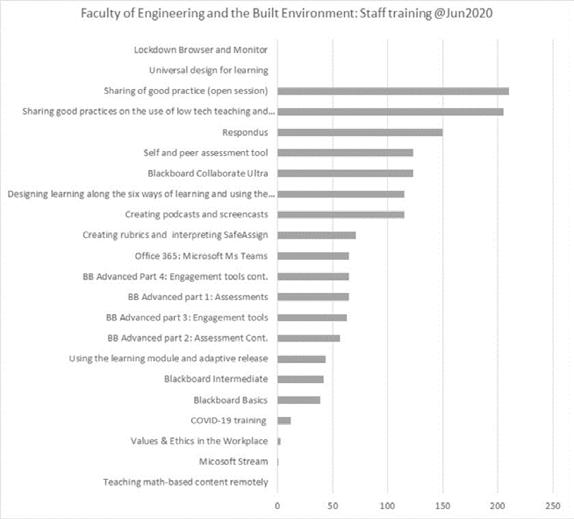
Initially the faculty was allocated 10 teaching assistant positions through the UCDG budget. However, at the resumption of the academic programme, after lockdown levels were reviewed, the faculty was allocated an indefinite number of teaching assistant positions. The number of TAs appointed can be seen above.
It goes without saying that the TAs, working with both tutors and the lecturers, mentors who worked closely with students to provide psychosocial support, ROs who worked with lecturers and at-risk students, all contributed to the academic success of the 8 departments in the faculty.
The EWS was not fully taken up by some departments. However, in certain cases, the processes were followed (such as notification and discussion with students). It became evident in the meetings held with departments that made themselves available for the online meetings that the departments were active but not reporting on the activities.
The impact of Covid-19 on higher education, teaching and learning, needs no introduction. Faced by the huge challenges caused by this pandemic, the Senate adopted a revised academic implementation plan called AY2020, based on a flexible multimodal approach with remote teaching and learning, as well as remote assessment strategies. This plan provided for a week-by-week strategy for the shift to remote and flexible learning, beginning from 4 May up to the start of Term 2 on 1 June. The plan included a four-zone carousel model which made provision for Zone 1: Print material; Zone 2: Face to face teaching, learning and assessment; Zone 3: Preparation for and assessments; and Zone 4: Online learning. Some of the AY2020 success stories and highlights follow below. Chemical Engineering Department
The Level 1 Coordinator, Ms Ayesha Reiners (who is also the faculty Acting Language Development Coordinator), participated in a group project that integrates knowledge, skills and values acquired in Engineering Chemistry 1, Engineering Communication, Engineering Physics 1, Engineering Mathematics and Engineering Computer Applications. Each group was randomly assigned to one of 10 topics. The task associated with each topic was not final –specifications could altered as the project developed.
The project was developed and assessed in each subject. Details of the project development and assessment can be found in each of the subject guides. The development was linked to learning outcomes which were further linked to graduate attributes.
The Chemical Engineering Department, in collaboration with the Chemistry and Food Technology Departments, combined their expertise and experience to provide hand sanitizers to the university at a time when demand for the product exceeded supply on the open market. This initiative enabled the university stores to hold sufficient reserves of sanitiser which subsequently facilitated the re-opening of the university in the second semester of 2020. The facility produced, packaged and distributed in excess of 5 000 litres of hand sanitiser, which was distributed to staff, students and also supplied at the entrance of buildings. In 2021, the facility remains in production, albeit as a reserve facility, to be called in should supplies run low.
Mr Luvuyo Kakaza and Professor Tunde Ojumu played a seminal role in identifying the need and giving it the necessary support, at just the appropriate time during the pandemic. The idea was quickly taken up by the departments and brought to life by a production team comprised of Mr Taffy Madzimbamuto and Ms Hannelene Small from Chemical Engineering, Ms Zandile Mthembu and Mr David Kock from Chemistry, and Mr Owen Wilson from Food Technology. The team received much valued support from the heads of the respective departments – Professor Jessy van Wyk, Dr Udi Narsingh and Dr Francois Wewers of the Food Technology, Chemical Engineering and Chemistry Departments respectively. The Food Technology Department so generously donated their facilities and equipment. Production was carried out under the able supervision of Mr Owen Wilson.
The ECP programme partnered with the institutional ECP based at Fundani for e-coaching (funded by the Michael & Susan Dell Foundation) which was beneficial for students who were under pressure during the pandemic. The first year class was mentored by a group of trained mentor-tutors from the second year ECP class who provided psychosocial support and tutoring when needed. The second year class was in turn mentor-tutored by trained students in the third year class. All the trained mentor-tutors worked closely with the mentor who trained them and oversaw the programme. These mentors are he/ros and she/ros as they provided support to fellow students during this trying time, while they themselves were experiencing various
pressures associated with the pandemic while still studying.

Mr Maghmood Palmer, a master’s student in Chemical Engineering under the supervision of Dr Chowdhury, successfully published a third journal paper in 2020, which is rare for a master’s student at CPUT.
With the continued support of staff members, who generously made either monetary or food donations, the department continued to run the Chemical Engineering Food Pantry with the assistance of Ms Ayesha Reiners who offered her time to source supplies, pack food parcels and deliver them to campus to try alleviate food shortage among the Chemical Engineering students who remained on campus.
With regard to staff awards: • Both Drs Mahabubur Chowdhury and Moses Basitere were nominated for the 2020 NRF Research Excellence Award for Early Career/Emerging Researchers.
• Dr Mujahid Aziz was awarded his doctoral degree during the CPUT Digital Graduation held in June 2020.
• Mr Dumisane Hlongwane was admitted as an Attorney, Conveyancer and Notary before the Judge President of Cape Town High Court on 5 June 2020.
• Prof Oluwaseun Oyekola was awarded the Carnegie Scholarship to support his PGDip in Educational Technology (which he completed in 2020) at UCT. Prof Oyekola was also selected for the Teaching Advancement at University (TAU) fellowship taking place in 2021.
• Two staff members, Mr Gregory Hangone and Ms Ashleen Marshall, received long service awards for 20 and 30 years’ service respectively.
Ms Cheryl Belford, a lecturer in this department currently pursuing a PhD, did a presentation at the annual CPUT Language Indaba, sharing how she was using pdf notes with problems and examples on Blackboard as a starting point. She would then build on that, using students’ questions to expand on content and in this interactive manner, ensuring that the students learned the required content by regularly adding, changing or updating it on Blackboard.
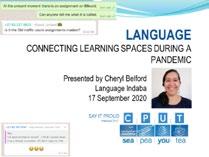
She also used WhatsApp, but found that the speed of posts distracted students, and consequently the concept being taught got lost in translation. However, WhatsApp was very successful as a quick communication tool for administrative queries or individual questions after an assessment.
Successes of the Clothing and Textile Technology programme (especially practicals): The programme has a significant practical component and this was successfully completed under difficult circumstances. Students returned to campus and were divided into small groups of 10 to adhere to the Covid-19 physical distancing protocol. With little regard for their health concerns, the staff responsible for practical subjects came to teach our ECP students every weekday from 14 September – 28 October 2020. No incidents of Covid infection were recorded during the period of practical work for the duration. Another success to note is the completion of the programme and examinations for the 2020 academic year. The department recorded a high student retention and pass rate during this period when many students were lost in the system. A concerted effort to follow up on the students by calling each student was done by the department during the lockdown to encourage and motivate the students.
The purpose of the Rising Star Awards is to recognise alumni (graduates and diplomates), aged 45 years or younger, who have made significant progress in their career fields or contributed to the development and well-being of society and show promise for even greater future achievements. As an applicant one needs to be nominated by a number of people who recognize one’s achievements.
The German Academic Exchange Service (DAAD) and the Carl von Ossietzky University of Oldenburg, Germany, are jointly organising the 13th DIES UNILEAD Course in Oldenburg, Germany. The intensive training course is part of the DIES programme (Dialogue on Innovative Higher Education Strategies) which has been jointly
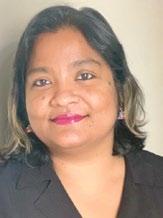
coordinated by the DAAD and HRK (German Rectors’ Conference) since 2001 and funded by the Federal Ministry for Economic Cooperation and Development (BMZ). There were over 150 candidates and Dr Sweta’s application was approved on a competitive basis by a committee of highly renowned university professors and professional experts of higher education management and research.
Mr Lungile Nyanga, a lecturer in Industrial Engineering Design (IED) which is taught at first year level, initiated and entered a remarkable integrated project for the Design for People Challenge. IED is project-based with projects done in teams. Mr Nyanga collaborated with the other first year lecturers and selected the best teams for this competition, run by Engineers Without Borders (EWB) UK, in collaboration with EWB USA, EWB Ireland and EWB SA. The students in the participating universities were given the same design problem based on a certain community identified by EWB. The community chosen in 2020 was Maker’s Valley in Johannesburg. 7000 students participated in this competition worldwide, of which 2200 were from South Africa.
CPUT entered three teams for the South African leg of the competition. The teams were:
• The Terminators – Development of a cost-effective internet of things (IoT) smart bin which can identify waste utilizing an image recognition algorithm, compact the waste and transmit data to the control room when the bin is full.
• Creative Blues – A crime detecting surveillance system.
• Special Group – A cost-effective water filter which uses activated bone charcoal.
All three teams reached the reviewer stage. The Terminators proceeded to the final stage which was conducted through a presentation and a Q&A session from judges. The finals were held over Zoom on 1 December 2020 and the results were announced on 8 December 2020, also on Zoom. The Terminators distinguished themselves by winning.
This was a great achievement given that it was the first time that CPUT had entered the competition. The team were first year students only and were competing with some of the top traditional universities in South Africa, which include Stellenbosch, University of Pretoria, UJ, UCT and NWU, for example. It

Their win shows that CPUT students have what it takes to tackle problems in our communities, and that we can compete with South African and international universities and emerge as the best. We believe it is the start of a journey for CPUT as we intend to participate in the competition next year which will be based on a community problem in Peru. Taking the lessons from this competition, we will be better prepared for 2021.
Students who are eager to kick-start their maritime careers can now apply for exciting new qualifications at CPUT.
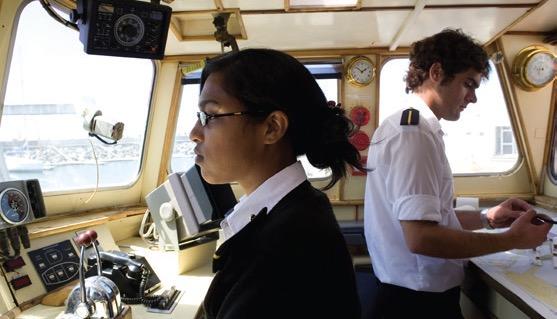
A maritime career offers the perfect balance between love for the marine environment and a flair for science and engineering. The new programmes consist of Extended Curriculum Programmes (ECP) for a Bachelor of Marine Engineering and Bachelor of Nautical Science. With the theme ‘Building South Africa’s future by creating yours,’ the two ECPs of Nautical Science and Marine Engineering will provide an opportunity to enter the Faculty of Engineering and the Built Environment at CPUT. The courses are the latest additions to the more than 80 internationally recognised qualifications offered at CPUT from March 2021.
Head Of Maritime Studies and the Survival Centre, Ms Theresa Williams says the courses will be offered at the Granger Bay campus for full-time students (first year intake). Ms Williams adds that the one-year ECP foundation programme is ideally suited to students who require a bridge in order to gain entry into the mainstream three-year Bachelor’s degree. This foundation year programme
is for applicants who achieved between 40% and 49 % in physical science and mathematics or between 50% and 59% in technical science or technical mathematics. ‘The foundation year prepares students for higher education by inducting them into the conceptual and technical knowledge in their chosen field of study,’ she explained.
Department of Maritime Studies lecturer, Ekaterina Rzyankina added that the department designed the one-year foundation programmes bearing in mind how the Covid-19 pandemic might adversely impact high school learners’ (particularly those in grade 12) potential in mathematics and science. This intervention involves a dedicated second semester during which students are formally taken on a field trip to visit maritime industry partners. This opportunity enables the student to visualise the job that nautical scientists or marine engineers do on board ships, in the port environment, as well as in the greater transport and logistics sector globally. Career opportunities include ship management (education, training and development), ship navigating officers, marine pilots, tug masters, vessel traffic services operators and port operations. After successfully completing ECP, the students will have an opportunity to enrol for the first year of a Bachelor of Nautical Science or Bachelor of Marine Engineering degree.
The article below was written by a student in the department, Nambua Elizabeth Nteka, who served as a Retention Officer (RO) in the department in 2020. An RO post is a student job, and part of the Work Study programme at CPUT.
The mentorship programme at CPUT is an initiative from the FYE department. The programme is part of the institution’s development project focused on providing additional support to first year students. This includes support for adjustment to varsity

life, emotional and social support, assistance in identifying different resources available for first years at the university, and any guidance related to their academic work. Where possible, the mentors’ role was also to refer the students to the relevant departments should the need arise such as the Housing Department, Financial Aid, student Counselling, etc. Above all, the actual intention behind the mentorship structure is to boost the first years’ academic performance and reduce the institution’s dropout rate. In Mechanical Engineering in 2020, we had 22 mentors, 11 in the ECP and 11 in the mainstream.
The mentors were all senior students at the institution who were trained and groomed to assist the first year students. We also had 3 ROs (retention officers), 2 in the ECP and 1 the mainstream. The role of the ROs was to supervise the mentors and provide them with the support needed to perform their roles successfully and efficiently. In addition, the ROs had the role of identifying loopholes in the programme and give suggestions for improvement, and that was done through monthly reporting to the coordinators and the FYE. Where possible, the ROs also had direct contact with first years to provide guidance and/or to refer them to the relevant support units available at our institution.
In conclusion, the mentorship programme is here to ensure that the first years understand how things work at the institution, and to introduce them to all facilities available so that they know where to go when in need of a certain type of assistance. To ensure that the programme was fulfilling its purpose, towards the end of 2020, we sent out a questionnaire to the first years. Over 70 students responded to it and the results were fascinating. Most students reported on the benefits of the programme and how mentors helped them in many aspects of their journey as first year students under the pandemic and lockdown conditions. Some students who had the intention of dropping out found enough support from the mentors and stayed on in the programme.
The AMTL robotics programme was initiated by TIA AMTL and a group of mechatronics students from Mechanical Engineering towards the end
of 2018. The goal of creating the group was to inspire innovation as well as create a platform for equipping the students with critical thinking skills and problem-solving skills through mind-challenging educational competitions in the field of robotics, programming and artificial intelligence. The students were supervised by Prof Oscar Philander and trained by Inyeni Amakuro Showers, a postgraduate research student at AMTL. Training schedules were fixed so as not to interfere with other academic tasks of the students. The students took several programming classes in Python Programming Language, LabVIEW and common programming algorithms used in robotics. They were also trained in design and mechanical assembly of robots, robot communication systems, robot power supply systems, servo motors and DC motors, robot arms, machine vision, sensors, localisation and simple driving base robots. The students were able to proudly represent CPUT at prestigious robotics competitions such as WorldSkills South Africa Mobile Robotics 2019 and World Robot Olympiad Advanced Robotics Challenge 2019. Currently the team is working on a software

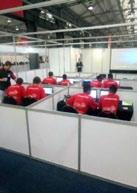
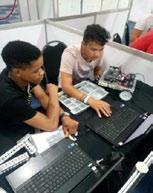
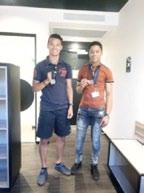
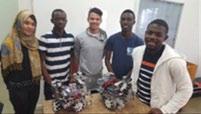
The Extended Curriculum Programme (ECP) in Engineering is positioned as a remedial programme to address the educational imbalance in disadvantaged communities and to improve throughput in our departments in the faculty. In 2020, the pandemic challenged our normal teaching and learning philosophies on how to address the needs of these students. The paradigm shift to online learning has been interesting: below are a few comments from staff in our departments. Psychosocial interventions started at Chemical Engineering was run by the institutional ECP unit funded by the Susan & Michael Dell Foundation. During the lockdown, the intervention was transformed to an e-coaching intervention to assist identified students who required assistance.
Below are some of the success and challenges experienced by the ECP in our departments.
it will be difficult to find anyone not in agreement that 2020 was a challenging year for everyone. It forced us as ECP staff to think on our feet, adapt and make the best of the situation without compromising our teaching and student learning. The biggest challenge was not knowing the year 0/first year students and communicating with them virtually for 90% of the year. There are some students in the first year class to whom I still have not spoken face to face.
In general, participation and communication improved as both the students and lecturers became more comfortable with the multimodal RTL methods used. The 2020 pass rates for the first and second year ECP subjects were very similar to when we had normal face to face classes, and even the dropout rates were comparable – I thought it would have been higher. Engineering Mathematics successfully made use of the online platform WebAssign which allowed students multiple attempts for formative assessments and was also used to conduct summative assessments.
Our e-coaching intervention together with the Fundani-based institutional ECP, and funded by the Susan & Michael Dell Foundation, is described above.
In 2020, ECP Mechanical moved smoothly to online teaching and learning because of an already robust hybrid teaching and learning mode. The programme also identified students for the psychosocial support e-coaching programme . it was found that the ECP students were outperforming mainstream students. This could be attributed to the following factors:
• The ECP has a strong student support structure using peer online support i.e. tutors, mentors and TAs.
• The ECP does everything in its best to expose student to the real industrial environment through company visits and workshops through online videos.
• There is a strong mentorship programme to assist first ECP students through their first year experience
The main challenge was that the extra workload strained academic staff, leading to fatigue and burnout.
The ECP extends the year of study by a year. This allows the student time to make the transition to tertiary level with a lower load of subjects and more support in the subjects at risk. In Civil Engineering the subjects at risk are particularly the physics-related subjects and Drawings, which many students have not previously been exposed to. The extra year is used to spread the curriculum over the 4 years. There is no point in just easing the load in the first two years with students facing a heavy load in their following two years. Students are more intensively supported, unlike the mainstream students who generally lack this support. This is one of the primary roles of the ECP coordinators. We are more likely to be notified if there are problems in the class with the students, with the lecturer, etc., instead of finding out the problems at the end of semester or year.
The stigma of being in an ECP programme has changed – most students by far, in the departmental coordinator’s opinion and experience, do not mind (or are not embarrassed) to be in an ECP class. There are, however, some. Over the past few years the chairman of the student chapter of SAICE was an ECP student.
The staff felt they were overworked and required assistance especially dealing with their large ECP student cohorts.
Successes: The programme has a significant practical component and this was successfully completion under difficult circumstances. Students returned to campus and were divided into small groups of 10 to adhere to Covid-19 physical distancing requirements, as noted above. No Covidrelated incidents were recorded during the period of practical work in the September- October time period. Another success that the department notes was the completion of the programme and examinations for the 2020 academic year.
Challenges: Difficulties were encountered in contacting some individual student for tutorship and mentorship with different reasons cited, such as lack of phones or data. Also, there was generally poor attendance online.
There is no doubt in my mind that the combination of challenges the department and the ECP programme faced in 2020 were unparalleled and unprecedented, to say the least. Fortunately we did one thing to mitigate the effects of these challenges, amongst many which stands in our favour.
Our ECP intake is usually two groups of 50 students for the first-time ECP level 0. Coupled with this is a returning cohort of around 100 who now are ECP Level 1 students. Our programme thus accommodates around 200 first year students at any time who are served by 6 lecturers, 1 admin assistant and a mentor appointed on a part-time hours contract.
Last year, a counsellor Ms Fe van Haght approached the department with a proposal to run a Social Emotional Development Programme specifically for all our new Level 0 first time first year students. The purpose of the programme was to assist the new students to articulate into university life by helping them deal with social and emotional issues which a first year student often struggles with on their own, thus affecting academic performance. The programme content was great, there was a clearly laid out workbook and I thought it was excellent.
We engaged the counsellor on a part time-hours basis, scheduled her interactions as compulsory on the timetable and ‘borrowed’ a 5% weighted assessment mark from our Communications subject in order to make it an assessed subject. Then we created a subject on Blackboard for communication and interaction purposes, little knowing what was to come.
When the pandemic hit us, many first year students were discouraged because this was going to be their first year of study at a university. It was rudely snatched away from them and many had to return home again to face friends and relatives who had not more than two months ago
Staff and students had to shift from a mostly contact, on-campus mode of delivery to a multimodal off-campus delivery of the curriculum with continuous changes from lockdown levels 5 to 1 as the year progressed. Delivering a curriculum to a diverse group of students spread across South African, with some even international, all with their own challenges, ranging from access to appropriate devices, data, connectivity, conducive living and learning environments, and personal and unique challenges. The faculty had to adjust the teaching, learning, assessment and communication strategies accordingly.
celebrated this rite of passage for the more fortunate in their families and villages. By July we discovered that many were no longer enamoured with tertiary education, a kind of passive-aggressive response to the situation.
The Social Emotional Development (SED) programme came into its own fully at that point in time. When online classes began in July after lecturers had equipped themselves and attended extensive Blackboard training, students came to classes online via different devices because they had had little significant contact with the institution regarding the trauma caused by the pandemic. Slowly the counselling began to challenge and assist students to make sensible choices, one of which was to remain engaged and be determined to not be left behind to become an academic casualty of the pandemic.
Although the academic performance of the first year students, both in the mainstream and ECP were unusually high, the notable success story was the relatively small amount of students taking the SED programme who abandoned their studies during 2020. The SED is certainly going to be continued as one of our extended programme activities again this year.
Management and coordination of the academic programmes required many unexpected, unplanned and multiple meetings using electronic platforms many times at short notice. This required staff and students to spend long hours and in many cases late nights which extended into and impacted on personal family time. Personal family places and spaces turned into classrooms and offices.
Staff and students in the faculty, each in their unique way, contributed to the successful conclusion of the revised 2020 academic project, while adhering to Covid-19 health and safety protocols and government lockdown regulations.
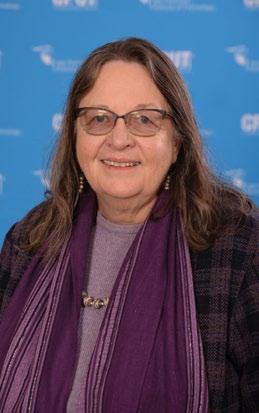
Prof Penelope Engels-Hill Dean of the Faculty

Teaching and Learning Coordinator
The pandemic presented all of us with a unique set of challenges and conditions in which teaching and learning needed to take place, which was especially true for the Faculty of Health and Wellness Sciences. As health scientists we are reliant on human contact, one of the biggest threats for transmission of Covid 19, which caused major challenges for some of our old methods of teaching and learning. Needless to say, we adjusted to the new environment, showed resilience and put new measures in place to ensure that the academic year could be saved. Some of those amendments will be covered in this report.
The year 2020 started off feeling quite normal in the sense that we had an opportunity to have face to face classes, welcoming of our students and even orientation of the first year students. All year plans were in place until we were hit with the global pandemic which brought about a new normal.
Suddenly we were no longer able to meet for face to face lectures, practicals were cancelled and then the country went into a hard lockdown, which saw some of our students who were placed in hospitals and other clinical sites prohibited from entering these facilities. It was then that the university responded with the introduction of the Carousel Model (Figure 1) which is basically a method for enacting multimodal teaching and learning. This model was approved by Senate and also presented to the Department of Higher Education. Suddenly CPUT, a contact institution, was then also granted permission for remote, non-contact teaching and learning until we had a clear way forward.
When presented with the Carousel Model, the Faculty of Health and Wellness Sciences embraced these modalities and adopted them completely. A new timetable was set for the entire faculty based on the principles of oneness and smartness as presented in the V2030 strategic plan of CPUT. Weekly meetings were held online which strengthened communication and kept all line managers in the loop during uncertain times.

In order to save the academic year, remote teaching and learning was adopted where content was divided into smaller lessons rather than providing copious notes that might overwhelm students. Lessons focussed on what outcomes needed to be achieved; what content would be taught to achieve the outcomes; how content would be taught; what was meant to be learnt; what self-study component was required, and what type of assessment should be completed. Learning materials were developed for each unit of learning to incorporate all these focus areas. For example, case studies offered students learning experiences where they had to apply concepts to their own contexts. It was important to encourage repackaging of the subject content so that deep learning was stimulated, not just sharing subject content for memorization. As such, online teaching requires a high level of lecturer preparedness, hence the need
to use the time before classes commenced to ensure that as far as possible, as many lessons were prepared beforehand. Any online learning preparation and materials produced at this time would inevitably support a blended learning approach in future (CPUT, Implementation Plan 2020).
The general consensus in the faculty was that a greater degree of flexibility and adaptability was required and with this understanding, various innovative methods were birthed out of these challenging times. To begin with, lecturers who had previously mainly used Blackboard (BB) as a repository, were forced to learn how to collaborate with students online, use BB announcement features and even moved assessments online. In Figure 2 below we see an example taken from the Dental Sciences department where assessments and feedback were facilitated in Blackboard.
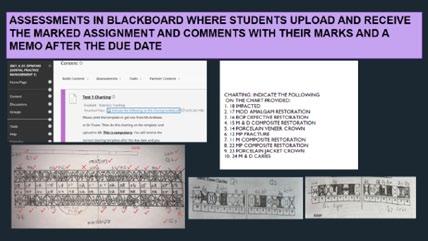
As mentioned earlier in this report, one of the biggest challenges for FHWS was the practical nature of our subject content. For the most part, theory is aligned to practicals to reinforce knowledge. In all departments lecturers recorded that under certain lockdown levels they had taken smaller classes according to venue capacity to adhere to lockdown restrictions. As a result, lecturers with bigger practical classes experienced burnout due to teaching the same practical several times per day which was followed by sanitization of venues and change of PPE where necessary.
To complement lectures and practicals, videos were uploaded onto BB and WhatsApp (see Figure 3). Lecturers attended regular training sessions hosted by CIET and received much support from Fundani.

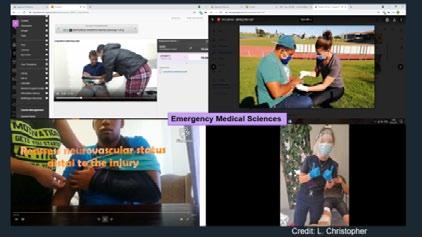
For the most part, remote teaching and learning brought on board new and positive experiences, though there were a few challenges which became difficult to ignore.
Although most departments used multiple sources to aid T&L, which included Zoom, MS Teams, Blackboard Collaborate and WhatsApp to name a few, some challenges were difficult to ignore. The first challenge was connectivity. In order to leave no student behind, it was top priority to firstly ensure that every student was reached and secondly, that they were connected.
Students became creative and made short videos of their practicals which were then uploaded onto Blackboard, as can be seen in Figure 4.
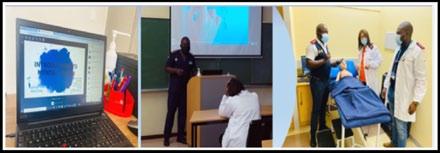
Source: K. Jooste
To overcome this challenge, lecturers made use of printed note packs and uploaded lectures and tutorials onto flash drives. More flexibility was shown especially with submission dates of assessments although a case-by-case approach was taken.
Other external threats included load shedding, which added to the strenuous learning environment. In some instances, lecturers were creative with presentations done online and provided various time slots specific to the student’s geographical region and time for experiencing load shedding. This meant that both students and lecturers had to sacrifice their time to make themselves available at different time slots, sometimes outside of working hours.
Other challenges addressed and teaching strategies adopted to assist learning environments include:
• Preparing students how to access BB and online learning platforms.
• Migration of portfolios which were traditionally submitted in hard copy to move to online submission onto BB.
• Learning materials were supported by video links, PowerPoint content was made available, as were tutorials and pre-recorded practical demonstrations to avoid overcrowding in venues.

Since the beginning of the 2020 academic year until end of June 2021, all departments indicated that they were still on track with all subjects. Three departments indicated that they would be engaged in activities during the vacation period of June 2020 and to date most Semester 1 2021 subjects have been concluded and marks have been signed off and submitted for upload.
Multimodal T&L and continuous assessment practice continues amid the challenges raised. The faculty aims to meet its T&L goals for AY2021 as far as it is possible, and despite the fact that times are still quite uncertain, we remain positive!
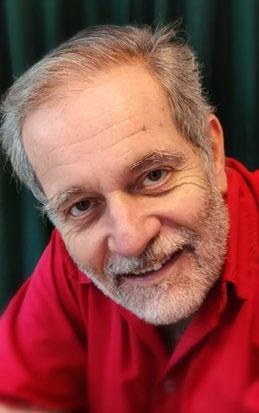
Prof
Dean of the Faculty

In the Faculty of Informatics and Design, most departments ready for online, blended remote teaching and learning using tools such as Blackboard and resources made available through LinkedIn Learning. The successful transition to remote learning however hinged on the provision of devices and data to students and the delivery of printed worksheets and flash-drives. Departments reported on various levels of readiness with some being reasonably well versed in the online environment. Staff from First Year Experience/Fundani and Library services support the academic and information literacy components of the subject. This is envisaged as a combination of synchronous and asynchronous teaching to enable questions and feedback to students.
In Surface Design contact and assessment was made to uncover student’s home circumstances. The outcome suggested Whatsapp as the preferred mode of communication and access. While working from home students were able to draw on paraphernalia of material to use for a creative process that is unfamiliar but will make sense. Brief and guidance on the process of creative development delivered over Whatsapp. The outcome was to prepare works to be handed over to professional services as previously done in the past. Several examples have been sighted where this worked-out well, helping to contextualise teaching and learning within the student off-campus spaces. To support students through the transition to remote teaching and learning a more flexible approach was adopted in terms of time, data, space, devices. Deadlines remained flexible. Looking at flexibility within subjects – as per suitability for online assessment. Some subjects were easier to teach online, more time spent on theoretical aspects. This will use a blended approach. Timelines and finishing rely heavily upon when the teaching recommences, as well as students’ access to data, devices and equipment

Fashion Design used Blackboard as far as possible due to the “no data required” benefit. Lecturers uploaded video clips and learning materials for students to access. An approach adopted in Fashion was a “make do and create” approach. An example of this has been shared here in the T-shirt design video (scan Figure 1 QR code with phone camera) where students use what they had access to in their home environments, in and around them, rather than buying materials and additional resources.
The Design department’s postgraduate programme’s supervisors provide support to student online via digital platforms such as email, Whattsapp and Blackboard. This mode of supervision and student support continues.
In Town and Regional Planning the Covid-19 pandemic brought the placement of students to a halt, the Department devised and employed an approach that combined community service-learning and work-based learning. The students who were not placed were required to simulate the world of work by being on campus on a daily basis as if they were going to work albeit the frequency was reduced so as not to contribute to the spread of Covid-19. This initiative commenced in August 2020 when a significant percentage of the students (i.e. 66%) across universities in the country was allowed to return to campus under the lockdown level and regulations applicable at the time. The university particularly ensured that students who were allowed on campus were given the necessary PEP in the form of face masks and hand sanitiser, and accordingly practiced social distancing on campus per the Covid-19 regulations and protocol. The crux of the alternative work-based learning approach was to systematically guide the students through the process of compiling a land-use application that would be submitted to the City of Cape Town municipality for consideration. The students worked on ECD application, which was considered to be benefitting the broader community, hence community service-learning. At the beginning of the process, one practising urban and regional planner went to the university premises to present a short lecture and facilitate a discussion on the land-use application process and the policies, regulations and by-laws that the students should take into consideration. An initial idea muted was that the discussion would take place at the offices of the planner as part of a simulation exercise, however, given the space constraints in the light of Covid-19 restrictions, a decision was taken to have the discussion on campus as there would be sufficient space for the requisite physical distancing.
The approach combined work-based learning and project-based learning modalities of WIL though the project in this instance was ‘real’. As a way of encouraging peer learning, the employed/ placed students were also required to work on the project, that is, in addition to other commitments at work. As such,
the task was issued to the students as group work wherein all students were expected to work closely as a team. The employed students were encouraged to get advice from the mentors (from different sectors) and provide input to benefit the classmates who were not placed in the workplace. With a melting pot of ideas and perspectives, it was anticipated that the entire class would receive varied insights from the NGO, private and public spheres.
Visual Communication Design reflection on Teaching and Learning for 2020 was undoubtedly the ability and tenacity of the staff to fast track themselves into online teaching from a position of very little, to no experience in some cases. The willingness, grit and long hours was hugely evident. The second highlight was the uptake from students who were thrown into an un-asked for situation and who also showed tenacity and willingness to engage and continue with their studies under incredibly difficult circumstances.
The big challenge for first year students as cited by Visual Communication was the varied ability to participate online. Some students were well set up, while others had very little at their disposal. Another challenge was that the first-year class groups had not got to know each other sufficiently in their short time on campus for them to be able to behave as a community and support each other while learning online.
The following are measures we put in place to assist students with their online learning experience and which we felt made a difference:
• Phoning each student to ask about their studies and their well-being.
• Teaching across a range of platforms Blackboard, WhatsApp and cell phone, Zoom or a combination of these. Used responsively according to the students’ needs in the group.
• Low data usage system for first years. Kept live sessions to a minimumrecorded for those with connectivity and data issues.
• Short video clips and/ voice clips for brief/project introductions and demonstrations.
• Use of a rapid marking system introduced for quick process feedback.
• Project briefs broken down into a number of small daily task to create structure.
• Project briefs simplified to essential outcomes.
• Projects took into account the lack of materials and technology at home. Working with available materials.
• Instructions on how to photograph work well for online hand in was created and made available.
• Some group work introduced to help create a sense of community amongst the students.
• Mentors on hand to assist students with issues they may have had in their coursework and other issues such as connectivity and personal issues.
• Class reps used extensively to assist with communication with the various classes and groups.
The above measures enabled many students to continue studying from home. Looking forward, some of these practices are being incorporated into face to face learning where it can enhance and assist the students. The importance of students knowing each other an interacting socially has been recognized as being crucial particularly for first years and was emphasized in planning orientation. The support that was shown from mentors and class reps was recognized and emphasized the importance of these structures within our teaching practice. For the second and third year students, the community of students was much more established and the students were able to assist each other in the online space. This was a positive aspect. Live online lectures and sessions were held and recorded for later viewing. This assisted those with connectivity issues and was good in case a student needed to revisit the content.
As a result of of Covid the workshadow interaction that third year students usually have with industry mid-year did not happen, particularly as the start of the online academic year was so late.
Some of the good consequences of online study was that students learnt to compile, order and present work digitally in a professional way. They also learned to be flexible and adept in the online world, working across a range of platforms and combinations of these. They showed themselves to be resilient and creative in solving problems.

The film production programme provides students with vertical learning through courses that engage key film production theories and skills. Some of our courses, such as Film Criticism and Scriptwriting, convert well to online and asynchronous learning. These courses are theory focused and therefore course materials complemented with online guided learning (either through live sessions or recorded tutorials) transfer with relative ease from on campus classes to online learning. Other courses rely predominantly on practical sessions in the studio and the edit lab. These are practice based learning that require the students to apply new knowledge and solve problems by using the resources that we provide on campus. 2020 lockdown presented serious challenges with regards to these courses. Our students do not have the resources required for them to apply new knowledge by practicing at home. We had spent a lot of time and effort to find solutions to these issues and were successful in part, mostly through changes that we made to the curriculum to facilitate distant learning. A welcoming video was created to introduce students to the programme as well as the lecturing staff and the subjects.
The following describes the Film Programme transition to online learning during AY 2020 and specific interventions.
SCRIPTWRITING COURSES (Prof Nic Theo):
All courses were transferred to Blackboard for asynchronous learning allowing students to conduct learning at their own pace and according to access to technology. Substantial reliance was made on Linked-In Learning and relevant and high quality YouTube tutorials to supplement learning. Course

materials were pared down to required reading/viewing and recommended reading/viewing, decided on the basis of the value and conciseness of the material, and on the size of files so students could maximise bandwidth. At the same time BB collaborate sessions were conducted to serve as both teaching and tutorial sessions, and are available on Blackboard after the fact for student support. Assignments were set in a way that they encourage incremental learning based on gradual acquisition of knowledge and skills. This was set in a way that allowed students to deliver the work according to their own schedule taking into account limitations on access to technology and bandwidth. Once assignments are submitted, students who have not submitted are followed up with individually. Multiple submissions are being allowed to make provision for incremental learning, with only the last submission being counted for marks
Because Media Criticism is a theory-based subject, it was slightly easier to transition this subject to an online environment than some of the practical subjects in the Film Programme. That said, the biggest challenges were around student access to devices, data and good reception (even when free data was provided and BlackBoard was zero-rated). Consequently, one of the first priorities was to make the learning content available in multiple formats, to accommodate different learning styles as well as different levels of online access. In addition, communication and feedback become more important than ever to facilitate learning.
For each week’s lesson, the lesson was released in two formats. The first was a PowerPoint presentation with audio to guide the students through the lesson. This would be exported as a video file, for ease of viewing on any device (even phones without PowerPoint installed). In addition, the same PowerPoint presentation would be exported as a text-only PDF document, for those students who were unable to download the slightly larger video files. For this reason, the PowerPoint lessons needed to be detailed, so that students who could only access the PDF version would not lose out on any key content. If any additional material was recommended in the lesson, like a reading or YouTube video, there would be a slide to introduce the material to the students – so that they have a clear understanding of why this content is being recommended to them and how it integrates into the lesson. The content would then be uploaded to BlackBoard
so that it would be zero-rated (this would mean downloading YouTube videos and re-uploading them to BlackBoard, rather than simply providing links that would redirect students to a non-zero-rated website).


With in-person classes being limited or entirely suspended, getting feedback from students and giving detailed feedback in return became crucial. For example, after the first few weeks of online learning in 2020 students were requested to complete a short survey in which they gave feedback about their learning preferences as well as suggestions for future improvements. In this survey the vast majority of students indicated a preference for asynchronous learning that would allow them to engage with the lesson in their own time, working around connectivity issues and personal circumstance, as many were now living in environments not ideal for study. They also indicated that the audio component of the PowerPoints was helping them understand the material. For their assignments they requested more detailed mark breakdowns and word counts, this feedback was taken on board for the next assignment brief. In addition, providing detailed feedback on written assignments was crucial, because without in-person classes this was the closest substitute for in-depth and personalized input.
One of the major challenges of online learning is to continue to uphold the sense of a learning community and encouraged sharing of ideas outside of the shared classroom space. Experimenting with small ways to encourage a sense of community between students: for example, asking students to vote for a film or a genre they would like analysed in class, and sharing student assignments with the class so that they read each other’s work.

In conclusion, the transition to online learning was quite a challenging one, and a process that requires a mixture of innovation but also emphasizes the importance of long-standing elements of teaching like content that is tailored for the learning level of the students, clear organization of learning content and a clear structure for the term, detailed feedback, and prompt communication. These things have always been important to effective teaching and learning, and these fundamentals become more crucial than ever in a very disruptive year. That is not to say that technological tools and innovations aren’t important, but with unequal access to devices, data and reception, such tools do not always benefit all students equally.
Finally, one area which needs greater attention is student mental health, which has been seriously taxed since the start of the pandemic. It would be immensely helpful for lecturers to receive more training on how to factor mental wellbeing into the way we plan and execute our classes, as well as guidance on ‘first response’ protocols if students raise issues (even on something basic like how to word a referral to Student Counselling in a way that won’t stress out the student).
CINEMATOGRAPHY COURSES (Mr Jurg Slabbert)
Overview:
One of the biggest challenges faced as a cinematography/production lecturer was to shift a subject that has a very practice-based focus, to a purely online platform during 2020. Initially this wasn’t a problem as such, as we could shift our focus to theory. However, as the year went on and assignments had to be done, we had an urgent need for practical based contact class with students. Students faced many limitations such as no or little access to data, camera gear or even a laptop to do their work on. Unfortunately, this was evident in the work at many of them submitted.
Interventions:
Pre-recorded classes
One way I tried to manage all of these issues, was to create pre-recorded classes which was uploaded to Blackboard, the CPUT online learning platform. Students had serious issues with data and connectivity, even if they had access to a laptop via friends or family. We also made use of WhatsApp groups to communicate. In this way, students had access to subjects, class notes and also film clips. I did not make attending classes mandatory for reasons mentioned above. However, students did engage, mostly during the hours of midnight and 5 am. This is when they had free mobile data to use.
Adapted assignments
With this in mind, I tried to create assignments where students had at least two options. The first option was usually a more practical based assignment, and the second option had a more theoretical approach. I also encouraged students to use any gear that they could get their hands on; mobile phone cameras, laptop cameras, DSLRs or any other photographic equipment. I tried to encourage them during a very difficult time and to stay as creative as possible.
Online guest lectures, resources & CPUT Film Webinar
One way of keeping students inspired was to record an online masterclass with working film industry professionals. I also uploaded this to Blackboard. Furthermore, I uploaded as many resources as possible. One specific example was the film department’s webinar on the South African Film Industry and
Covid-19. (This has been uploaded by my colleague and co-moderator of the Webinar, Dr. Kristina Graour.

Eran Tahor)

Similar to our cinematography courses, Post Production courses split at about 30% theory and 70% practice ratio. Students are engaged at various complexity levels (that commensurate with their level of study) with practical problem solving, applying knowledge to construct complex creative projects, peer learning and guided application during live sessions in the Edit Lab. As we cover a wide range of post-production practices in order to complete the many film projects that students engage with (either individually or in groups) in terms of sound editing, narrative picture editing and effects it is important that students access to the editing computers in our lab.
Lockdown presented a critical problem with regards to students’ access to resources on campus. This is exacerbated since the overwhelming majority of our students do not have access to computers at home, at least not the type of technology that is required for video editing.
In order to deal with this issue I transformed term 2 and the most of term 3 curriculum with a focus on theory. This enabled the students to access reading and viewing materials on Blackboard which they could using cellular phones, tablets and devices that are not suitable for the practice of video editing. This enabled us to complete most of the theoretical components of the curriculum and go further into next year level theoretical topics.
Multiple assignments were created for each term to provide written and practical options. While each assignment engaged in the main topics that were covered during the term, students who chose the written option could use computers to write essays, sequence shots on a theoretical timeline and construct written responses to creative tasks using devices that they do have access to but which are not suitable for video editing.
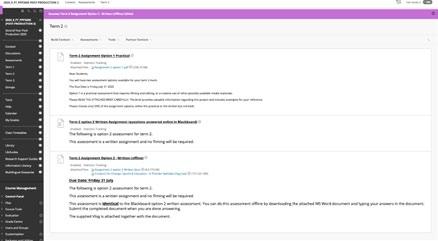
1Assignment options in Blackboard: practical, written submission and online submission that accommodate students’ needs and access to resources
During terms 2 and 3 we explored free online alternatives to our lab based software. These online alternatives, while not meeting professional standards of production, enabled the resumption of practice with the limited resources that most of our student did have access to. I encouraged students to report back and share their exploration and discoveries of free online video editing resources in our course discussion forums. This process enabled building new knowledge and opened the way to peer learning during the long period of physical distancing.

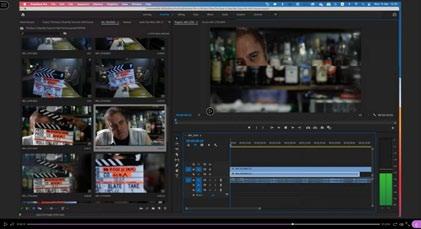
Asynchronous learning was supported by breaking each term into weekly topics and making the materials for the entire year course available in weekly folders on Blackboard . Each week contained shorter reading and viewing materials in order to cope with data restrictions and the lack of appropriate learning space at home that some of our students reported on. LinkedIn Learning tutorials were used extensively during AY 2020 across all levels of study Students reported to me in our live sessions that they went beyond the prescribed course tutorials to explore a range of other interests in post-production, such as animation and colour grading. This creates and opportunity for students to specialize, especially during exist level courses, and develop their work readiness in areas of film and video post-production that are of interest to them.
With the commencement of the 2020 academic programme, none of us were even considering the severity that the COVID 19 pandemic would have on the Teaching & Learning programme. The announcement by President Ramaphosa in March brought everything to a standstill. With the crisis looming, the academic programme eventually had to resurface.
The academic and administrative staff of the programme continued to be proactive in engaging students during the lockdown. We wanted to reassure our students that we would return to some normalcy but would be guided by institutional regulations and processes, once it became available.
In order to prepare for the return to “class”, academic staff underwent hours of workshops and online teaching practice to prepare for these T&L modalities as to ensure that students are best prepared and that the curriculum is covered. Staff have been engaging beyond the “core” working hours as this “new normal” has demanded continued engagement to ensure the effectiveness and success of the academic programme. Enhancing Blackboard skills and moving to the online teaching environment proved to be challenging for some academics but most transitioned with ease as support from CIET was phenomenal. Staff also underwent training offered by CPUT HR, Library and Post-Grad Unit.
The orientation programme for the first year students took place as normal as contact sessions were in place. We are grateful that this exciting programme could be applied in the contact space as it allowed for students to engage face-to-face and build connections before the lockdown hit. These were done through the Teaching & Learning activities, and especially the “Amazing Race” which is a group scavenger hunt. See attached the First Year 2020 Orientation Programme.
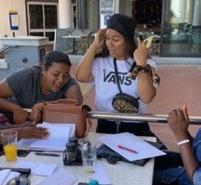
In order to facilitate the transition from contact classes to online classes, the timetable had to be revised. We scheduled only two classes per day for the Diploma Course. For the Advanced Diploma were introduced “Block Teaching” which allowed students the opportunity to focus on one subject for a period of time and “write it off”.
The WIL programme had to be reviewed as the industry was also impacted by the pandemic and lockdown regulations. Some students continued their internships by working from home, others opted to complete the WIL subject through project based work. The Service Learning programme continued but students worked online and engaged with creating digital and electronic outputs for the Non-Profit organisations they worked with.
The syllabi was amended to ensure that content is relevant applicable to new learning modality – asynchronous and synchronous modalities. Assessments were also redesigned. Students were not penalised for late submission of assessments and were afforded further opportunities for engagement. Continuous engagement took place through BB, email, class reps and some staff use WhatsApp.
Consultations were mainly conducted through email and BB Collab. Students also received licences to access training programmes on LinkedIn Learning to complement that academic learning and T&L course activities.
This took format for engaging with guest lecturers took off effectively in our programme. Three guest lecturers (Industry professionals and two alumni) presented to first and second year students respectively on the following topics:
• Media Writing & Content Generation
• PR Campaign Management
• Writing for the Media
The Media Department also transformed the annual Media Conference event to the digital BB Collab platform. Each programme coordinated a webinar/online conference which aligned to the Department Theme: MEDIA IN CHANGING TIMES.

The PR sub-theme was – “The PR Industry Reimagined: Innovation in a time of crisis”. The industry speakers were Victor Viviens (Co-Founder and CEO of the new Bottles Online App), Catherine Luckhoff (Co-Founder and CEO of 20FIFTY Digital Company) and Sibani Mngadi (Corporate Relations Director at Diageo).

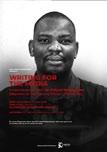

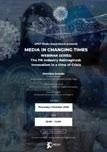
We used Tutors, a mentor and Teaching Assistants quite effectively throughout the year. We believe that without this support the programme throughput would not have been this effective. The programme is still 100% online utilising synchronous and asynchronous Teaching & Learning activities. Lecturers are still engaging with online training courses and LinkedIn Learning continues to be a support tool to the academic programme. The webinar series has continued to having regular guest speakers and workshops offered by alumni to aid the T&L programme.
As the result of the student protests and lockdown, the University initially embarked on online teaching and learning activities, such as using various online tools/medium (Blackboard, e-mail, WhatsApp, and any other medium that was thought as helpful)
Initially, until about the lockdown was enforced by the government, all theoretical subjects were on par with regard to teaching and learning activities and our syllabus; nevertheless, all these subjects were affected as many of our students did not have access to data / Internet.
Subjects that have practical components (such as TV and Radio Production, Edit and Design) could not be taught online until the lockdown was eased, as they all needed devices and software; The same applies to some modules that require on site practical component (such as Courts and Crime; Political Reporting; Business Reporting, Edit and Design). Therefore, all the subjects that have practical components were at risk subjects. We have also continued online learning for those who cannot come up due to various health and household reasons. First semester assignments have been provided to students, and approximately 75% of students have submitted these assignments, through Blackboard. The remaining students were given the option for late delivery once campus returned after lockdown. Some students were given deferred assessments.
As per the Government regulations, the remaining students 66% of students’ mainly first and second year students were provided lessons through online learning. Adjusted curriculum has been delivered online, and assessments were given online. No memory sticks were provided, since all learning is delivered online. It would have been impractical to deliver memory sticks to the many students who live in hard to reach places, especially in the rural Eastern Cape. 3rd and Advanced Diploma students have been advised to come to PC Lab to continue working if they were around.
Overview of phasing out of lockdown in higher education and CPUT’s position
The University Executive Management urged all Lecturing staff to suspend all online teaching and learning activities and assessment until the lockdown ends. This was done in line with the Minister’s approach of Phasing out of the Lockdown in Higher Education Institutions. To quote from the Minister’s document, “Guided by the work and decisions of the National Command Council, we have decided not to resume with campus-based academic activity throughout… all Universities and TVET Colleges, both public and private, during the Level Four (4) lockdown period.”
Some students would be excluded in the teaching and learning activities due to access.
The mental well-being of some students are affected due to household situations and the study from home itself.
The Zero rated data for all mobile networks was not initially working except for Telkom that has worked for some students and not working for others. The university informed us that the Executive Management was negotiating that with
all mobile networks. Eventually, access to data was made a reality except that some students suffered due to lack of access to proper devices to follow up on their studies and do their assignments and tests.
Course outline – we were informed by the Teaching and Learning committee to amend our course outline to suit the current online learning. There was training on this on 06 May 2020 in which all staff participated and adjusted their course outline and assessment structures.
Yet, some of our students have suffered due to lack of proper devices to follow up their online studies, and do their assignments. The subjects that required software were negatively affected.
Interventions introduced for leaving no student behind
• Assessments have been adjusted to be delivered online, with practical’s to take place when students return to campus. No student would be penalised for late delivery of assignments. But, 3rd year and Adv. Diploma students were advised to come to campus and complete their practical components.
• Each and every student who was behind has been advised on individual basis (via e-mail and students reps) to submit their assignments.
• Communication is being maintained through WhatsApp and Blackboard, and via class reps. Open channels were maintained at all times
• Students were provided online support through BB Collaborate and chatrooms, and through individual attention through WhatsApp, email and other online communication channels. Assistance has been offered even during December holidays. The programme coordinator has been available for students who needed help during December holidays.
• The programme has been redesigned for multimodal learning- students meeting in small groups on campus (for the first 33%) and online through chatrooms, WhatsApp groups, BB Collaborate, Zoom, and Teams (for meetings)
• We have communicated to students to communicate with each lecturer to update on their academic challenges and their assignments submission status.
• Each lecturer has been communicated to follow up with their students (esp. those with at Risk) and encourage them to follow assignments submission.
• Deferred assessments were allowed in January 2021.
• Staff have been participating in various trainings that are pertinent to the current lockdown situation. Training on BB, Teams, LinkedIn were provided.
• A Webinar was organized and conducted in July 2020. Three media professionals were invited on this.
• Two Staff were approved study leave, by the institution. Charles King and Sisanda Nkoala. They are busy with their PHD.
• Almost 95% students qualified for WIL placements; all completed. The last student who did not qualify completed during the beginning of the 2021.
An advisory board committee meeting was held on 05 May 2020. Please find Annexure A on the report.
Accomplishments
• Presented at the African Digital Humanities Programme virtual workshop by the Wits Institute for Social and Economic Research (9 July to 11 July) on “Digitising the South African Black Press as a tool for a decolonial, multilingual and transdisciplinary archive” (Ms Sisanda Nkoala)
• Awarded a grant by the Mellon-funded African Digital Humanities Programme for my research project “-Digitising the South African Black Press as a tool for a decolonial, multilingual and transdisciplinary archive” (Ms Sisanda Nkoala)
• Mare, A. & Matsilele, T. Hybrid Media System and the July 2018 Elections in “Post-Mugabe” Zimbabwe. Social Media and Elections in Africa, V (1).
We are making use of the new technologies (Blackboard, LinkedIn, Microsoft Teams, and Zoom) in our delivery of teaching and learning activities. Journalism staff are very much involved in research and development, participate in international forums/conferences. We are also inviting students to come to class on face to face basis but with all the Covid protocol observed. The practical component is paramount importance for face to face learning (TV Production, Radio Production, Edit and Design, Advanced Broadcast Production).
Our main focus for this year is the retention of students and achieving high throughput rate. In order to do this, we have employed a Teaching Assistant, Ms Soligah Solomons and a retention officer, Ms Sibulele Mdleleni, six tutors and mentors each assigned to work with certain subjects and lecturers. All are trained to equip them with the duties and responsibilities.
Additional support
The Journalism Programme has been running a Speaker Series for the TV Production students which has aimed to fill the gap left by the fact that the production students can no longer go on field trips. The series has featured leading industry professionals who have come to address students, providing them with an opportunity to network with them virtually. The project was recently featured on the institutional website (https://www.cput.ac.za/newsroom/ news/article/4246/speaker-series-empowers-aspiring-journalists)
In terms of WIL, we are currently in a process of engaging with key industry players in preparation for internship placements starting in the second semester (July – Dec). We have three (3) students who are already working in the industry as interns for prominent media houses such as Media24 and Independent News Media. In addition, five (5) placements have already been confirmed to commence in July.
We have hosted two webinar sessions in collaboration with CPUT Student Counselling focusing on the following topics;
- Term 1: Preparing for an interview
- Term 2: Building Positive Workplace Relations
We have additional webinars lined-up for the forthcoming few weeks before we conclude this semester. These guest webinar series will feature the National Youth Development Agency (NYDA), Department of Labour (DoL), Bush Radio, GroundUp, Workers World Media (WWM), Cape Town Magazine, and many more relevant entities to ensure our students are ready and fully prepared for practice.
Almost the entire Photography programme was taught on-line, and to that end we have revised/redesigned our curriculum to fit this mode. All Theoretical and Practical classes are presented online. Within the on-line classroom, both synchronous and asynchronous learning is being implemented. Recordings of classes are made available so that learning can be accessed at different times. Additionally to the content in BB, the notes are also made available via WA, if specifically asked for by a student.
• We found attendance for the on-line presentations to be majorly varying. Sometimes 80%+ attendance, other times hardly 30% - we have not identified any discernible pattern, other than variable wi-fi connectivity.
• We became more lenient in terms of hand-in times and attempts, and allow the students multiple attempts, until such time when a certain, acceptable level of expertise has been reached.
• A variety of presentation modes are utilised, such as Power Point, You Tube videos, self-recorded videos, showing of own work, previous students’ work, alumni work and professional work (many times from our alumni).
• We started to utilise a PC lab on the Roeland Street campus for some of the Photoshop teaching. It was mainly the students with no computer and/ or software that attended.
• We have allowed the use of mobile smart phones as an interim arrangement. Although it enables participation to a certain level, it curtails the learning experience because of the limitations offered by the phone. In that regard the students are not getting the full experience and we are continuously encouraging them to buy a DSLR camera. Part of the problem is exacerbated by delayed NSFAS pay-outs and other personal financial issues (many COVID related).
Outside of the classroom - interaction with students outside of the formal teaching and learning space:
Student retention and throughput are two major concerns and drives for the programme. To that end, we have appointed three tutors, a mentor and a retention officer, to assist us with the drive to increase on our past teaching and academic achievements. We receive regular feedback from these individuals and are already seeing an uptake from especially the 1st year students, reaching out to the student staff.
As a staff compliment, we are available, most of the time. We communicate, outside of formal class-time and after hours, via BB, email, WA and personal telephone calls.
A very successful webinar series was held in 2020, and many of our students attended. Staff are attending many on-line offerings from CPUT and are upscaling their knowledge where and how possible.
We hope to be moving into our ‘new’ facilities at D6 quite soon. Our students need studio space and equipment to complete many of their assignments, in an area that is well ventilated, clean and conducive to learning. Many of the practical assignments happen outside, in the open. Many assignments also need to happen in a studio environment, and many students have created makeshift studios at their homes.
It has also become increasingly more important that we continuously re-align, relook and ensure that our offerings remain parallel with what the current trends are. We should be in a position where we can help predict new trends, and move with that. Influencers and the mobile, smart phone ‘phenomenon’ are quite relevant, at this time, and it is necessary that we off-set that, with what we teach at CPUT, supported by a high-level, entry into professional photography, providing the imagery required, underpinned by a strong basis of Theory.
The incorporation of Videography into our offering has become imperative, and we need to expedite that process.
3.1 Fundani Centre for Higher Education Development (CHED)
3.2 Centre for Innovative Educational Technology (CIET)
3.3 Centre for Professional and Personal Development (CPPD)
3.4 Work Integrated learning
3.5 Library
3.6 Strategic Initiatives and Partnerships (SIP)



In 2020, Fundani CHED reported directly to the DVC Teaching and Learning Prof Balkaran, in the absence of a Director. The recruitment process was successfully concluded in December 2020 with the appointment of Dr Xena Cupido.
In response to the exigencies of Covid-19 lockdown, the Student Learning Unit (SLU) implemented a number of interventions to support students’ transition to remote teaching and learning. The unit developed guidelines to assist students and staff to access our services. This started with a Frequently Asked Questions (FAQs).

Information with regards to Academic Literacy and Mathematics consultation access was shared with the broader university community. A SMART Guidelines booklet provided tips for planning, preparation for flexible learning, active participation, engaging lecturers online as well as how to access the Student Learning Unit. This was supplemented with further digital academic literacy materials such as technical report writing, academic literacies and strategic literacies. This material was designed to enable students to self-direct and selfactualise, as they exercise autonomy during remote learning. Additional multilingual materials were developed to assist students with epistemological access, deeper connection and understanding. SLU created OER material in form of a poster and pull out banners. All materials are available at the Student Learning blog and Blackboard Page (2020 Student Learning Unit).
Tutors and teaching assistants continued to be trained online and appointed in faculties to support the academic programme. In addition, Blackboard workshops were developed to capacitate students to provide peer support
online. The numbers of tutors and TAs trained show that faculties continued to rely on the support of students. Faculties that would traditionally not make use of academic literacy development explored new ways of working together.
Tutor development workshops transitioned online for students to continue to provide the peer academic support needed during remote teaching. These workshops were amended to incorporate additional skills, capacitating tutors to facilitate tutorial sessions online. Since reopening on 1 June, nine tutor development workshops were offered and a total of 169 tutors attended. The tutors played a critical role supporting academic staff and students during this time. According to work study, a total of 252 tutors were appointed up until December 2020 with 50% of students appointed in the Faculty of Applied Sciences and the Faculty of Business Management Sciences.
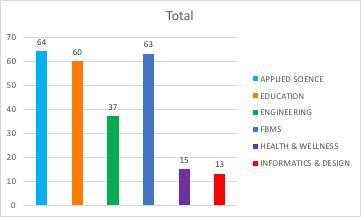
Teaching assistants were in high demand this year as academics prepared to redevelop courses/modules and subjects for a blended offering. A total of 95 TAs were trained over 8 sessions in 2020.
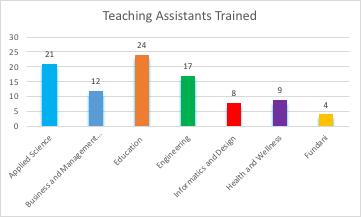
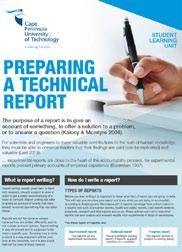
The teaching assistant programme continued to be supported at CPUT.
BTech, master’s and PhD students were employed on a part-time basis to help deliver this teaching load, traditionally as laboratory, practical and field class demonstrators, supporting tutors and tutorials. Departments have come to rely heavily on this cohort of part-time teaching assistants, who are typically well motivated, have at least sound subject knowledge and acceptable proficiency in teaching, are invariably cheap to employ, and tend to be adaptable and flexible as employees. Additional workshops were developed to capacitate students to work online. The
workshops focused on the use of Blackboard Collaborate in peer academic support sessions, developing teams online, conducting discussions, sharing information and documentation as well as using the Grading Centre.
The academic literacy sector organized and facilitated generic online workshops based on its 10 week programmes. The sector continued to provide academic literacy support; developed closer working relations with subject-specific lecturers; and embedded academic literacy support within courses. For instance, the Faculty of Business Management Science (Project Management) and Hospitality Management (Research Methodology) requested a series of tailored workshop interventions to support the academic writing development of their students. We facilitated online consultation through the emailing system. Students preferred to use emails than a Blackboard page that was created for them.
The mathematics sector continued to show growth as a number of faculties and departments making use of the support increased. A total number of 12 mathematics learning facilitators/teaching assistants were appointed to bolster the support. The mathematics sector developed a model to work alongside subject-specific lecturers to customise the support provided to students. A mathematics diagnostic tool was developed in conjunction with students and staff. The tool will be most useful in developing targeted interventions to support students’ mathematical needs. Additional blackboard workshops were offered to learning facilitators to support students online.
The unit conducted weekly meetings to develop an academic support and development strategy, which started with 1) development of digital materials; 2) online tutor and teaching assistant development; 3) online academic literacy

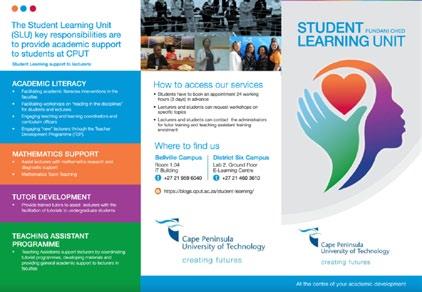
development and support; 4) mathematics development and support. The student learning blog and Blackboard page were updated. Digital resources were created to support the transition to remote learning. A SMART Guidelines booklet provided tips for planning, preparation for flexible learning, active participation, engaging lecturers online as well as how to access the Student Learning Unit. This was supplemented with further digital academic literacy materials such as technical report writing, academic literacies and strategic literacies. This material was designed to enable students to self-direct and self-actualise, as they exercised autonomy during remote learning. In addition a student learning brochure was designed and distributed to students during remote teaching and learning. Multilingual materials were developed to assist students to scaffold their learning. To support students, especially first year students entering into higher education, the SLU created OER material in form of a poster and pull out banners. All materials are available at the Student Learning blog and Blackboard page.
The recognition of prior learning (RPL) process, which is an alternative route for access to CPUT and the granting of exemptions, became paperless in 2020. Besides the fact that the RPL is detailed and complex process, until 2019, it was also paper-based. Due to Covid-19 and the subsequent lockdown, the paperbased process had to be changed to an electronic process.
The RPL Unit in consultation with Admissions and Registration Centre (ARC) and CTS, developed and implemented an electronic system. The system is based on a shared folder within the CPUT cloud. The shared folder is administrated by the RPL Unit. This shared folder accommodates all the RPL applications per year, uploading all documentation as received from the various parties involved in the process. The RPL process had within a matter of weeks changed from a manual, paper-based system to an online system in line with the SMART strategic vision of CPUT
Further, the knowledge enhancement workshops which were held face to face in the past also had to move online using appropriate platforms.
The RPL process was delayed due to Covid-19 and was only concluded in February 2021. The access tests were conducted face to face during November with the portfolios of evidence being due at the end of November. CPUT received a total of 279 RPL application in 2020, as per the table below:
The RPL process was greatly enhanced last year and benefitted from the technology available not only at CPUT, but also worldwide developments in information processing.
DHET approval of hybrid Bachelor of Nursing for 2021 and ongoing approval of new ECPs
The ECP unit in partnership with the Department of Nursing developed a hybrid Bachelor of Nursing extended programme. This is the first of its kind at the institution and features a two-pronged approach to supporting students through the use of two models, namely extended and augmenting models. The rollout of the qualification will be closely monitored for research purposes to establish its effectiveness. In addition the ECP unit is in the process of facilitating the approval of the following new ECPs for 2021 and 2022:
• Diploma in Engineering Technology in Computer Engineering
• Diploma in Engineering Technology in Electrical Engineering
• Diploma in Agricultural Management
• Diploma in Agriculture
• Bachelor of Environmental Health
The ECP unit are recipients of Michael & Susan Dell Foundation funding which has been allocated to a proactive life coaching project aimed at supporting extended programme students during the lockdown period. Three qualified life coaches have been appointed to facilitate online small group and one on one life coaching sessions to 107 ECP students across five faculties. Life coaching views participants as fully capable of creating a positive outlook and reality for themselves.
The ECP unit also cemented a partnership with the institutional Student Counselling Unit for the purpose of smooth student referrals for the duration of the project. The ECP unit submitted an abstract to HELTASA 2020 to showcase the preliminary results of the project. The ECP unit has also appointed 6 academic tutors to provide discipline-specific support to extended students.
The ECP unit in collaboration with CIET facilitated a webinar in June on printbased learning materials development. The webinar was well attended. The ECP unit developed a rubric and checklist for evaluating learning materials.
The regional partner institutions (UWC, SU, UCT and CPUT) hosted a joint virtual regional seminar for the first time in the history of the partnership. The seminar was aimed at extended programme academic staff members across the Western Cape and focused on support mechanisms for ECP students and lecturers during the Covid-19 pandemic. Two panelists represented CPUT, namely Ms Tauhieda Brandt (Faculty of Business and Management Sciences) and Mr Simphiwe Dumengane (Faculty of Informatics and Design). The seminar was well attended and well received by the participants.
The ECP unit also participated in a 2020 Writers Retreat from 16–18 November 2020. The opportunity was made available for ECP lecturers who submitted abstracts for a special issue of Education as Change or for the HELTASA 2020 conference.
The ECP unit disseminated a Google Forms-based questionnaire to ECP lecturers to ascertain the challenges faced by both lecturers and students during the pandemic. A total of 52 extended lecturers responded. The questionnaire was not intended for research purposes. Lecturers noted that the shift from face to face to remote teaching was overwhelming, stressful and challenging for students. There was a heightened awareness amongst lecturers that the provision of focused academic and non-academic support to students at this time was crucially important. Lecturers also indicated that they required support. Lecturers responded to student needs with compassion and care, offering support beyond core academic hours.
The ECP unit embarked on a collaborative research project with the Department of Biomedical Sciences. The research focused on how extended programme lecturers have re-imagined their assessment practices to accommodate students during the Covid-19 pandemic. At the time of writing, lecturers had completed a questionnaire and participated in one on one interviews. The preliminary results were captured in an abstract which was submitted to HELTASA 2020. A staff member in the ECP Unit facilitated in the Assessment in Higher Education module.
FYE activities were facilitated online and in collaboration with participating departments.
RO and mentor training: Since mentors and ROs were trained to provide face to face support to first-year students there was a need to train mentors and ROs to provide online support though some were already trained to provide online support. During lockdown 24 new mentors and 3 new ROs were trained online. Mentor coordinators were appointed to monitor mentors’ online engagement with first year students and collate all the reports submitted by mentors and ROs to identify challenges faced by first year students and address the identified issues.
Meetings: online FYE meetings were held with the FYE team, ROs and mentors to discuss issues affecting first-year students. An active and vibrant WhatsApp group was set up where mentors and ROs engaged with issues pertaining to supporting first-year students.
Administration: During lockdown all appointment, claim forms and reports were submitted online.
Unstructured integrated provision: different lecturers (who were teaching different subjects) requested specific topic(s) to be facilitated for their students. This approach was successful, especially in the context of the current lockdown and online learning. New topics were requested to meet new challenges, and this contributed towards improving the content of CPUT 101. The following are some of the topics being facilitated in all faculties as part of the unstructured provision of CPUT101: Studying online (use of online platforms for learning), Time management and Goal setting, Gender-based violence, Dealing with depression, Compiling an e-portfolio, Using Blackboard for online assessments, Self-motivation and Career orientation. These sessions, facilitated using Blackboard Collaborate or MS Teams, contributed towards easing the pressures and stress for many first-year students who were feeling lost in despair because of the sudden changes to learning and social engagements caused by Covid-19. Where necessary, especially in terms of topics like gender-based violence and dealing with depression, the relevant experts from Student Counselling Unit and from outside the University were invited to provide support.
Online material development - The following were developed during and made available to students through the FYE Facebook via the CPUT website:
• Understanding the online environment
• Meeting/lectures online
• Understanding Covid-19
• Time management during lockdown
• Coping with Assignment Pressure during lockdown
• Ethical assignments during lockdown
• Time management
• The Constitution
• Using online resources
• Staying healthy
• Tutors and mentors
• Referencing images and videos
Structured integrated provision: Some departments maintained the usual model whereby a selection of six or more topics were covered and assessed during a term.
The institutional induction programme provides an excellent networking opportunity for newly appointed academics. It also provides information about the role of the various units within Fundani CHED to create awareness of the staff and student support programmes that are available at the institution. The CIET staff also do presentations on Blackboard and other online platforms that are available to academics. This programme is usually offered in face to face sessions but was offered online via Microsoft Teams on a date to be decided between June and October 2020. The programmes that Fundani CHED offered to support academics in multimodal delivery formed the main thrust of the induction programme. This was done to prepare newly employed academics for a changing higher education landscape that was brought about by the Covid-19 pandemic. Thereafter, they were expected to enrol for the Teaching Development Programme (TDP), which is a more structured programme (see subsection 2.2). They could also register for the Postgraduate Diploma in Teaching and Learning in Higher Education (PGDip(T&L)(HE) (see subsection 2.3).
The TDP, which is mandatory for all newly appointed academic staff, was offered through online and face to face sessions. The aim of the TDP is the enhancement of academic teaching, learning and assessment practices. Constructive alignment (explained later) underpins this programme. The summative assessment constitutes the development of a teaching portfolio. The TDP addresses multimodal delivery of teaching and learning, and assessment in future programmes.
The goal of the PGDip (HE)(T&L) is to professionalise teaching in higher education and to build capacity among university teachers, in the field of education. It is offered collaboratively by three universities in the Western Cape: Cape Peninsula University of Technology, Stellenbosch University, and the University of the Western Cape. The PGDip (HE)(T&L) comprises three core modules: 1) Teaching and Learning in Higher Education (TALHE); 2) Assessment in Higher Education (AHE) and 3) Research for enhancing Teaching and Learning. Candidates must also choose an elective module from a list of the following: 1) ICTs for teaching and learning; 2) Citizenship, Social Inclusion and Difference; 3) Academic Leadership and Management; 4) Postgraduate Supervision; 5) Service Learning and Community Engagement; 6) Work and Learning; 7) Recognition of Prior Learning. In the planning of the TALHE module, the Semantics Dimension of Legitimation Code Theory was employed to ensure that there was a tangible link between theory and practice. The creation of semantic waves foregrounded the presentations at the contact sessions and was an integral component of the assessment tasks. Semantics is comprised of the code modalities of semantic gravity (SG) and semantic density (SD) (Maton 2014). Semantic gravity refers to the degree to which meaning relates to its context and can be strengthened (SG+) or weakened (SG¬¬¬-) along a continuum where meaning is more related to its context in the former and less related to its context in the latter. Semantic density pertains to the condensation of meaning and can be strengthened (SD+) or weakened (SD-) along a continuum; fewer meanings are condensed in the former, and more meanings are condensed in the latter (Maton, 2014). Constructive alignment also underpins the design and delivery of this module.
Constructive alignment speaks to the synergy between the ‘intended learning outcomes’, the ‘teaching and learning activity’ and ‘assessment’. During this process, the student is an active learner who constructs his/her own meaning rather than being a passive recipient of information (Biggs and Tang 2011).
The PGDip (HE)(T&L) programme is offered through a blended learning approach involving contact sessions and online learning. The TALHE module which kickstarted this phase of the programme started with a contact session in February
2020, followed by online learning from February to June. The in person conference presentations that candidates were required to do in May were replaced by online presentations due to lockdown regulations. The future conceptualization, design and implementation of the TALHE module will encompass multimodal teaching and learning in a bid to keep abreast with new educational demands. This will not simply entail the application of blended learning in the delivery of the module but a focus on the adoption of multiple modalities by candidates within their own pedagogical practices as well. This will provide a two-pronged approach to multimodal delivery development.
Academics who do not want to commit to lengthy, structured programmes will have the choice of attending ad hoc workshops. The goal of providing ad hoc, non-formal training for academic staff, in the area of teaching and research, is to expedite the continuous professional development of academics so that they are at the cutting edge of teaching, learning and assessment in higher education. Table 2 shows the ad hoc workshops that were offered. In response to the need for training in multimodal pedagogies, ad hoc workshops on ‘case-based learning’ and ‘facilitating online learning’ were provided. The former workshops focused on the contextualisation and conceptualisation of knowledge and drew on the principles of semantics within LCT. The latter workshop also drew on semantics and focussed on the explanation of difficult concepts online to enhance self-directed lifelong learning. Furthermore, workshops on online assessment and psychosocial support for academics were also offered. Faculties can also approach Fundani CHED for other workshops, e.g. problem-based learning and research-based learning.
Academic staff were given guidance and direction in the development of teaching and learning materials. The workshops focused on the development of print materials and assessment.
The Student Feedback on Teaching and Courses (SFTC) project aims to obtain feedback from students regarding lecturer performance and courses. The data is used for developmental purposes only so that lecturer performance and courses can be improved. During the roll-out of multimodal deliveries, obtaining feedback from students enabled academics to optimise their teaching. The SFTC surveys are done online via Google forms and Respondus. Lecturers had to be trained to develop the student feedback surveys.
These workshops were previously implemented face-to-face and were later offered online via Blackboard during the pandemic. A podcast was created for lecturers via Blackboard collaborate, allowing them to access the training asynchronously. A PowerPoint presentation on creating a Google forms survey and a word document was posted on the Blackboard platform explaining the process.
The question data bank used for face-to-face teaching had to be adapted to an emergency remote teaching and learning question data bank. Lecturers focused on new and changed teaching approaches, which consisted of emergency remote teaching and learning via online platforms.
The following activities were undertaken during 2020:
• The development of the Blackboard Student Feedback platform for lecturers.
• The creation of a podcast to include the changed teaching approaches of lecturers, i.e. emergency remote teaching and learning.
• Including questions in the data bank that reflect emergency remote learning and teaching.
• Including questions in the data bank that focus on the affective factors such as how lecturers and students are dealing with learning in the context of the pandemic.
• Contacting teaching and learning coordinators to inform them about the online workshops.
• Contacting departments to access the Podcasts and to create surveys.
• Arranging the due dates of the survey reports with lecturers and HODs.
• The creation of synchronous and asynchronous student feedback workshop presentations.
• Student Feedback reports were submitted to lecturers and HODs.
• Faculty Student Feedback reports submitted
The Curriculum Development Unit (henceforth, CDU) worked in collaboration with the Centre for Innovation in Educational Technology (CIET) and Extended Curriculum Programme (ECP) in assisting academics to develop best online pedagogic interventions in response to the challenges brought by the outbreak of Covid-19. Through this collaborative approach we were able to provide support and helped academics in developing equitable and just pedagogic interventions.
Our joint interventions were guided by the following principles
• Access to curriculum content
• Inclusivity
• Ubuntu
• Shared democracy
• Student engagement
Collaborative academic staff development programme covered the following topics
Course design principles
• Introduction to course design.
• Exit level outcomes as guiding principles for quality and progression (depth versus breadth).
• Constructive alignment.
• Flexible learning.
Storyboarding for print-based material
• Personas – focusing on the no/low tech persona (based on student access survey data).
• Ways of learning – but with no-tech/low-tech.
• Formative assessment – storyboarding activity (www.padlet.com).
Print-based content development
• Pedagogical underpinnings: Kolb’s Learning Theory, and associated learning styles.
• Concrete experience.
• Reflective observation.
• Abstract/conceptualisation /analysis and generalisation and conclusion.
• Active experimentation.
• Learning styles (pragmatists, activists, reflectors and theorists).
• Guidelines for developing teaching & learning resources for print-based delivery (via distance mode of delivery).
• Materials development process (identification of needs, input resources, resource mobilization, piloting, revision and amendment, implementation, evaluation).
• Gagne’s instructional theory (gain learners’ attention; objective, prior knowledge, present info; provide guidance. elicit performance).
• Quality principles and evaluating materials (relevance, usefulness, challenging content, user-friendly, self-instructional, interactional and communicative language).
While we also responded to challenges brought by the outbreak of Covid-19, our focus was a constant reminder of the pedagogies grounded towards achievement of epistemic justice.
Discipline specific language courses were conducted in the first semester of 2020. The language lecturers tried to adapt the learning material for online offering. Examinations concluded in July with the majority of students writing remotely while a few opted for sit-in exams. Supplementary exams followed in September.
Lecturers and students experienced a few challenges with the online platform Blackboard. Some examinations had to be moved to later times.
The OMG project is continuing; however, most departments have opted to place verification workshops on hold until next year due to workloads. With the remainder of the UCDG funds we proceeded with voiceovers for glossaries that were already online. The unit also translated some of the glossaries to get them ready for 2021 verification.
The only verification workshop that took place last year was Microbiology from the Faculty of Applied Science. The workshop included students doing the course, lecturers as content specialists and the language specialists for both isiXhosa and Afrikaans and the courseware developer from CIET.
The Language Unit continues to support academic and non-academic departments with editing and translation of documents.
Academic Writing 101 in collaboration with the Research Directorate (20 August & 21 October)
The collaboration between the Language Unit, Research Directorate and the Centre for Postgraduate Study is in its second year. The Language Unit was approached to offer writing workshops for postgraduate students and emerging writers. The purpose of the workshops was to assist attendees identify and remedy common mistakes that hinder concise and precise writing. The last workshop for this year was on 21 October 2020.
Language Indaba (17 September 2020)
The LWG successfully hosted the annual Language Indaba which was themed, ‘Language and literacy in the multimodal teaching and learning context during the pandemic: Challenges and successes’.
This year’s unorthodox events required that the LWG think outside the box. Instead of the normal keynote speaker-respondent format followed in previous indabas, lecturers and students from all six faculties were invited to offer personal accounts of their teaching and learning experiences during this challenging time. The presentations offered an in-depth look into the teaching and learning experiences with the specific focus on multimodality, multilingualism, assessment, and the use of language assistive programs.
Michael & Susan Dell Foundation Covid-19 initiatives
CPUT successfully submitted a funding proposal to the Michael and Susan Dell Foundation, and was awarded a grant to the value of R3,544,552.00. The Dell Foundation has enabled a number Covid initiatives that extended academic and psychosocial support in terms of student reach. The fund enabled the appointment of mentor coordinators who could monitor mentors’ online engagement with first year students. They also collating all the reports submitted by mentors and ROs to identify challenges faced by first year students and addressed the identified issues. The further coordinated the activities of 58 mentors and 25 ROs.
Additional tutors and learning facilitators were appointed in the ECP, academic literacy and mathematics. A total of four mathematics TAs were appointed – 36 mathematics support sessions were offered, and a total of 325 students were supported through these sessions A number of materials development projects were prioritised to support students who were working remotely.
ECP coaching psychosocial support for all first year students: Three life coaches were appointed for the proactive e-coaching project and 5 faculties participated fully in the project. Introductory group sessions for the proactive e-coaching project took place at the end of August. Students were selected for the ECP e-coaching project, and the life coaches conducted one on one sessions. The total number of participating students was 107 out of a projected number of 150 (70%). A partnership with the Counselling Unit was established and life coaches referred students to the unit for counselling. Monthly meetings were scheduled for the ECP Unit and the 3 life coaches to discuss progress, successes and challenges (deregistration and dropouts). Coaches submitted monthly plans together with their claims. Students evaluated their experience of the project in December/January 2021. Tutors were appointed to assist students with discipline-specific support.
Student reach and impact of situational and wellness support: the Disability Unit recruited a videographer to assist with the development of a number of informational videos. We are proud that students with disabilities participated in the videos, which achieved their purpose to be educational and motivational. Student Counselling summary on student reach and impact: A number of workshops, webinars and psychoeducational themes were presented and developed based on students presenting psychosocial challenges. CPUT Counselling data on presenting challenges during lockdown was used to identify students’ needs and relevant topics to present to students. Themes included depression and anxiety, substance use and abuse, coping and adjustment related to lockdown, remote learning, limited social support, Covid trauma, fear and stigma, GBV and relationship difficulties, general well-being, motivation and support.
Online therapy and support, psychoeducational resources and workshops/ webinars were marketed and information distributed using multiple online
platforms. This included the official CPUT website, CPUT Newsflash communication to the entire staff and student population, social media (Facebook, Instagram), direct student email communication to influential student groups (Student Representative Council leaders, peer mentors, retention officers, peer educators), and email communication to relevant Student Affairs departments involved in student engagement activities. In total the four psychologists had 239 individual sessions for the reporting period. There were 3 face to face sessions and 1 group session which reached 48 students.
Eight webinar topics were identified and scheduled for the project period. During the present reporting period three psychoeducational webinars were hosted. The topic of Webinar 1 was ‘Unlocking conversations on GBV in Institutions of Higher Learning: what needs to be done’. This webinar was a collaborative event which included various Student Affairs departments. Twentysix participants joined the webinar. The topic of Webinar 2 was ‘Understanding mental illness – depression and suicide in the midst of the pandemic’. Thirtyfive people registered for the event and thirty attended. Webinar three dealt with ‘Academic learner support’. Two differently themed psychosocial support groups were established and multiple sessions were hosted. The two groups were called ‘Coping with Covid’ and ‘Lockdown warriors,’ and a total of 157 students participated in the workshop.
Self-help or self-learning educational resources were developed which focussed on identified themes related to challenges students might be facing during the Covid-19 pandemic. Three information leaflets were created which focussed on trauma. The material mentioned was disseminated broadly via email to a group 193 individuals who worked with students, for example residence staff, as well as student leaders such as SRC members. Bulk emails were sent to all CPUT students with psychoeducational resources on 1) Suicide prevention and awareness; 2) Dealing with anxiety and exam preparation; and 3) Depression. Ten wellness workshops were planned around themes relevant to students. Six workshops were conducted during this reporting period and were conducted on Blackboard to ensure that students could access them.
HIV/AIDS was addressed by online coaching, mentoring and support to current peer educators on creating short educational video clips and posters to
provide online awareness campaigns focusing on Covid-19, HIV/AIDS, sexual and reproductive health, gender-based violence and related social justice topics, so that peer-peer learning continued remotely. At least 600 CPUT students were reached by 60 peer educators with small discussion groups via WhatsApp by 30 September 2020. WhatsApp group discussions took place, for example peerpeer small discussion groups focusing on various themes. Further, 26 workshops were offered, including e-portfolio training via Blackboard Collaborate for 76 peer educators and 3 interns.
Employability Improvement Programme (EIP): EIP online sessions took place for 8 weeks, reaching 40 students for group 1 and 42 students subsequently. EIP is about supporting students to be responsible and organized in the workplace. It raised the students’ awareness of the skills they lacked (student self-awareness) and equipped them to add value in the workplace. Students were also equipped to be able to identify problems and provide problem-solving analyses. Students were given software (CAD) to build an online truck as well as physical hands-on assembly. Learning areas: Implementation, Improvement, and Innovation.
The Student Learning Unit offered Blackboard (BB) workshops for students, and the demand for BB training increased substantially, until they were offered on a weekly basis. A total of 727 students registered to participate in the Basic Blackboard training for tutors and TAs. The workshop was developed to capacitate students who provide peer academic support to work online. Video materials and multilingual glossaries were developed, including voiceover production of a Biotechnology multilingual glossary, and 101 voiceover terminologies and definition.
The helpdesk support team familiarized itself with Blackboard in order to provide informed support. They also attended CIET webinars to induct them into what staff members are trained to do on the LMS.
The 2018-2020 UCDG cycle is drawing to an end. Various initiatives were made possible through the UCDG enabling us to realise institutional goals. These initiatives include: institution-wide First Year Experience (FYE); tutoring; teaching
assistantship, mentoring programmes; generating of predictive data through learner analytics to provide interventions for at risk subjects, thus supporting affected students; and provision of open learning spaces for dedicated tutorial venues to enhance student engagement through leveraging technology and innovation. All of these initiatives and interventions worked collaboratively, amongst others, to improve student retention and throughput rates. The UCDG further supported professional development for academics in the area of teaching and learning through programmes such as the Teaching Development Programme, and the Postgraduate Diploma in Higher Education in Teaching and Learning. In addition, student feedback on teaching and courses (SFTC) capacitated lecturers to develop student feedback as a student engagement strategy in teaching and courses. This SFTC programme aims to provide students with regular opportunities to give constructive feedback to lecturers to enable the continuous improvement of teaching and courses, as part of a cycle of analysis, reporting, action and feedback. Obtaining such student feedback is in line with CPUT’s educational philosophy, which places the student at the centre of the learning process. It is also important to enhance institutional planning and quality development, and lecturers can ensure they are addressing students’ difficulties to maximise learning. The Curriculum Officers project has supported the development of a community of professional HE practitioners regarding curriculum, teaching, learning and assessment across the six faculties of the institution. The project enhanced the continuous professional learning and development needs of academic staff members generally and specifically to improve HE teachers’ curriculum and teaching practices which in turn will enhance student learning and success. The promulgation of the Higher Education Qualifications Sub-Framework (HEQSF) in 2014 and other national and institutional policy and strategic directives regarding curriculum transformation of higher education in recent years have necessitated a shift in thinking and practice towards curriculum renewal and redesign at the institution, with increased emphasis on teaching practice towards enhancing student learning and success. The Curriculum Officers’ project became an institutional forum for continuous professional learning and capacity development to bring about meaningful curriculum change within the institution. Over the years, the CO project has also encouraged academic staff members to improve their professional teaching qualifications at master’s and doctoral levels. A large portion of the funds in the current year was utilised for Covid-19 initiatives.
Preparations have been underway to prepare for the 2021-2023 cycle. CPUT has worked closely with the Centre for Research on Evaluation, Science and Technology (CREST) to formulate the project proposal plans for submission. DHET is currently working on a Management Information System and the new cycle will be managed online.
The New Generation of Academics Programme (nGAP) was on its sixth cycle of recruiting new academics. A call for nGAP Phase 7 was published for universities to make submissions for new positions by 31 November 2020. CPUT managed to fill most positions within the allocated time frame in previous phases, and thus was awarded positions in all six phases. The positions that have not been filled at the time of writing are the following:
Phase 5 will include an Academic Staff member in the Academic Development Unit in Fundani.
Phase 6 involves four positions. Three of these positions are allocated to Academic literacy (Education), Inclusive education (Education) and Industrial design (FID). The fourth position is reserved for Town and Regional planning (FID).
According to the 2020 nGAP lecturers’ reports the general challenges are around the programme structure (mostly time allocated to finish PhDs), finance and workload.
The nGAP lecturers have raised concerns about the nGAP funds following the same CPUT process. This is somehow seen as hindering the research process which is meant to be a lot quicker through nGAP funding. There is also a general consensus that departments are not sticking to the work load percentages prescribed by DHET. The major concern from the nGAP office is the late submission of the nGAP financial report. All parties involved have resolved to centralise the administration of nGAP to avoid the same problem for the following financial year.
Siyaphumelela Network 2.0
CPUT signed a Memorandum of Agreement with SAIDE to become a participant university in the Siyaphumelela Network 2.0 in June 2020. The aim of the CPUT Project aims to:
a) Establish a more student-centred culture at CPUT to improve student completion rates and reduce race and gender equity differences.
b) Improve institutional capacity to collect and use student data to improve student success across the higher education sector.
c) Expand evidence-based student success efforts on a national scale, using a networked approach that builds on existing strengths, shares capacity throughout the sector, and serves institutions based on their current needs and abilities.
d) Develop capacity within CPUT to contribute to regional networks.

CPUT has been assigned a coach who will assist with breaking barriers to student success
The expected outcome for the first year:
1. Identify and Formulate a Student Success Team
2. Examine qualitative and quantitative data; incorporate student voices; identify barriers and gaps; and assess progress.
3. Assess institutional capacity (ICAT) for whole-university change.
4. Develop an action plan with specific priorities, required resources and measurable goals.

Prof Eunice Ivala Director of CIET
The Centre for Innovative Educational Technology (CIET): support in the academic project though the transition to remote teaching and learning
To support staff members and students for remote teaching and learning (RTL), CIET adopted a faculty/ departmental approach, though webinars were also offered for anyone from the institution to attend. As part of the faculty/ departmental approach to working, faculty representatives were appointed. The representatives played a key role in serving in the faculty teaching and learning committees and gathering the faculty training needs. This report highlights interventions CIET initiated and implemented towards the above cause.
During the pandemic, training on the use of Blackboard (LMS) was done which reached 63% percent (759 out of 1207) of full-time and part-academic staff (see graph below for total number of webinar attendees per faculty).


The training helped staff members in teaching remotely using the multimodal approach, and according to feedback from the deans, the training helped immensely in course delivery during emergency remote teaching and learning . Faculty/department- and unit-focused training was offered. This depended on the needs of the audience, such as redesigning courses for blended learning, developing e-portfolios for student learning, the use of the Respondus Lockdown Browser and Respondus Monitor for preventing cheating during exams, the use of the Grade Centre for tracking student activity and those who might be at risk of failing, developing materials for teaching and learning using low-tech technologies and bandwidth, and the use of assessments which do not lend themselves to student cheating.
In total 66 webinars were offered (see table for some of the workshops offered).
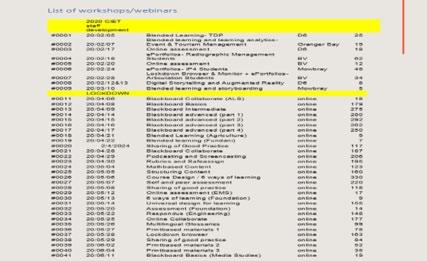
All the recordings of the webinars offered during the RTL were infused into the Blackboard Best Practice course where all lecturers have access (which is https://myclassroom.cput.ac.za/webapps/blackboard/content/listContent. jsp?course_id=_76571_1&content_id=_1087956_1
The recorded resources are available to all lecturers for future reference and selfdirected learning if need be.
CIET established a helpdesk (see diagram below) where students and staff experiencing problems could post the problems they experienced while using or accessing learning materials. Two helpdesk support staff through Dell Foundation funding were employed in September 2020 on a six month contract, and staff and student support went well. It is hoped that this helpdesk support service will be sustained beyond the Dell Foundation funding as it is a necessary service towards a Smart university.
A student Blackboard guide was designed and sent to all the students to enable them navigate the LMS easily during the emergency remote teaching and learning (see diagram below).
CIET translated, through Dell Foundation funding, some of the videos being used for teaching into transcripts and audio so that students with different learning needs could access the material in their preferred format. As noted in more detail above, online multilingual glossary terms were also translated into the three languages used in the Western Cape and were verified by language specialists and made available to students. These efforts were to ensure that no student was left behind in terms of the format of resources provided or due to language issues.
The glossaries can be accessed through www.mlg.cput.ac.za.
CIET and Fundani CHED designed a student access survey and student and staff experiences survey on

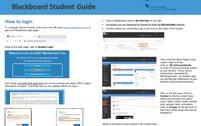
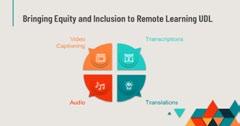
remote teaching and learning. The latter two surveys were designed, but awaited approval at the time of writing from the DVC: Teaching & Learning as well as ethical clearance before being rolled out. The access survey data informed institutional decisionmaking in with regard to student in order to engage fully on emergency remote learning.


CIET wrote a proposal for student provision of laptops, especially for 2021 and beyond for first entry students, as part of ensuring equity of access to devices, and towards achieving Vision 2030. It is hoped that the university will take this project forward in addressing students’ lack of devices.
CIET coordinated the process involved and the administration of the DHET and University of the Free State student survey, which was aimed at assessing the effectiveness of the policy NSFAS is using to provide learning materials to students, and especially their experiences in accessing materials during the Covid-19 pandemic. The CPUT results of the survey are available and can be used for decision making if needed.

Various UCDP proposals were written by the Centre on learner analytics for using student and staff data to make improvements in teaching and learning and hopefully help students who might be at risk of failing; OER – staff to be trained
in developing learning materials and especially open educational resources; workshops and seminars for staff members on effectively integrating technology in teaching and learning; and Blackboard. A proposal deals with Blackboard Ally, a feature which allows for universal design for learning principles in developing materials; and if this is funded, learning materials designed can be converted into different formats to cater for various student learning styles. A proposal for an institutional LinkedIn teaching and learning resource was also drawn up.
All the above proposals, which will lead to interventions in staff development and student support have been allocated funding through the UCDG grants for 2021 to 2023.
Four staff members from different faculties received training and are piloting a WhatsApp solution by ConnectYard integrated into the LMS. The pilot started on 2 November 2020 and was to run for 8 week (this was extended because the students were doing final assessments). The solution caters for security issues raised by the use of WhatsApp for teaching and learning and offers many ways the institution can use WhatsApp in a secure environment. It is CIET’s hope that, based on the results of the pilot, the institution can make informed decisions in securing funding for a license for the solution.
CIET organised the 2020 Teaching and Learning with Technology Day, which was held virtually on 26 November 2020. The theme was ‘Staff and student experiences of remote teaching and learning’. Participants shared their practices and experiences of RTL and the conference was attended 119 people.
Possible results of the training offered
Analytics data drawn in October 10, 2020, showed that institutionally, 96.55 percent of the students were active on blackboard (see pie chart below), showing a tremendous increase in the uptake of the LMS. There was increased uptake institutionally, and also across faculties.
Data sourced 11/11/2020 for overall institutional uptake

Looking at active students per faculty, Applied Sciences had 95.45%; Informatics and Design, 96.12%; Education, 95.71%; Business and Management Sciences, 98.68%, Health and Wellness Sciences, 91.97%; and the Faculty of Engineering and the Built Environment, 96.42 percent (data sourced on 6/11/2020 for Faculty uptake). The most widely used tools across the faculties were course content and assignment tools. However, there was increased use of other tools across the faculties (see graph below).
With regard to the above statistics, it should be taken into account that some lecturers used tools other than the LMS for teaching and learning.
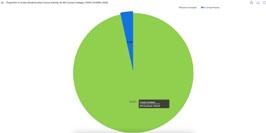

Data on the impact of CIET services on student performance and staff quality of teaching during RTL was sought from staff members through a survey questionnaire. It should be noted that student performance and quality of teaching of staff cannot only be attributed to CIET services alone as this involves efforts of other CPUT stakeholders.
However, the CIET sought staff feedback on the impacts of its services on staff teaching and learning of their students. Below are some of the key results.
Results showed that CIET services had a strong impact on colleagues, as 85% reported that CIET training and support had a high or very high impact on their teaching during RTL. They stated that the training helped them build their confidence, allowed them to expand their practices on Blackboard beyond the sharing of content, shared tips and tricks and best practices and in general, made the movement to online learning smoother for them. The interventions were also said to have created a community of practice and made colleagues feel less alone during the RTL.
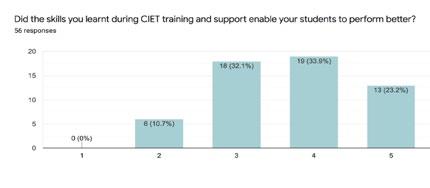
Staff were slightly less positive in terms of the impact of this training on their students’ performance, although approximately fifty percent felt that the training did have some positive impact. They indicated that in some cases marks went up by 15%, but in other cases they dropped and many respondents indicated that they did not have information yet to answer the question, or it was difficult to measure. They also mentioned that students struggled with online learning due to factors beyond their and CIET’s control, including lack of data, electricity,
computers, etc. About 45% of staff members confirmed the student Blackboard guide was useful to students.
Issues identified by CIET and to be implemented in collaboration with faculties and in line with Vision2030
• High cost of textbooks: UCDG-funded development of textbooks and use of open educational resources (OERs) could assist and also could lead to visibility of our academics and university to the world. The use of LinkedIn as a resource, which is UCDG-funded for 2021-2013, will also provide resources to students and staff.
• Inadequate skills and resources to develop learning materials that are accessible to all students: Blackboard Ally will be implemented and staff trained to address this issue. The project is UCDG-funded from 20212023.
• The extensive use of WhatsApp for teaching and learning raises security issues: A WhatsApp solution integrated into the LMS is being piloted. This solution can be used by the institution for other purposes (no funding yet is sourced for buying the license).
• Cheating in online assessment: the Lockdown Browser and Respondus Monitor license was renewed (6000 seats in 2020).Training was to be provided, and also training on setting assessments which do not encourage cheating.
• A learner analytics policy will be implemented, together with learner analytics student guidelines. At least one staff member from every department will be trained to build reports for the department, and hopefully they can cascade this to other staff members. This is deemed important if the use of learner analytics data is to be sustainable in the organization.
• Staff development in course design for blended learning, which is key for ensuring proper use of the LMS and maximum student engagement. CIET will provide guidelines on what should be the minimum presence on the LMS.
All the above will be implemented to ensure holistic student success and towards achieving some of the vision 2030 objectives.

Mr Shonisani Khangala Director of CPPD
For the Centre for Professional and Personal Development (CPPD) and the Short Course Offerings Entities (SCOEs), 2020 was a challenging year which tested both the stakeholders’ resilience and ability to cope with uncertainty.
The year also marked the second year since the inception of the Short Course Policy, which regulates the activities of all those involved in short learning programmes. Due to the Covid-19 pandemic, the year 2020 presented a unique set of challenges with respect to CPPD’s mandate to ensure compliance and adherence to the Short Course Policy.
This report highlights some of the activities which were undertaken during 2020, especially those activities undertaken in response to the challenges brought on by the Covid-19 pandemic. The report also shares some of the achievements of CPPD and the SCOEs in 2020.
As news of the onset of Covid-19 elsewhere in the world begun to spread, it became clear quite earlier in the year that 2020 was going be unusual. As part of efforts to ensure staff remained engaged and productive during uncertain times, before the lockdowns CPPD initiated a survey among staff to assess their readiness to work from home. The following are some of the issues which were evaluated during the survey:
• Ability to work from home, given each staff member’s unique situation, role and responsibilities;
• Tools/equipment/resources required in order to be able to work from home;
• Obstacles (if any) that could prevent staff from being productive whilst working from home;
• Extent to which consistent and satisfactory service could be delivered during work from home arrangements;
• Support required to become productive, reliable and engaged in a work from home environment.
A prompt response by CPPD staff to the above survey was helpful in preparing for a conducive operating environment and ongoing unhindered provision of services.
In addition to the above preparation for CPPD staff, the readiness of the Short Course Offering Entities (SCOEs) to deliver services during the Covid-19 pandemic was also assessed. A state of readiness assessment for transitioning online was conducted among the SCOEs. Five SSCOEs were found to be ready to deliver some of their offerings online, whereas four were not ready. The assessment also identified support required in order to prepare SCOEs for effective online delivery.
Short Course Offering Entities such as Graduate Centre for Management (GCM), the Retail Academy and the Technology Station Clothing and Textile conducted surveys to assess learners’ appetite to learn online. The outcomes of the surveys contributed to a high level of preparedness on part of the teaching staff. Staff became more aware of the learners’ needs, concerns and requirements, and were thus better prepared to deal with the challenges of teaching online.
Teaching staff were trained in various aspects related to multimodal teaching and learning. These included technical training on the Learner Management System (Blackboard); training on how to deliver training online; how to edit or change course materials; converting face to face learning to online assimilations; assessment development and moderation; as well as administration and reporting training (e.g. extracting online logs, attendance registers, grade reports and assessments). The above interventions enhanced the quality of delivery during the Covid-19 pandemic.
In addition to the above efforts, CPPD also put in place a strategy for the academic project roll-out within the short course environment during the
Covid-19 pandemic. The strategy was developed with participation and involvement of all Short Course Offerings Entities, and it was monitored throughout the year during meetings of the CPPD Management Body.
The successful preparations of stakeholders involved in the delivery of short course learning programmes as outlined above ensured the smooth implementation of teaching, learning, assessment and certification activities within the short course environment.
An offering that stood out during the Covid-19 pandemic
One of the five Nursing Science Short Course offerings which were approved towards the end of 2019 (i.e. Management and Leadership in Nursing Speciality Practises), was delivered for the first time in 2020. It was quite inspiring to witness the hard work of the Faculty of Health and Wellness coming to fruition during the challenging period of the Covid-19 pandemic. Due to the challenges particularly faced by health workers during the pandemic, small numbers of students enrolled this short course. However, the feedback provided by the few that attended this short course was quite heart-warming.

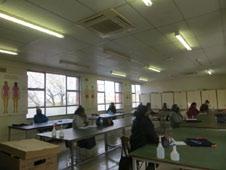
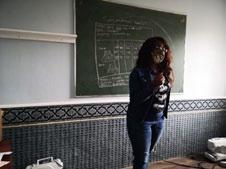
The Short Course in Management and leadership comes at a crucial time in the history of mankind, where everything you have learnt is being challenged, and the pace of introducing and applying change is days apart.
The short course in management provides a grounding paradigm to measure how one approaches the interim- [and] post-Covid Higher Education Health environment.
The value is more than academic to me – it is career and lifesaving.
When I applied for the short course I honestly saw a mountain in front of me because I literally saw just acts and regulations but you have opened my mind and eased my heart. I have learnt so much in this short period of time.
It is clear from the above that the Management and Leadership in Nursing Speciality Practises Short Course stood out as a timely offering during the Covid-19 pandemic.
One of the achievements of the CPPD during 2020 was facilitating the successful development of the QCTO Policy. The development of this policy came after several months of internal debates and discussions as to whether or not it was prudent for the university to pursue qualifications other than those aligned with the Higher Education Qualifications Sub-Framework (HEQSF). The decision to participate in QCTO related qualifications will broaden the university’s scope to contribute to the skills’ needs of the country.
The QCTO Policy will ensure compliance and adherence to all applicable regulations and quality assurance requirements, whilst also mitigating any risks of participating in this terrain.
The policy was tabled and approved by Senate in November 2020, and subsequently approved by Council. Attention has now turned to implementation.
Despite the challenges of the year 2020, new offerings were proposed and tabled at CPPD Management Body meetings. These include a Management Development Programme from the Department of Management and Project Management; as well as Retail Buyer and Retail Supervisor from the Retail Academy. The latter two Short Courses will be among the first offerings accredited by the QCTO since the inception of the QCTO Policy.
During 2021, CPPD will focus on the following key activities:
• Review of the Short Course Policy as the current Short Course Policy expires in November 2021. CPPD will facilitate efforts of reviewing the policy. A task team to facilitate the review of the Short Course Policy has already been constituted;
• Implementation of the Covid-19 response strategy. A joint strategic planning meeting between CPPD and all the SCOEs has already been held. The strategy will be implemented and monitored throughout 2021;
• Introduction of new offerings. CPPD will continue to work with the Centre for Sanitation and Water on the introduction of new offerings. The Centre will continue to encourage and support all entities aspiring to be involved in the development and delivery of short learning programmes.
• Third stream income: CPPD will continue to work with other stakeholders in efforts to maximize third stream income for the University.
Whilst 2020 has been a challenging year due to the Covid-19 pandemic, the CPPD and the SCOEs have continued to remain focused on their goal of growing and developing the short course offerings responsibly.

Prof Joyce Nduna Director of WIL
CPUT’s Centre for Community Engagement and Work Integrated Learning (CE & WIL) viewed 2020 as a year of developing new plans for moving CE and WIL activities towards excellence and aligning CPUT’s CE and WIL practice with the university’s Vision 2030, the transformation agenda in higher education as well as challenges that were posed by the COVID-19 pandemic.
An institutional WIL workshop was held virtually on 3 June 2020 to build a systematic platform for WIL to operate effectively and efficiently. WIL was identified as a driver for CPUT’s Vision 2030. The recommendations relating to WIL design in academic programmes, WIL research, WIL partnerships, WIL data management and WIL related policy reviews and quality management were put forward. The implementation of the recommendations was planned for 2021.
As CPUT’s definition of community engagement is inclusive of engagement with community and industry the 2020 report includes the functions of the two units of the Centre, which are the Cooperative Education Unit and the Service-Learning and Civic Engagement Unit. These units had to adapt their activities and practices as required by the restrictions and constraints brought about by COVID 19.
The subsections cover the diverse range of activities, initiatives, interventions and achievements as related to teaching and learning which were implemented by the units in 2020.
As workplace learning is an important academic requirement that was affected negatively in 2020, a large number of WIL qualifying students were homebound or had limited placement opportunities. This situation resulted in a coordinated effort for seeking new ideas and solutions across the institution. An institutional decision was taken to give students that had to do workplace learning, project-based work or other suitable industry-based assignments that engaged students with equal rigor as many academic departments indicated that workplace learning presented a challenge for those students that required work placements from 1 July to December 2020”. All academic departments had to adapt and find new ways for satisfying the requirements of work placements and the cooperative education unit also had to adapt itself to ensure continued support and effectiveness of its functions in supporting the activities that were related to workplace learning in the university. The unit was tasked to review the Business Continuity Plans (BCPs) of the Faculties and produce a consolidated document that explained how each Faculty planned to implement and assess workplace learning in 2020. The Unit used the reviews of Faculty BCPs as a basis for developing its own BCP.
In response to the challenges that required health and safety measures flexibility and innovation in 2020, the Cooperative Education Unit supported academic departments in their teaching and learning activities to plan and implement workplace learning differently. The unit provided strategic and administrative support to all the stakeholders of the university including; WIL students, WIL coordinators in all six faculties of the university and industry partners. It became clear from the onset that a digital approach needed to be undertaken by the unit in order to provide support for the continuation of WIL
activities in the university. The digital approach was also in line with CPUT’s Vision 2030 of becoming a smart university.
The following ways were used to support the Faculties
• All WIL placement registrations were done electronically
• Logbooks and other training material were distributed electronically
• Graduate support activities were conducted online, this includes; CV submission, sourcing of opportunities and provision of career information.
• All engagement activities between internal and external stakeholders in WIL such as workshops, WIL advisory, funder engagement, and learner stipend administration were conducted online.
The Unit responded to the DHET’s directive which aimed at ensuring that WIL students receive their WIL stipends until the SETAs provide guidelines for the payment of WIL stipends during the lockdown. The Unit continued to administer stipends for workplace learning and to respond to monthly payment queries of WIL students during the lockdown period. The following SETA funded projects were administered by the Unit in 2020.
The Unit wrote a winning Dell Foundation funding proposal for continuing the Employability Improvement Programme (EIP) The EIP is a work readiness programme that aims at developing soft skills that include communication,
teamwork and problem solving skills, using the Japanese KAIZEN principle.
The availability of funds from the Dell Foundation in 2020 presented an opportunity for the Cooperative Education Unit to improve its EIP and work in partnership with Fundani’s Student Learning Support Unit during the COVID-19 pandemic. An EIP facilitator and online materials developer were appointed to conduct online workshops and develop online EIP materials. The Programme commenced from August to November 2020 and continued in 2021.
The following diagrams show some of the online materials that were developed:
Material Development (week one)
Unit 1: EIP Introduction
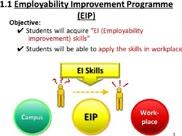
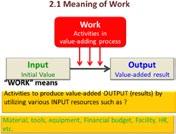


The following diagrams show the activities of the fifth week hands on workshop:
Employability Improvement programme Hands on Practice

Publication of the WIL Curriculum Framework for TVET and ACET qualifications

Students to do Truck assembly Production line assembly round 2
The students had to have roles and responsibilities to run a production line on their own. The students formed Management committee and operators
The Unit played an active role in coordinating and facilitating the CHEC-CPUT Dual Higher Education Project which aims at restructuring the curriculum to involve more industry participation in higher education programmes to enhance student employability. Several institutional meetings were held with the representatives of the CHEC office in 2020. The presentations and discussions on this project resulted in an institutional decision to select at least ONE pilot programme in each Faculty in 2021. The project is funded by the DHET and coordinated by CPUT.
The Unit facilitated the process of publishing the national WIL Curriculum Frameworks for TVET and ACET qualifications. The photographs below show the cover pages and copies of the Frameworks that were received by CPUT staff from the publisher and distributed to the Faculties of Education of 16 South African Universities.

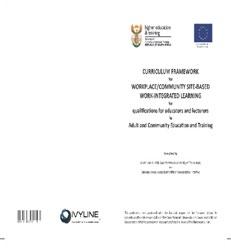
The copies were distributed to the Faculties of Education of 16 South African Universities. Each University received one copy for the TVET qualification and one copy for the ACET qualification. Electronic versions of the WIL Curriculum Frameworks were also circulated to the universities. Ten copies for the TVET and ACET qualifications were sent to the Teacher Education Directorate of the DHET.
The year 2020 marked the beginning of unprecedented changes as universities aimed to develop mitigating strategies in the face of COVID 19 restrictions. In addition, many Service-Learning (SL) and Civic Engagement (CE) programmes and projects were affected by the student protests and the ensuing national lockdown. The third pillar of higher education, being Community Engagement, was seriously affected, being mostly dependant on face-to-face engagement within a community context. Students, staff and external partners had to adapt to the situation by exploring creative ways to continue with Service-Learning and Civic Engagement project activities.
In preparation for the “new normal” the SLCE Unit participated and contributed to the institutional re-engineering of its teaching and learning practices through the Business Continuity Plan, institutional meetings and workshops, and through its engagement with its external partners. National legislative strategies and guidelines giving direction to teaching and learning activities in higher education during the national lockdown, were also considered in the planning of activities for SLCE.
The first step was to host an institutional workshop with staff: Quo Vadis: Where are you going? Which was facilitated by Jacqui Scheepers (Manager: SLCE Units) and Dr Faiq Waghid, Centre for Innovative Educational Technology (CIET), who monitored the technical queries and provided additional support. Given the challenges that were being faced by higher education institutions with respect to the COVID 19 pandemic, the aim of the workshop was to engage in dialogue with staff on how the university could map the way forward with the various
forms of Community Engagement. In accordance with the lockdown regulations, the workshop was held virtually.
As a point of departure, the Carousel of zones model was emphasized to place SLCE within the context of a revised teaching and learning approach during the national lockdown level 4:
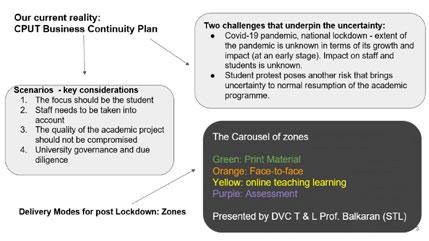
A scoping exercise determined the current reality which the university was facing during this challenging time.
• Many students left the province to travel back home, some even out of the country and therefore it became difficult to confine the projects to communities within the Western Cape.
• CE project plans were halted and had to be revised with university partners and stakeholders.
• Conceptualising alternatives were challenging during the lock down and travelling to community and project sites were restricted.
Many institutional and national regulatory factors were identified as critical to the implementation of SLCE projects:

A new theoretical and conceptual position: Extreme E- Service Learning (XESL) was discussed and explored in the workshop. Prior to the workshop, a pre-reading on Extreme E-Service Learning and SL in on-line courses were circulated for discussion.
https://cputacza.sharepoint.com/:b:/s/Service-LearningTeam/ERBhrWSQVJAiuU6Z1YXWp8BurrR-CiQLYPWAQT6Lia5kQ?e=7xUlyh
https://cputacza.sharepoint.com/:b:/s/Service-LearningTeam/EcA4rAXMU HRLsqaRMpRUVVgBk7yErfSqAKEKkhmqztGvSw?e=Dc6wIM
The aim of the articles was to generate a discussion on whether this form of Service-Learning was appropriate to apply during the national lockdown. A definition of the three forms of Service-Learning were shared:

There was general consensus that the university should pursue a blended approach for SLCE rather than Extreme-E-Service Learning. Staff acknowledged though that there was a possibility that many project activities could shift to online engagement and then contributed to the shaping of SLCE project ideas which could be implemented despite the lockdown. The discussions were led by the following questions:
• What are our visions and hopes for Community Engagement (ServiceLearning and Civic Engagement) in this new normal?
• What kinds of SLCE activities can we imagine now?
There were many project ideas generated by staff both in the workshop and through further engagement with the SLCE unit, Not all the project ideas were implemented in 2020 but the workshop certainly stimulated and encourage lecturers to pursue the possibility that SLCE could be re-imagined in line with health and safety protocols.
The SLCE Unit was approached to provide support to faculties and departments to explore alternatives to work placements in the form of Project Based Learning programmes. In fact, “PJBL is a strategy that recognises both students’ inherent drive to learn and capacity to do useful work” (Turner, Keegan & Crawford, 2000). Through presentations and meetings with lecturers, industry and community partners, projects with a community based focus were developed so that students could achieve the learning outcomes as prescribed by their respective academic programmes. It was important that “Successful strategies in the design and implementation of effective WIL curricula ensure that students focus on the integration of theoretical knowledge and practice in ways that allow them to connect university or disciplinary learning with workplace application” (CHE WIL Good Practice Guide, Winberg; Garraway & Engel-Hills: 2011). These 2020 project pilots will be further developed and expanded in 2021. Two projects will be discussed under this section:
1. Work Integrated Mask Project
2. District Six Urban Garden and 3. Athlone Greening and Renewal project
Nina Drotsky, Professional Clothing & Textile Practice (CME360S), Cooperative Education Coordinator: Department of Clothing & Textile Technology (CLOTEX):
The department of Clothing and Textile technology usually places their students in industry for the last six months of their qualification where the workstations are extremely varied within the apparel and textile pipeline. Due to COVID 19 there were limited workstations available for placements.
Community project sites were considered as alternative placement sites for the department. One of the projects provided by the SLCE Unit was a sewing project at the Saartjie Baartman Centre as discussed below:
• The project was to provide participants with basic sewing skills to create products, which they would be able to produce and sell. The focus being on skills development and creating employment opportunities for the youth and woman in the home industry sector.
• Reusable material face masks were identified as a product that is currently in high demand and could be used as ‘gateway’ to the introduction of basic sewing skills. Construction of the masks includes a number of operations which could be duplicated in simple products such as hair accessories and household decorations.
• One of the partners, Camissa Solutions identified several projects in rural locations throughout the Western Cape that could benefit from this initiative but this would be explored in the long term.
• The Textile Technology Station partnered on programmes for skills development support in rural and disadvantaged communities, and was able to provide necessary resources to assist students and the department in the development of the project.
There were regular feedback sessions on the progress of activities. The original intention was that students would be aligned with different communities (their own or communities close to them). Unfortunately, most students did not live close to the identified sites and it was decided to centralise the project within Cape Town, with a centralised off campus site for cut work and distribution, in Goodwood. The continuity of the project was considered to be very important, to further develop participants in the complexity of the products they could produce; from masks to school wear, etc.
Future plans are that the technology station could provide domestic machines and evaluate sites for training and sewing. The aim was to begin on a small scale with the further intention of duplicating the project model in other areas. The project team was aware of the protocols and regulations of the lockdown and had factored this into all plans going forward.
MODALITY PROBLEM BASED LEARNING (PBL) PROJECT BASED LEARNING (PJBL)
Definition A pedagogical approach that encourages students to learn through structured exploration of a practicebased problem Requires drawing on multiple disciplines to solve problems and often results in a measurable products or service
Project Real workplace-based project in consultation with, industry partners via remote consultation with experts/specialists:
Review impact of COVID on apparel pipeline. The department to identify different industry partners to present problems related to their particular part of the industry, e.g. Textile producer, Manufacturing and Retail
Mentoring of students Industry partners, subject specialists and technology station
Learner Management
Blackboard, MS Teams, Google Docs, WhatsApp, Other online Project management tools
Face Masks (see example of project aligned with learning outcomes)
CPUT Technology Station – Faculty of Engineering Facemasks
Camissa Solutions/SLCE/ TTS
Industry partners, subject specialists and technology station
Blackboard, MS Teams, Google Docs, WhatsApp, Other online Project management tools
The department was tasked with identifying different modalities of Work Integrated Learning in the absence of industry workstations. To achieve the learning outcomes of the subject/programme a hybrid between problem based and project-based learning was developed. As students were not able to be in a mass production environment of either retail or manufacturing, part of the project required them to identify and develop the product in line with industry processes and standards. Students were required to research masks and uses in compliance with national government health requirements, assess the market and products compliance, and present on product.
Students were required to produce a total of twenty face masks per team within a period of six hours. On final submission the product was required to be presented with care instructions and marketing materials. Submissions also included training videos on the construction of masks. Which would eventually be used to aid in the training of participants. The simulation required that students produce accompanying information in the form of technical specifications.
Project activities: Four stand-alone projects
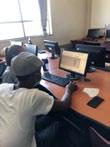

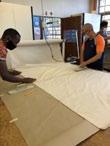
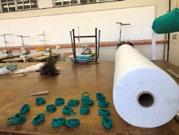

Final presentation of masks
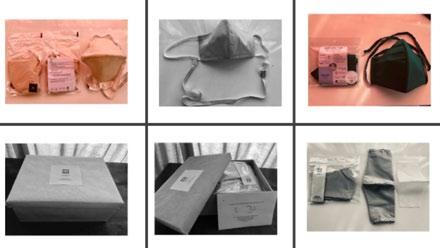
Fit and comfort were very important in the final selection of masks, groups made different masks based on the feedback from their research, which included masks with earsafers for comfort and adjustable wiring in nose piece. The department provided the materials and students needed to lable and package the product as per testing for care and use label.
Unfortunately, due to COVID 19 and programme scheduling changes, the department was unable to complete the on-site training, the content and structure was adapted to meet the requirements of outcomes of the subject successfully. The next intake of students will continue the project so that the expectations of the community can be met.
Mr Wanga Ncise, Department of Horticultural Sciences, Faculty of Applied Sciences
For the past few years CPUT has been in discussion with various D6 stakeholders regarding the integration of the District Six (D6) campus with the D6 Community. The thrust of the most recent “re-imagining” workshops was to put forward ideas to involve students in SL projects which could re-imagine the space and structures on the D6 campus as a means to appease the tensions between CPUT, the District 6 Homecoming Centre, District Six Civic Association and the past/current residents. One suggestion was to use the former horticultural nursery site located on the D6 campus and to develop it into a community urban garden.
As the former nursery on the campus is standing unused and falling into decay, it was proposed that this would be an ideal site for the establishment of an urban garden as part of the ‘Re-imagining CPUT in D6’ project. Possible project activities could include the design, landscaping, gardening, aquaponics, hydroponics, training of D6 residents (former and present – including youth), community organisations, homeless individuals in the CBD, and persons with disabilities.
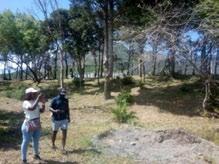
Plants were propagated and placed in shade area at CPUT D6 former nursery
This site was ideal for the placement of students during the lockdown as it was isolated and outdoors. Therefore adhering to COVID 19 protocols was not difficult. Two WIL students who required experiential learning were assigned to the project and were mentored by lecturer, Wanga Ncise. They conducted an initial site visit to do site planning to determine which plants that would be suitable for the garden section. The project activities included the propagation of plants that would be suitable to grow on that site through observation of the soil type, shade and sunlight areas.
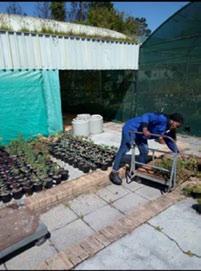
Students started the selection of plants, note them down, collected plant material and started the propagation process at the CPUT nursery in preparation for the D6 urban garden project. They propagated the plants from ground covers, perennials, mini shrubs, bulbs, herbs and vegetables. Students were required to write essays about the choice of selecting those plants. The propagation production included (propagation, transplanting, labelling, recording and placing plants in a shade area) specifically for D6 projects.
Wilfried Bohm, Department of Architectural Technology and Interior Design, Faculty of Informatics and Design

The Diploma in Architectural Technology offered by the CPUT Department of Architectural Technology and Interior Design includes 5 semesters of academic studies, plus one final semester of work experience in architectural practice. In 2020 this final semester experience was threatened, the academic staff instead decided to organize and run a number of ‘Sim Offices’, simulated office situations, that would impart the learning experience that students would otherwise have gained from their work placements.
Of the 45 students within the class, 42 were then placed within such Sim Offices organized by staff and certain external partners:
• 1/3 of class: An internally run Sim Office, directed by CPUT staff, Dr June Jordaan, working on a site at Greenpoint Common • 1/3 of class: A Sim Office run with involvement from CoCT Officials, CPUT staff contact Dr Rudolf Perold, working on a site at Table View
• 1/3 of class: A Sim Office titled ‘Athlone Greening’, (CPUT staff contact: Wilfried Bohm) run by two external professionals, Faldi Samaai, an engineer and Khalied Jacobs, an architect. They had volunteered their services, had developed a very comprehensive and challenging brief, which Jacqueline Scheepers from the SLCE Unit, CPUT Centre for Community Engagement and Work Integrated Learning then offered to our department, which 3rd year academic staff gratefully took on.
The students in the SIM Offices dealth with the production of a set of working drawings, develop durable, cost-effective, climate-responsive construction systems using knowledge relevant of appropriate National Building Regulations (NBR) and develop some knowledge of the administrative and logistical support systems in a practice.
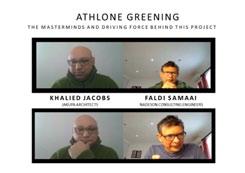
The interaction between the partners and students occurred twice weekly in the form of ZOOM meetings. The two project leaders, Faldi Samaai and Khalied Jacobs, would give input, set tasks for next work stages, and receive report backs.
Upon refelction of this new and adjusted method to conduct In-servie learning the depart found that Faldi Samaai and Khalied Jacobs, who were both respected practitioners in their respective professions, volunteered to engage in this community based project with CPUT, aware that work practice learning opportunities for students would be greatly reduced due to Covid lockdowns affecting the industry.
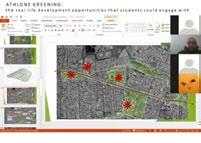
They conceptualised this Sim Office to address a range of challenges affecting the Cape Town suburb of Athlone, and to engage with the decay and neglect in the urban fabric, infrastructure and socio-economic situation of Athlone. Students experienced the complexity of real world situations from the mouths of active Running this project at distance, with the professionals, students and the academic staff member generally engaging by email, Whatsapp and Zoom, worked very well, except where a student may have fallen short on the technical equipment and data required. This is an area that proactive technical support from the university might address in future.
Many lecturers and students from across the university devised creative ServiceLearning projects during the lockdown. These projects used blended learning approaches, including on-line methods, to ensure that the learning outcomes could still be achieved. Many CE projects could still be achieved through working with what was realistic for the students within the confines of the COVID 19 restrictions. Three Service-Learning projects have been selected to showcase the 2020 year:
1. MITS Health Education in communities
2. SABMR awareness campaign
3. Inspiring Hope, Health and Happiness in the hearts of learners

Saaiga Ismail, Management III lecturer, Department of Medical Imaging and Therapeutic Sciences (MITS), Faculty of Health and Wellness
Every year, MITS includes Service -Learning as part of the Management III curriculum. The students were divided into groups with different interests.
The 2020 year was challenging as the project started just before the onset of
Covid 19 pandemic. The aims and objectives changed as students went deeper into the pandemic. The instructions to students therefore changed as the project changed to include health education of their communities.
Project objectives
• Creating awareness posters (COVID 19).
• Creating hand washing videos.
• Creating brochures and pamphlets.
• Teaching mask making skills.
• Teaching Radiography 1st years- INFECTION CONTROL (about PPE, handwashing, social distancing and creating an assessment rubric for the infection control practical).
• Short and long term upgrading of community structures, providing old exam papers to matriculants (Mathematics), providing masks and material to make masks to selected communities, providing clothes, groceries, etc.
Below are some of the posters developed as part of the work done by the MITS students:

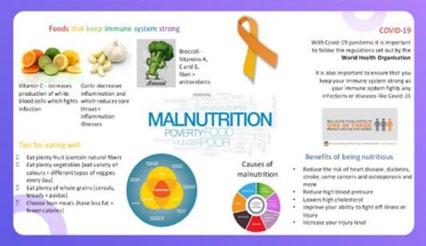
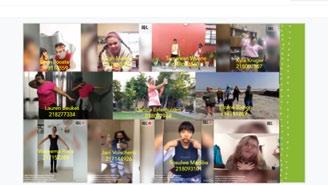
Other students worked with the MAS Safe Space shelter in Bellville, ACVV child protection organization in Worcester, Grassdale High School, St. Anne’s Women’s shelter in Woodstock, Lutzville Primary School farming community located on the West Coast and Vukani Day Care Centre in Khayelitsha, as depicted on photograph.
Students gained from the project as is described in their reflections. Many of their inherent skills were enhanced and some new ones were acquired such as: Teamwork, interpersonal communication skills, problem solving skills, transfer of learning; and Motivation, creativity, time management, self-worth/ self- awareness. The projects were a success under trying circumstances and the students performed well.
Heather Hendrickse, Department of Biomedical Sciences, Faculty of Health and Wellness

The lecturer, Heather Hendrickse has designed a communitybased service-learning engagement component embedded in the curriculum/course Immunohaematology for secondyear students in the Biomedical Sciences Department, Faculty of Health and Wellness Sciences. The project vision is relevant and of interest and benefit to the global community. Indicators of the succession plan are described further.
The focus is on a theoretical and practical learning experience enjoyed by all students and beneficial for patients globally. Students are instructed to keep a record of all signed activities (signed by staff members of the SABMR/CPUT Health Clinic attendance list of the SABMR free virtual training session/s submitted to the lecturer) screenshots and videos of their awareness campaign attempt via various media platforms (which include their contact people on different platforms sharing their posts of the SABMR awareness campaign as evidence) which they submit online together with their completed assignment project via SafeAsign, and a participation agreement among the members of the group are also submitted online and could be viewed on the CPUT BlackBoard.
In 2020, shortly before the coronavirus pandemic started, the BHSc Medical Laboratory Science Immunohaematology second-year students from the Biomedical Sciences Department had assisted the SABMR by handing out SABMR flyers at the Bellville campus and assisted potential stem cell donors with the buccal swab (cheek swab) kit, which includes the donor application form.
The partnerships/collaboration between the SABMR (Nadia Chalkley), the CPUT Community Engagement Centre (Jacqueline Scheepers), CPUT Health Clinic (Andries Slinger), CPUT Media Department (Ilse Fredericks), and the CPUT Biomedical Sciences Department (Heather Hendrickse) is an ongoing project.
The marking rubric for the project activities assessment is in line with the outcomes of the course. This is uploaded on Black Board before the voluntary stem cell donor recruitment drive happens on campus/online. Evidence of community participation and involvement is included by students to demonstrate that the outcomes have been met. Furthermore, students demonstrate engagement with techniques, research skills/additional knowledge, communication skills, marketing skills, workplace relationships and ethical considerations related to community based-service learning.



The SLCE Unit, joined forces with the Faculty of Education, Wellington Campus, and the Department of Emergency Medical Sciences to conceptualise the Hearts of Hope, Health and Happiness project. Inspiring hope was at the heart of the SL project in the Southern Cape Town of Dana Bay in Mossel Bay.
Mossel Bay is one of the areas where Faculty of Education students do their practice teaching and Department of English lecturers, Valencia Theys and Dr Hanlie Dippenaar, heard about a soup kitchen that was started in Asla Park during the lockdown. The two lecturers approached the SLCE Unit to conceptualise an intervention and the project was born. The project incorporated an educational focus with a focus on both mental and physical wellness. Students created motivational posters of hope for the Asla Park learners while staff assisted in securing donations from local organisations who supplied vegetables and fresh fish to feed the learners. Theresa Burns, SL Administrator coordinated the learning materials and other items which was transported from Cape Town to Mossel Bay.
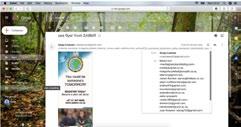
Examples of motivational posters designed for learners
Dr Hanlie Dippenaar, Department of English, Faculty of Education
Historically there were two SL projects annually in the Department of English for 3rd year students to provide support in learning English and reading skills: Two projects Correctional services (Grade 7 to 12) and Children’s home (Grade 4 to 12) are usually run.
In 2020 there was a need to re-imagine the SL projects for the department. The students adapted their activities by i) providing tutoring in their own community environment; and ii) Proving support to teachers at schools, e.g. teaching materials and teaching relief; and iii) Giving learners motivation and support in a small suburb/village called Dana Baai in Mossel Bay.

The programme was supported by CPUT’s Emergency Medical Services (EMS) Department Head, Lloyd Christopher, who invited EMS Master’s student Daniel Tilley (Western Cape Government, George), to facilitate a session on health and
safety. He reminded the learners of the importance of safety during COVID-19 and taught them about the paramedic services.
The project team concluded that:
• Students experienced a sense of success and achievement despite the challenges of COVID 19;
• Remote servicelearning is possible, but challenging;
• Social media and other online
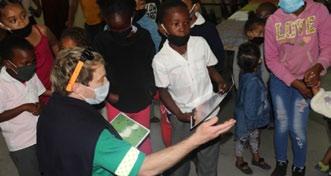
communication platforms was a beneficial component of the project;
• Hybrid nature of project led to blended learning opportunities;
• Opportunity for the incorporation of other disciplines;
• Shift in concept of community (to include family and neighbours);
• Alignment to learning outcomes/objectives was achieved; and
• Achievement of Graduate attributes was reached.
The SLCE Unit supports staff and students across faculties and departments and advises on ways to collaborate with government agencies and community-based organisations in implementing relevant projects in urban and rural locations.
There are three Civic Engagement (CE) projects which implemented in 2020 despite many logistical challenges. The projects discussed below are ongoing:
1. Building bridges on Mandela Day
2. Promote Learning for Life to high school learners in Cape Agulhas Municipality
3. CPUT’s builds Social Investment in Western Cape urban and rural communities
https://www.cput.ac.za/newsroom/news/article/4045/building-bridgeson-mandela-day
The late President Nelson Mandela’s birthday on 18 July was declared as Mandela Day by the United Nations in 2009 and encourages people to spend 67 minutes to support a charity or serve in their local community. The SLCE Unit and the Robben Island Museum (RIM) were invited to be part of the Mandela Bridges initiative by the global Ubuntu Leaders Academy, instituto Padre AntÓnio Vieira (IPAV) in Portugal, as part of a global initiative to celebrate Mandela Day. The initiative aimed to symbolically name 67 bridges around the world as “Mandela Bridges” for Mandela Day and was tested in Lisbon in 2016. According to the Academy the gesture aimed “to signal one of the dimensions of Mandela’s legacy which was his ability to build bridges, no matter how difficult it seemed to be”. The Ubuntu method has been developed by IPAV since 2010 through the project Ubuntu Leaders Academy (ULA) and the African concept of Ubuntu which emphasizes the importance of solidarity and interdependence and can be summarised by “I am because you are” or its complimentary meaning “”Becoming a person”.
The Mandela Bridges project initially posed a challenge for both SLCE Unit and RIM as most students were not on campus and/or had returned home to other towns, provinces and even other countries. The, RIM Ambassadors (high school learners), who the students had worked with on the Mandela Legacy project in 2019, were unable to meet with students due to the COVID 19 restrictions. In order to proceed with the project, the unit and RIM were compelled to coordinate the project using emails and social media like Whatsapp in the lead up to the Mandela Day celebrations. Students and learners, together with youth all over the world were encouraged to commit to the Ubuntu manifest.
CPUT Student Ubuntu ambassadors selected bridges in their communities and hometowns. Students and school learners were requested to reflect on: What does Ubuntu mean to you? They submitted their reflections online through Whatsapp which the unit then arranged into a reflection poster as shown below.

Student reflections on the Ubuntu philosophy
RIM school learners designed and complied their own posters and submitted these via email to RIM and the unit for editing and on-line sharing. Examples of the learner’s posters can be found below:

One CPUT Doctoral student, Rali Debrah from the Faculty of Informatics and Design, who had returned to her home in Ghana, communicated with the unit and offered to design one of the posters, featuring CPUT students with their bridges from all over Africa during the 2020 lockdown.
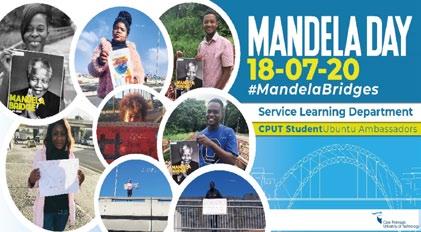
The SLCE Unit and RIM represented South Africa and identified the V & A Waterfront swing bridge near the boardwalk to the RIM ferry as it was symbolically directly adjacent to the Mandela Clock Tower. A highlight was when the V & A Waterfront approved the project and gave permission for the banners to be displayed there for the day. Students assisted with the hanging of the banners which drew substantial attention from the general public. A banner reading “Mandela Bridge (18-7.2020)” and another banner reading “Today’s the day to build bridges” were hung there on Mandela Day.
SLCE, RIM and students creating awareness at the V & A Waterfront Swing Bridge and at the Robben Island Museum
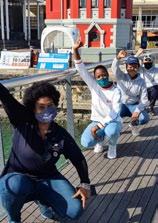

Students show off their Ubuntu reflection and bridge posters
The initiative coincided with a global E-Summit to promote “shared responsibility” and “global solidarity” in the fight against Covid19 given its health, economic, and social consequences. Several world personalities were invited to share their perspectives and proposals on how we can together overcome the impact of COVID 19. The E-Summit was co-chaired by Prof John Volmink, President of the Ubuntu Global Network and former acting Vice-Chancellor of CPUT, and José Ramos Horta, a 1994 Nobel laureate.
The 67 Mandela bridges, included the CPUT/RIM bridge, were presented to the global audience at an on-line conference which student Ubuntu Ambassadors were invited to attend. The contributions and reflections of the CPUT’s Student Ubuntu ambassadors and Robben Island Museum ambassadors were included in the conference contributions.
RIM’s Vuyo Mayongo, Programmes officer in the Public Heritage education department, believes that “Mandela is powerful symbol of political imprisonment and representation of those who struggle for freedom under oppressive regimes.
RIM communicates Mandela’s ideals and values of freedom, the triumph of the human spirit, democracy, and the culture of human rights through building young ambassadors through nation building programmes. During this pandemic Mandela’s leadership still prevails to build our societies”.
See location map and video of CPUT and RIM https://www.academialideresubuntu.org/en/publications/mandela-bridges
The unit hopes that students will build their leadership abilities and be encouraged to find ways to construct bridges across the cultural, economic, educational and social divides in our society. The building bridges metaphor resonates with our mission to contribute positively by building social citizenry, servant leadership and the spirit of Ubuntu.
University students and staff travelled to the southernmost tip of Africa to deliver a high school educational programme promoting life skills to Bredasdorp High School and Albert Myburgh Secondary School learners. The collaborative project between the Service-Learning and Civic Engagement Unit (SLCEU), the organisation Bossie Projects, and the Cape Agulhas Municipality was held on 31 October and 1 November 2020 in Bredasdorp and Arniston.
Themes covered were: Substance abuse, Bullying including (cyber bullying), Gender Based Violence and Sexuality, and Study Skills to prepare students for examinations. Students. The methodology enabled learners to engage in deep reflective and interactive dialogue which was guided by critical questions posed by the CPUT students.
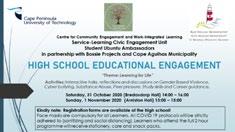
Student Ubuntu Ambassador and project team leader, Moegamat Gabieb Hendricks, Management and Project Management final year student, Faculty of Business and Management Sciences, said of the experience: ‘The impact that the project had on me is to always want to change the negative into a positive and always wanting to make a change in the lives of others. The project taught me that no matter what I have there is someone that will always be at a disadvantage to me and we need to share what we have. We need to accept people and live the Chain of Humanity’.
The students were excellent role models and showed learners that further study was possible, no matter what their background.
The SLCEU joined hands with the CPUT Business Unit to distribute beds and mattresses to community organisations, spread across the Western Cape, in rural and urban communities, as part of their Social Investment Project. On Monday, 16 November 2020, 165 beds and mattresses from student residences were distributed to various community organisations.
According to CPUT’s Residence Finance Specialist, Phillip Chibvuri: ‘ We remain determined to see through the on-going project of making our living and learning spaces more conducive for baking the best graduates we can with the resources and initiatives we can explore. We are now close to 70% completion in replacing all CPUT owned beds and mattresses across all our campuses. This replacement project paves way for a wide range of possibilities and other complimentary projects to come in our bid to ensure our clients, eventually graduates get the best experience with our brand as we continue to ‘create futures’.
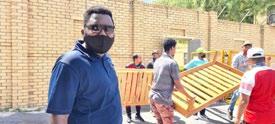
One of the highlights for the project was when Resident Student Assistant, Khumbulani Chimusaro, a Civil Engineering student, took initiative by mobilising a group of student volunteers from the student residences to assist community members to load the beds and mattresses onto the waiting trucks on the Bellville campus. ‘The leadership, kindness and respect displayed by the students was heart- warming and impressed the community organisations’ said Jacqui Scheepers, Manager of SLCEU ‘and gave us much hope for the future of our country’.
CPUT’s Student Ubuntu Ambassador, Ntombozuko Bota, from The Hope Foundation, (a student led organisation) assisted with identifying organisations and Masters in Energy student, Muster Madavha coordinated some of the logistics on site and volunteered to help organisations load the trucks on arrival. Another student-led organisation who participated was Umsimbithi Foundation.
A range of organisations received beds and mattresses, ranging from organisations providing services to the elderly, the homeless, orphans, and to those recovering from substance abuse and gender based violence.

The Community Policing Forum (CPF), Langebaan, were amongst the organisations who partnered with CPUT. Debbie and Peter Liebenberg, ‘wants to say a huge thank you to CPUT for making a difference to 50 of our community members who received much-needed beds and mattresses in Sea breeze Park on Thursday, 19 November 2020’ where beds were distributed in 15 minutes and brought comfort to so many community members. ‘Making a

difference is one thing, making such a difference to people’s quality of sleep, is lifting them to a different level. Langebaan salutes CPUT’ says Liebenberg.
The response from Breede Vallei Municipality was that: ‘It could not have come at a more appropriate time as our shelter was in need of beds’. Project partner, Lovetta Bolters, from Camissa Solutions expressed her gratitude for the role that CPUT plays in ‘not just talking about giving back, but acting on their commitment to their communities.’ This initiative has strengthened the existing partnership and the SLCE Unit will explore further opportunities for projects with the municipality and Camissa Solutions. Some of the beds were distributed to the Sea Breeze Park community.
For the first time, the SLCE unit conducted training on Community Engagement for new staff as part of the Teaching Development Programme (TDP) (offered by Fundani CHED) via the e-learning platform, Blackboard Collaborate. The assessment was the conceptulisation of a SL or CE project in the form of a poster. The assessments were submitted by staff participants on-line and graded by the unit. This has paved the way for the unit to relook at its own capacity building programmes and whether Blackboard Collaborate could be used for future staff training in SLCE.
Community Engagement which includes Service-Learning and Civic Engagement is a natural home for the realisation of the graduate attributes as reflected in the institutional Vision 2030. Students are enriched ontological through selfreflection and are made aware of their role in the broader society through the philosophy of Ubuntu and servant leadership.
Despite the many challenges staff and students strived to conceptualise and implement projects during 2020. Staff were also encouraged to develop a
more scholarly approach to their SLCE practices. A total of twenty projects were coordinated by the SLCE in 2020. The project spreadsheet attached indicates the spread of projects across departments, faculties and the broader institutions. The SLCE Units aim to continue to build a community of practice to support engaged teaching and research, in the journey towards strengthening the scholarship of engagement at the university. We further aim to re-imagine our SLCE programmes going forward for the university and to generate new and innovative ways of implementing SLCE in this ‘new normal’ through staff and student capacity building, development of engaged research, and the strengthening of SLCE university partnerships.
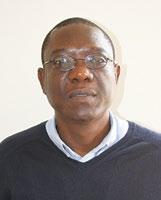
Dr Elisha Chiware Director: Libraries
Library staff continues to support the academic programme by providing information literacy training in collaboration with faculties, helping students with information queries via the online library chat service and provision of online information resources. In 2020, due to closures, library staff conducted training online, using the learning management system and social media platforms. While the course on information literacy was already available through the learner management system, librarians had been presenting the content during face to face training sessions. With the lockdown, the librarians moved their presentation of the content to the online environment. While this was a learning curve for all, adjustments were made as staff became more comfortable using the virtual environment. The library also utilised its chat service platform to provide information services online to its users. The library’s information resources are available online 24/7 for students to access remotely.
The equivalent of 1 780 periods were spent by library staff training students and staff. While 74% of all training interventions were either for ECP (Extended Curriculum Programme) or 1st year students, 10% of training interventions were for BTech or master’s & doctoral levels. 26 training sessions were held outside normal operating hours. Further, 62 group and 47 individual training sessions were dedicated to research related activities such as using databases, loading articles into Figshare, MediaTUM and the Institutional Repository, developing metrics reports, etc.
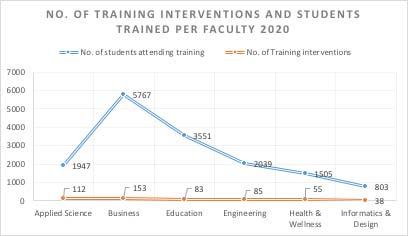
Students from various departments were invited to complete the information literacy assessment on Blackboard which would contribute towards their year marks for a selected subject. Marks for assessment were recorded for 113 classes across all faculties. During the lockdown the Information Literacy course was translated into Afrikaans and Xhosa and would be accessible to students in 2021.
Library staff were capacitated to provide online services through the provision of laptops and data to provide services through the Ask Us online service. Students were able to request information resources they need to complete their assignments and prepare for assessment. 2 125 queries were processed while librarians were working remotely.
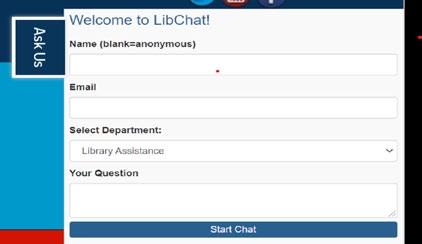

The library makes available information resources available 24/7. Students were able to use the library without having to visit the library physically.

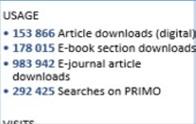
Although less training was done than in 2019, library staff adjusted to working online and continued to support students with information literacy and other training courses.
The goal of CPUT’s SMART Internationalisation is to develop a multicultural community by building capacity in T&L, RTI and CE for students and staff as global citizens in preparation of a global world through enhancing our preparedness for the world of work by means of improving the quality of education in support of Vision 2030.
Strategic international partnerships

Prof Rene Pellisier
Internationalisation/globalisation is a common thread that runs throughout CPUT’s activities. To remain relevant in the ever-changing world of 4IR, CPUT has incorporated a comprehensive theme of internationalisation (internationalisation at home, abroad and of the curriculum). Based on this prescription in the government’s framework policy on internationalisation for higher education, CPUT is focussed on the international arena (visiting delegations, visiting partners, exchange students, international academic staff, visiting researchers, capacity development opportunities, joint degrees). International Partnership Agreements and Memorandums of Understanding went ahead as normal, albeit via an online platform in 2020. All exchange mobility activities ceased on 26 March 2020 (official government lockdown of South Africa).
In 2020, a strategic Partnership was initiated between the Embassy of Finland, the University of Oulu and CPUT to establish cooperation between CPUT’s six
focus areas and six of Oulu Universities’ faculties, and one institute. In addition to the interest in establishing cooperation within the research focus areas listed above, there was interest in student placements (including PhD) and staff placements (including teaching practice), mobility and exchanges.



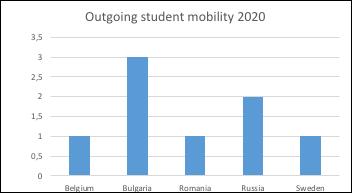
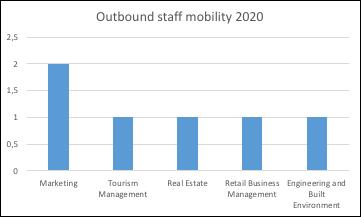
While activities centre around research, there is great potential for T&L activities involving postgraduate students. The following are existing projects:
YEBO!
The Yebo! programme was due to end September 2020 but due to Covid-19, the project was extended to 2021 with the funder’s approval. The final conference was held from 12-14 April 2021 and hosted by the University of Pretoria. The Research Connect contract in the project is still active until 2022.
University Capacity Development Programme (UCDP)
CPUT, together with the University of the Witwatersrand as lead partner, University of Limpopo, Stellenbosch University, University of Western Cape and Loughborough University as UK technical partner, responded to the
call for application for Phase 2 of the UCDP which focuses on collaboration between South African universities and universities in the United Kingdom in support of doctoral training for university academic staff exploring various models of doctoral training. This unique six university consortium will foster the development of a cohort of ten interdisciplinary next generation researchers to obtain doctoral degrees, and benefit from the quality and breadth of experience necessary to support the conduct of original and innovative research related to ‘Health, Wellness, Sport and Exercise’ across South Africa.
The project funds will support meritorious staff at South African universities (with students recruited from each South African University from health sciences and/or engineering disciplines) to register for joint doctoral degrees with Loughborough University (LU). They will be afforded international mobility opportunities and conduct research for a minimum of one year at LU.
This project aligns to the University Capacity Development Programme goals in the following ways: (i) It will accelerate the number of academic staff who hold doctorates. Selection of high flyer candidates will ensure they become influential drivers of new knowledge production within the higher education science and innovation system. (ii) It will contribute to addressing transformation imperatives in higher education in South Africa. We have established a selection committee which will ensure that the selected candidates are at least 80% black and 50% female. (iii) The project has maximised the funding available to enable economies of scale. All participating institutions have committed additional funding to ensure the success of this initiative. (iv) We have agreed to an equal partnership and a commitment to mutual benefit for all parties involved. This consortium is unique, in that it is the first time that the five South African universities will work together on one project and in strong partnership with LU.
Each university partner will be equally responsible and accountable for the successful completion of the PhD candidates, and participate in supervisory capacity, whether providing more experienced senior or junior/novice supervisors. This aims to promote collaboration and entrench the SA-SA and SA-UK partnerships beyond the life of the project. Overall, successful implementation and completion of the project will contribute to achieving the UNDP Sustainable Development Goals 1 to 5, 8 and 10.
The South Africa-Sweden University Forum (SASUF) is a strategic internationalisation project running from 2017-2020 with the aim of strengthening partnerships between 37 Universities in South Africa and Sweden in research, education and innovation. This collaboration includes embassies, civil society organisations, funding agencies and ministries in both countries. SASUF has a budget of 22 000 000 SEK and is funded by STINT (Swedish Foundation for International Cooperation in Research and Higher Education), the participating universities, the National Research Foundation and the Department of Higher Education & Training in South Africa. From 2017, CPUT’s participation in SASUF has resulted in our researchers engaging with research from other partner universities, hosting and participating in seminars, benefiting in funding for research projects, and student and staff mobility. This platform has been crucial in enabling our researchers to connect with other researchers, ministries and funding agencies working towards the SDGs. However, Covid-19 presented some challenges and changed project plans. The last seminar should have been hosted in Uppsala in May 2020 but due to Covid-19, the online option was used. SASUF Goes Digital had more than 65 workshops involving the 6 themes of SASUF: Climate Change, Education, Social Transformation, Health, Sustainable Urbanisation and Big Data. Additionally, 10 student-led workshops brought together the SASUF Student Network to connect hundreds of students from both South Africa and Sweden who are interested and dedicated to continued collaborations between our two countries.
Research Chairs take on board undergraduate and postgraduate students.
Strategic partnerships:
1. Partner member or node of the DSI-NRF Centre of Excellence in Mathematical and Statistical Sciences (CoE-MaSS) at the University of the Witwatersrand.
2. Partner member or node of the DSI-NRF Centre of Excellence Human Development at the University of the Witwatersrand .
3. Possible strategic partnerships with the University of Oulu in Finland. The work of the research chair is at a high level and in support of the CPUT research focus areas and the research work (honours, master’s and doctorate supervision, capacity building and research outputs) currently conducted in the faculties, research entities and across CPUT. The following Research Chairs teach honours and masters students: Prof Janet Condy and Prof Tariq Kahn.
4.1 Student Counselling
4.2 Disability Unit
4.3 HIV/Aids Unit



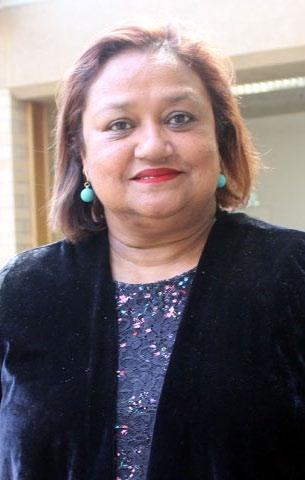
4
Ms Prem Coopoo Dean of Students

The COVID pandemic and lockdown brought with it unique student engagement challenges for support departments. Before the pandemic the Student Counselling Department created visibility through campus exhibitions, stalls, signage and classroom-based activities with student groups. Unlike academic departments which have direct access to and communication with registered student groups, Student Counselling had to work hard at promoting and marketing their services online during 2020. Lockdown made Student Counselling offices inaccessible and it was very challenging overall to reach students. The department however responded to the challenge with resolve, and implemented tele-therapy/online counselling to make this service accessible to students anywhere. The department successfully moved all its programmes online and was able to continue to support students’ mental health and well-being during lockdown.
The Counselling and Therapy programme is a core service offered to registered CPUT students by professional psychologists and social workers. Before 2020, counselling and therapy were provided through in-person contact sessions with students on campus. In-person counselling sessions are typically an hour in duration, with multiple sessions scheduled per day with various clients. With the advent of the pandemic and lockdown, traditional counselling methods were not suitable as this posed a high risk of infection for both staff and students. Prolonged contact and the inability to physically distance in various office spaces posed a challenge.
The department proceeded to establish an online counselling email line to which students could email their counselling requests. Student Counselling initiated tele-therapeutic or online counselling services to students,
were counselling was provided to students through various conferencing and communication channels. These included Zoom, Skype, MS Teams, WhatsApp chats, calls, video calls, and email communication. Student Counselling aspired to be truly student centred by accommodating various counselling methods to be accessible to all students during this challenging time.

The CPUT email counselling line, along with after-hours support resources, were communicated to CPUT through different channels to reach the student and staff population who were in lockdown and at home. The marketing strategy included all official CPUT platforms (Newsflash, CPUT website banners, e-learning platform Blackboard), social media platforms (Facebook, Instagram, YouTube), Support Services liaison and direct communication with academic departments and communication to high profile student groups (SRC, mentors, peer educators, coordinators). Initially uptake of online counselling was slow and attendance numbers low. With the re-uptake of the academic programme during lockdown and with the continued marketing and promotion of the new online counselling support line, uptake of counselling services increased monthly. The provision of online counselling is now fully embedded into the service portfolio of the department.
The provision of online counselling was not without challenge as the country remained in lockdown and staff worked remotely. Various challenges affected the delivery of online counselling which mostly included broader socioeconomic and systemic factors which fell outside of the control of the department. These included access to data and devices, load shedding and electricity disruptions, network and connectivity problems, lack of privacy due to lockdown and accommodation type, and students’ commitment to therapy due to the flexible nature of online counselling.
Two psychosocial support groups were launched in 2020, in response to the impact of the pandemic, national lockdown and remote learning challenges.
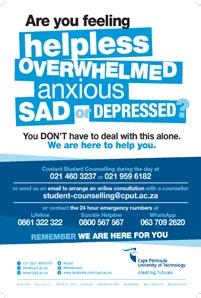


The online support groups hosted through Blackboard collaborate ultra, titled, ‘Lockdown Warriors – adjusting to remote learning’ and ‘Coping with COVID-19- peer support for students infected or affected by COVID-19’ ran between August and November 2020.
These platforms created the opportunity for students who were isolated and overwhelmed to find support from their peers with the guidance of a counsellor. Students could engage in a confidential and supportive manner, having the opportunity to relate to peers and integrate into university life.
Various personal and academic development activities were facilitated during 2020. The aim of these activities were to create mental health awareness and
promote healthy coping and adjustment during Covid-19 and lockdown through multiple engagement opportunities.
Through our wellness programme the department focussed on mental health topics such as depression and suicide, substance, coping and adjustment. A combination of workshops, webinars, self-learning and psychoeducational materials, and social media segments were utilized to advocate for wellness and mental health.
Through our career preparedness programmes the department focussed on job search skills and interview preparation, to assist students to successfully look for employment and present themselves professionally during an interview.
Our academic development themes focussed on adjusting to remote learning, maintaining motivation for independent learning and exam preparation.
The following is a summary of online activities that were facilitated in 2020.
Depression and suicide explained 6 August 2020

Unlocking conversations on GBV (webinarhosted in partnership with Department of Student Affairs)
August 2020

Importance of self-care, exercise and preventative measures during COVID

Know your product
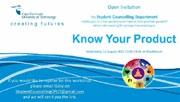
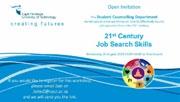

Lockdown learning –m mastering your method 20 August 2020

Job interview preparation 9 September 2020
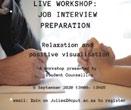
How to be well while Covid is around 10 September 2020

Understanding mental illness – depression and suicide in the midst of the pandemic 16 September 2020

Overcoming COVID – Power up, positive thinking mind-set
17 September 2020

Preparing for a job interview 21 September 2020

The importance of high selfesteem and ways to build it
27 October 2020

Dangers of unhealthy coping during COVID-19 6 November 2020






Student Counselling focussed strongly on resources development in order to make credible mental health and wellness information accessible to students. Students continually noted data, device, connectivity and electricity challenges along with lack of privacy, which made it difficult for them to participate in scheduled activities. The department’s resource drive and marketing strategy assisted greatly in extending its student reach. YouTube, Facebook, Blackboard, Newsflash and communication to high impact student groups were amongst the preferred methods of communication for distribution of resources and activities.
The content of workshops/webinars were narrated into videos, which were distributed as online resources. Student Counselling created a portal on Blackboard in 2019 with the aim of creating a resource portal for students to access mental health information. With the pandemic the department could expand on their resources on the portal and use this as a platform for students to access information.
Multiple bulk emails on selected topics were sent out through the portal to the entire CPUT student population, which included information on depression, suicide, academic development skills, and marketing of the counselling line.
Mental health and students narrated video
https://www.youtube.com/ watch?v=ggmLiFGVB7w
Suicide prevention and awareness narrated video
https://www.youtube.com/ watch?v=DSyXUP--Pjw
Anxiety explained narrated video
https://www.youtube.com/ watch?v=u-gV2zzoiHI
Lockdown motivational video
https://www.youtube.com/ watch?v=5oOkin2Y4rw
Progressive muscle relaxation video
https://www.youtube.com/ watch?v=Yg5Q3-gb504
Positive visualisation and relaxation video
https://www.youtube.com/ watch?v=9KnBcACHuEI
Chair relaxation video
https://www.youtube.com/ watch?v=6rNVOJEYixE
Procrastination video
https://www.youtube.com/ watch?v=B-76K_uQnpQ
Student Counselling assisted the COVID task team with a COVID fear and stigma awareness project. The project ran from August to December 2020.
The aim of the project was to create awareness around COVID-19 fear and stigma and provide psychoeducation material and resources to students and staff, to normalise fear responses and address how this should be dealt with in a healthy manner. Ultimately, the aim was to curb stigmatising responses towards those who had been exposed to or had direct experiences related to COVID-19.
Four posters and three information circulars were developed for distribution. Poetry club winners from the Division Student Affairs Arts and Culture Department, and peer educators from the HIV unit, partnered with Student Counselling on the final content for the circulars, through writing poems and sharing personal experiences on the topics below. Short segments of these were included in the final CPUT stories.




Student Counselling’s response to the impact of the pandemic was one of initiative and determination to ensure that the department supports students’ mental health and adjustment to remote learning and the pandemic.
The co-curricular activities offered by the department in 2020 were diverse and offered multiple opportunities for students to participate and engage online.
The challenges that hindered student participation were met with resolve and the department extended its reach by focusing on resources development and social media awareness.
The availability of online counselling support and the comprehensive resource and media presence allowed students to access counselling support and credible mental health information during a very difficult time with limited resources. During 2021 the department will continue to develop resources and focus on continued marketing and media presence to share information on wellness and mental health.
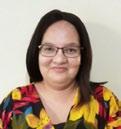
The purpose of this report is provide an overview of the teaching and learning activities, initiatives, interventions and achievements that occurred within the Disability Unit during 2020. The following sections are covered: (i) Orientation; (ii) Support for students; (iii) Outreach and marketing to potential students with disabilities; (iv) Covid-19 information; (v) Engagement with faculties and departments on reasonable accommodation for students with disabilities; (vi) Support for lecturers working with students with disabilities; (vii) Online informational videos; (viii) Mentor training; (ix) Advocacy; and (x) Research and development. The report concludes with a section on the DU’s highlights for 2020.
During 2 February–March 2020, the DU conducted face to face orientation sessions across all campuses and faculties. During such sessions the DU responded to students questions regarding disability issues. Face to face sessions were set aside in March due to the Covid-19 pandemic. The DU then produced online materials and recordings which were shared with students continuously. This was in line with Covid-19 policy and procedures.
The DU has a laboratory and resource centre with software and assistive
devices that ensures that students with disabilities are fully included in teaching and learning initiatives. The DU regularly conducted assessments with students with disabilities which allowed for early identification of students at risk. Appropriate interventions and referrals were planned based on the needs and circumstances of each student. Assessment concession applications for students with disabilities occurred across faculties.
The DU also assisted and supported students with NSFAS enquiries as well as with CPUT’s applications and registrations process. The DU also shared other funding opportunities with students with disabilities based on its availability.
During Covid-19 lockdown the DU had daily engagements with students with disabilities on various platforms which included WhatsApp, Facebook, email and telephone. The DU conducted follow-up sessions with students with disabilities and regularly checked in with them. This was done in order for them to feel supported and to encourage them to excel in their studies.
In addition, the staff of the DU supported students with disabilities during online lectures. A real time data capturer assisted students with hearing impairments and those who struggled to take notes. Some of the dates for this purpose were: 5–6 June 2020, 12–13 June, 19–20 June, 26–27 June, 3–4 July, 10–11 July, 17–18 July, 24–25 July, 22 August, 4–5 September, 11–12 September, 18–19 September and 26 September 2020. Students with disabilities are in the part time classes as well and therefore the services extend after hours as well. The DU assisted in arranging tutors for students with disabilities as well.
A noteworthy highlight regarding support to a student with disability occurred
during 9–11 November 2020: A DU staff member attended and assisted a blind Paralegal student with LexisNexis practical training. LexisNexis is a leading global provider of content-enabled workflow solutions designed specifically for professionals in the legal, risk management, corporate, government, law enforcement, accounting and academic markets.
Outreach and marketing to potential students with disabilities
As part of an outreach initiative the DU had online communications with potential students with disabilities who made enquiries regarding pursuing their future studies at CPUT. The DU staff comprehensively engaged with such potential students. This is an ongoing initiative in our endeavor to increase the number of eligible students with disabilities at CPUT.
Information
The Disability Unit and its laboratories were equipped with the necessary personal protective equipment (PPE) which includes social distancing measures, desk screens, posters and sanitizers. During March –December 2020, information around Covid-19, success stories of persons with disabilities as well as notices around important events hosted by different departments, faculties and units within CPUT were shared on the DU’s social media platforms.
Engagement with faculties and departments on reasonable accommodation for students with disabilities
The DU had multiple consultations across faculties to sensitise staff around the needs of students with disabilities and to explore and implement reasonable accommodations that enhances the teaching and learning of students with disabilities.


Noteworthy highlights regarding this:

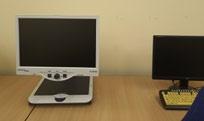
• 7 February 2020: A workshop was held with a student who was blind and the Applied Legal Studies department. Interventions were designed that suited the faculty and the student.
• 10 February 2020: Meeting with the Faculty of Education, Deaf Federation South Africa (DEAFSA) and a student who was deaf. Interventions were designed that suited the faculty and the student.
Information was converted into appropriate formats for students with disabilities on a daily basis. The DU laboratory was used as a separate venue for students who required it during assessments and tests.
During July–November 2020 the DU recruited a videographer to assist with producing online videos. Students with disabilities were foregrounded in the videos. Their purpose was educational and motivational. It covered topics such as assistive devices, universal design for learning, and coping strategies for students with disabilities.
The DU facilitated multiple sessions in Fundani’s mentor training programme. The purpose of these sessions was to provide awareness around disability issues, as well as to provide information around universal access and design for learning. Mentors were also provided with information and skills that could assist them to engage with students with disabilities. The DU had such sessions on 26 June 2020, 10 July 2020 and 16 September 2020.
Staff members of the DU participate in various institutional committees, clusters and forums and represent the needs, challenges and achievements of students with disabilities on all levels and platforms.
Staff members of the DU participate in research and development platforms, most notably the HEDSA (Higher Education Disability Association) platform and regularly contributes to research initiatives as well as sharing of best practices. Staff of the DU constantly attend workshops and training to stay abreast of developments within the field. The DU periodically produces and shares brochures, pamphlets and information around disability issues.
The DU received additional financial support from the Michael & Susan Dell foundation. This assisted the DU with situational and wellness support to students with disabilities amidst the Covid-19 pandemic. Additionally, lecturers were equipped with pedagogical considerations for universal access and universal design for learning. New CPUT students with disabilities were successfully orientated and were empowered with relevant information. Videos and workshops were also accessible to all students with disabilities. Students with disabilities were able to fully participate in online and multimodal learning without any barriers and this increased retention and pass rates amongst students with disabilities.
The DU will continue to empower and support students with disabilities to reach their full potential in an inclusive academic environment.
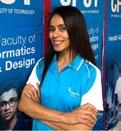
HOD: HIV/Aids Unit

VIRTUAL IMPLEMENTATION OF PEER EDUCATION PROGRAMME
01 MARCH – 30 SEPTEMBER 2021
The HIV Unit has a strong focus on developing peer educators to be strong student leaders across campuses and residences at Cape Peninsula University of Technology (CPUT). Every year, peer educators are trained to become change agents in raising awareness on holistic health, wellness and social justice. They disseminate accurate information to their peers in such a way that their peers will share further. Through participation in peer education programme, skills such as time management, critical thinking, planning, project management, facilitating and communication are nurtured among peer educators to enhance personal development and job opportunities. Collaborative work with internal and external stakeholders remains important in the implementation of peer education programme. This report reflects on the progress made by HIV Unit peer education programme in accomplishing the
HIV Unit Peer Education Officer
purposes of the Michael and Susan Dell Foundation (MSDF) Grant during the period March – September 2021. Achievements and key outcomes represent the impact made. In addition, lesson learnt, challenges, recommendations and a way forward are included.
It is important to highlight that in February 2021, 94 CPUT students were recruited and trained to voluntarily serve as peer educators. To date 80 peer educators are active in the programme and 14 left due to various personal reasons. The achievements below are based on the peer-peer activities conducted by 80 peer educators.
A total of 80 peer educators received monthly data to continue implementing peer education programme virtual. Through ongoing virtual trainings, mentoring and coaching from HIV Unit staff, peer educators learned to use Microsoft Teams and WhatsApp to facilitate peer-peer discussion groups. They also
learned to create short educational videos. In turn peer educators, arranged and facilitated various interactive educational activities on HIV/STIs/TB, COVID-19, sexual and reproductive health, unplanned pregnancy, gender-based violence, alcohol and substance abuse prevention, diverse sexual orientation, mental health and disability sensitisation. Below are peer education activities and number of participants reached.
Peer educators created educational videos to support virtual peer-peer discussion groups. The videos focused on promoting risk reduction messages and educated students about (i) HIV/STIs/unplanned pregnancy prevention (ii) responsible love in relation to healthy relationships. Peer educators further shared posters with contact details of mental health and gender-based violence support during peer-peer discussion groups.
Peer educators arranged and facilitated 35 virtual peer-peer discussion groups that reached 1413 CPUT students via WhatsApp. Out of 35 virtual peer-peer discussion groups, 16 were in a form of series 1-4, and the remaining were once off. Below are breakdown of totals and topics covered.
First years risk reduction: Series 1-4 reached 305 students. Topics included be empowered with skills and knowledge to resist peer pressure: say no to peer pressure, HIV/STIs/unplanned pregnancy-#Prevention#SafetyFirst, healthy vs unhealthy relationships, all you need to know about sexual and reproductive health.
Alcohol and drug use/abuse awareness: Series 1-4 reached 219 students. Topics included understanding alcohol and drug use as addiction, effect of alcohol and drug use/abuse on personal health, when is enough, enough, when to seek help.
Gender-based violence awareness: Series 1-4 reached 229 students. Topics included silence hides violence, articulating the types of gender-based violence, healthy vs unhealthy relationships, link between gender-based violence and HIV.
Safe Zone: Series 1-4 reached 136 students. Topics covered included HIV/STIs/
unplanned pregnancy prevention, disability sensitisation, zero discrimination against diverse sexual orientation, mental health-where to seek help.
Once-off virtual peer-peer discussion groups reached 524 students. Topics covered were HIV/STIs-#Let’s be safe, unplanned pregnancy prevention, peer pressure, gender-based violence awareness and prevention, genderbased violence in South Africa-people with disability, an interactive talk on can bullying be experienced at varsity, relationships vs students, love out loudlove with respect, mental health-don’t suffer silence, mental health awareness, sexual and gender diversity, zero discrimination against people with disability, promoting healthy environment-let’s save the future: eco-friendly measures to keep our campuses and communities clean.
Some comments from participants during virtual peer-peer discussion groups:
“Positive peer pressure, for example, a friend may encourage you to study hard on the second semester so that you can boost your marks and be able to obtain 50% or more at the end of the year…. Negative peer pressure is when your friends encourage you to party till late, despite you writing a test the following day or when they encourage you to do drugs and have sugar daddies” (Participant, during first year risk reduction series)
“Thank you, guys, it is really important to teach people about dangers of substance abuse and alcohol to make them aware of the dangers and the impact it will have on their health” (Participant during alcohol and drug use/abuse awareness series).
“So peers the tip is that if your partner is jealous, it takes a turn towards abuse, talk to someone right away! Break the silence…Tell a friend, family member or a trusted adult...Ending an abusive and unhealthy relationship can be a dangerous and scary… if it keeps on happening and such toxic jealous behaviours are not coming to an end... Leave the relationship right away” (Participant, during gender-based violence awareness series).
“Bullying is unacceptable and if someone by any chance is bullied, don’t let a bully ruin the varsity experience for you. We know it’s easier said than done but at the end of the day your years as a student should create the fondest memories… To get help, please contact our student counselling department” (Participant, during can bullying be experienced at varsity discussion group).
“I want to say to you guys, charity begins here, we need to make our voices heard by the individuals who hold authority in our respective places of occupation, standing up for yourself does not need to be loud and cause scene… Peaceful movements and standing your ground make people respect you and start TREATING you like a person you are… Unity doesn’t take nothing from you, we can have Pride days, we can have gatherings like others, let us not stand at the back and expect people to make things easy for us, let us go out there and make a united noise and we don’t need to be heard but we want/ need to be understood and felt, respected, treated like human beings we are... Where you be bold and make sure you are felt as the person you are” (Participant, during-zero discrimination against diverse sexual orientation discussion group).
As indicated earlier, peer educators reached 1413 and have surpassed the target of reaching 800 participants (10 participants per peer educator).
The outcomes of the peer-peer discussion groups were:
• Education and awareness on holistic health, wellness and social justice were raised among CPUT students through series of peer-peer discussions groups.
• HIV Unit services including others within Division of Student Affairs (DSA) were raised, including contact details and emails of how to access support services. Students got to be aware of mental health and gender-based violence support.
• Personal and leadership development of students were enhanced through peer-peer learning.
• Planning, presentation, facilitation skills and time management were developed among peer educators.
• Creating digital posters to do marketing were developed among peer educators
• Use of digital platforms e.g., WhatsApp to plan and facilitate peer-peer discussion groups were strengthened among peer educators.
Four (4) webinars were planned and hosted as part of MSDF milestones. Three webinars via Microsoft Teams took place on different Saturdays and one in the evening during the week. Peer educators were involved in planning, recruiting of participants, directing the programme and facilitating during all webinars.
#SafeZone #Equalityforall campaign
At the beginning of March, peer educators began #SafeZone #Equalityforall campaign by sharing a Safe Zone poster to 651 CPUT students via WhatsApp. This was a build up to a 3-hour webinar aimed at commemorating Human Rights Day and creating an interactive platform where participants could dialogue on the topic of human rights.
#SafeZone #Equalityforall webinar
#Safe Zone #Equalityforall webinar took place on 20 March 2021. The purpose of the webinar was two-fold, firstly to have an interactive talk about why we need an inclusive university. Secondly to promote zero discrimination against people with disability, zero discrimination against diverse sexual orientation, zero discrimination against people with HIV, zero discrimination against mental health and zero discrimination against survivors of gender-based violence. Peer educators under mentorship from HIV Unit staff members reached 116 participants during this 3-hour interactive dialogue. The participants were student
leaders from various student leadership structures, staff members from Division of Student Affairs and academic departments. Two speakers delivered keynote address focusing on why we need an inclusive university (keynote speaker from CPUT), Gender Inclusivity and Reconciliation within the Higher Education Sector (guest speaker from UWC). Peer educators created an educational video based on Safe Zone themes and was played during the webinar.
At the beginning of April, a peer educator created an educational video on Sisterhood support. Peer educators shared a video to 116 CPUT students via WhatsApp.
Peer Educators under minimal mentorship from HIV Unit staff members planned and conducted a 2-hour interactive discussion webinar on 24 April 2021. The session was lined up with live inspirational poems and keynote address focusing on building confidence in young women. A total of 39 participants attended, and collectively unpacked issues affecting young women. Furthermore, a member of Student Representative Council and a young keynote speaker who is a Pilot student encouraged young women to believe in themselves and be the change they want to see - … “positive change and achieve their dreams” as nothing can stop them. Ideas on how young women can empower themselves were shared by participants and keynote speakers.
This 3-hour interactive webinar took place on 08 May 2021 and focused on both educational aspects and key issues related to substance use and abuse. The purpose was to expose students to information pertaining to alcohol and drug use/abuse that can lead to better health outcomes and ultimately influence students to reduce alcohol and drug use/abuse. A total of 107 participants comprising of students, staff members and guests attended and were educated on the following themes:
• Theme 1: Substance abuse at higher education institutions: Ms Motshabi Nkoane, Social Work Policy Manager for Substance Abuse, National Department of Social Development.
• Theme 2: Dangers of alcohol and drug use/abuse: Personal experiences: Mr Jerry Mboweni, Certified Life Coach, Drug Counsellor & Author, Health and Life Coaching
• Theme 3: Social crime prevention: Ms Ditebogo Manana, Social Work Policy Manager for Social Crime Prevention, National Department of Social Development.
• Theme 4: GBV/VEP by Ms Gogie Itumeleng: Specialists for GBV/VEP National Department of Social Development.
The key common messages taken from all presenters were that substance abuse does affect students at higher education institutions as campuses mirror what transpire in families and communities. Furthermore, alcohol and drug abuse are health concerns that are likely to result in serious health, social and academic problems. It is very important to acknowledge that students are facing many challenges, and some are common, for instance at times they are home sick, isolated and may feel lonely. This can lead them to start abusing alcohol and substances. It is therefore all our mandate to develop programmes aim at reducing the demands and harm cause by substance abuse and advocate for free substance abuse institutions.
Lessons were taken from Mr Mboweni’s real life experiences of had been a drug addict at an early age and his road to recovery as he has been 17 years clean.
“My road to recovery began by admitting that I have a problem of drug abuse” (Mr Mboweni). He reiterated that once you admit, it is important to believe that there is greater power in yourself that you can restore your life. “Once you admit and believe you will be able to be on the road to recovery” (Mr Mboweni).
The webinar concluded with a one and half hour dialogue in conjunction with questions and answers directed to 7 Panel Member (4 presenters mentioned earlier & 3 colleagues from CPUT)
• Ms Nonkosi Tyolwana: CPUT Transformation Unit
• Mr Chumani Mashwanyela: CPUT Residence Department
• Mr Kwena Mapuma, CPUT student & current peer educator
In summary the educational message to students was “Don’t hang up your education and dreams, Rather hang the bottle and drugs”. An encouraging message and recommendation for all post-schooling institutions is that:
“There is a hope that we can have an alcohol free university, but if we implement holistic continuous interventions that address behavioural change and social norms, and those interventions should address drivers of this alcohol abuse…In a nutshell our programmes should not be alcohol stand alone, or GBV as standlone but should be a holistic approach because these social crimes are results of underlying factors… In our programme orientation we should be raising awareness and education, saying in our next weapon we should involve Department of Women, Youth and People with Disabilities” (Panel member).
Joint Young Women Empowerment & Amajita’s Men’s Programme webinar
This 2 hour joint interactive Young Women Empowerment & Amajita’s Men’s Programme webinar took place on 27 July 2021 and focused on personal development. The purpose was to share knowledge and ideas on how students can enhance personal development through holistic learning inside and outside classroom. A total of 75 participants attended and interacted with panel members (tutor from Student Learning Unit, Amajita’s Men’s Programme ambassador, peer educator and former peer educator). Knowledge and ideas on getting involved in student development programmes, advantages of internship programmes, starting a non-profit organisation/foundation were shared. Keynote speaker encouraged students to develop themselves through student development programmes and internships. In addition, she reiterated the importance of education and striving for best.
Peer education refresher training: Planning for peer education activities in second semester
A total of 40 peer educators attended the training. Peer education officer facilitated a session on planning for peer education activities in second semester. Peer educators successfully developed a feasible plan for discussion groups and other peer-peer activities.
In 2020, peer educators were trained by 2 professional trainers from CPUT Center for Innovation Educational Technologies. The aim of the training was to empower peer educators with skills and knowledge of creating online CVs to display evidence of activities they conducted during their participation in peer education programme, academic qualifications and other work experiences to enhance job opportunities. The outcome of the training was the development of E-portfolio development resources and are available on Blackboard for peer educators.
Two senior peer educators who presented their E-portfolios in 2020 were appointed to serve as E-portfolio development tutors in year 2021. They successfully mentored new peer educators using the resources. In turn, peer educators used the resources during their free time and developed E-portfolios.
Four peer educators presented their completed E-portfolios during the presentation session held in 24 July 2021.


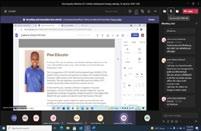



A virtual award ceremony will be hosted on 22 October 2021, to reward peer educators for their outstanding voluntary work. Peer educators will receive Certificate of Participation. Seven (7) Special Awards, from position 1-5 will be awarded in the following Award Categories: Junior Peer Educator of the Year, Senior Peer Educator of the Year, Change Agent of the Year, Role model of the Year, Peer Mentor of the Year, Condom Distributor of the Year, COVID-19 Warrior of the Year, Best Performing Campus: Certificate (for all peer educators of the winning campus).
A recruitment process of 2022 peer educators commenced with sharing of application poster on 01 August 2021. The closing date for application was 30
September 2021. The process of reading through CVs and motivation letters of 90 applicants is completed, and the telephone interviews are currently conducted by peer education officer.
COVID-19 awareness video
A peer educator created a COVID-19 educational video raising awareness and prevention measures to curb the spread of COVID-19 third wave. Eight peer educators shared a COVID-19 video on social media platforms and via WhatsApp to 9811 people (CPUT students, family and friends). Breakdown of totals per mode of sharing are as follows:
• Instagram: 2074
• Facebook: 4913
• WhatsApp: 1448
• HIV Unit Facebook reached: 1100
• HIV Unit Facebook views: 276
Peer educational video content on Facebook
• Know how to wear & dispose of a condom: 312 views
• What is Responsible Love: 80 views
• Safezone, Equality & Inclusivity for all in Higher Education: 311 views
• Gender-based violence awareness: 119 views
CPUT HIV Unit Facebook page
• 3031 likes
• 3105 followers
• 9088 engagements
• 133 642 reaches in 7 months
Young Women Empowerment Programme Facebook page
• 840 likes
• 849 followers
Amajita’s Men’s Programme Facebook page
• 345 likes
• 353 followers
CPUT HIV Unit - Instagram
• 194 followers
• 975 accounts reached in last 90 days
• 872 content interactions in last 90 days
Key peer education activities were successfully conducted virtual and mostly educated students on holistic health, wellness and social justice issues. In addition, skills deemed to enhance job opportunities were strengthened among peer educators. Major highlights of virtual implementation of 2021 peer education programme are:
• Virtual implementation of peer education programme that supported learning, development and wellness of students
• Collaborative student development webinars
• Peer-peer discussion groups via WhatsApp
• Engagements through HIV Unit social media platforms
• Peer educators and students learned to use various online learning platforms
• Continuation of collaborative work with other CPUT departments e.g., Student Counselling, Center for Innovation Educational Technologies, Fundani Center-Student Learning Unit
• A total of 80 peer educators who are still in the programme
• E-portfolio development resources available on Blackboard for peer educators and will be continuously used each year
• Training of peer educators on E-portfolio development to assist them in enhancing job opportunities. In turn, trained peer educators becoming E-portfolio training tutors and trained other peer educators
• Four peer educators trained by 2 tutors presented their completed E-portfolios during a presentation day
• Development of research proposal and currently under review for
ethics approval. Title: Use of WhatsApp application to implement HIV awareness programmes: Lessons for peer-led discussion groups at a selected higher education institution in South Africa
• Participants not providing required details for attendance registers: Although we used short Goggle forms and also requested participants to send the required details privately to the facilitators, most participants still did not provide information for attendance registers (monitoring purposes).
• Presence of peer education officer as a silent observer during virtual peer-peer discussion groups via WhatsApp enables to uphold integrity and quality of monitoring data for attendance registers.
• The project has shown us the strength of collaboration which contributed to improving holistic learning and development of CPUT students.
In order to reach large number of CPUT students, peer educators should be trained on digital marketing.
Building up from the virtual implementation of peer education programme, our future plans are to continue strengthen blended implementation approach
of peer education interventions to ensure that responses to HIV, genderbased violence and other related issues form part of a more encompassing holistic health and wellness strategy and approach that serve the entire CPUT community including development of students. The 2022 planned activities of peer education programme are underway and ongoing through strengths and lessons learnt from the virtual implementation, ongoing monitoring and evaluation in 2021.
The CPUT HIV Unit would like to thank:
• Michael and Susan Dell Foundation for a funding opportunity to continue implementing peer education programme virtual.
• The CPUT Coordinators and Administrative team involved in Michael and Susan Dell Foundation project for their continuous support during the planning and implementation of virtual peer education programme.


+27
info@cput.ac.za
@cput
@wearecput
www.cput.ac.za
www.facebook.com/cput.ac.za